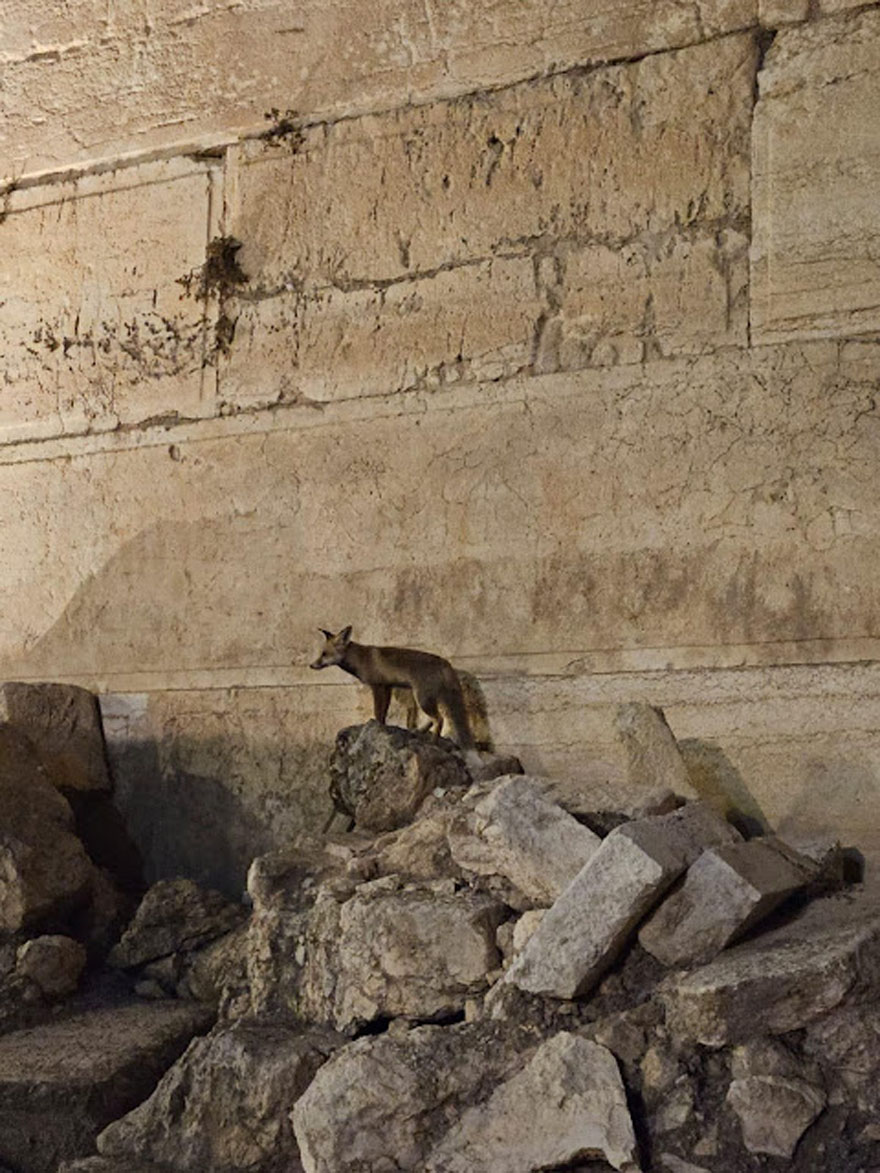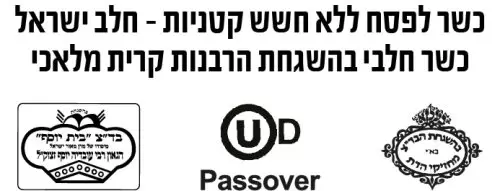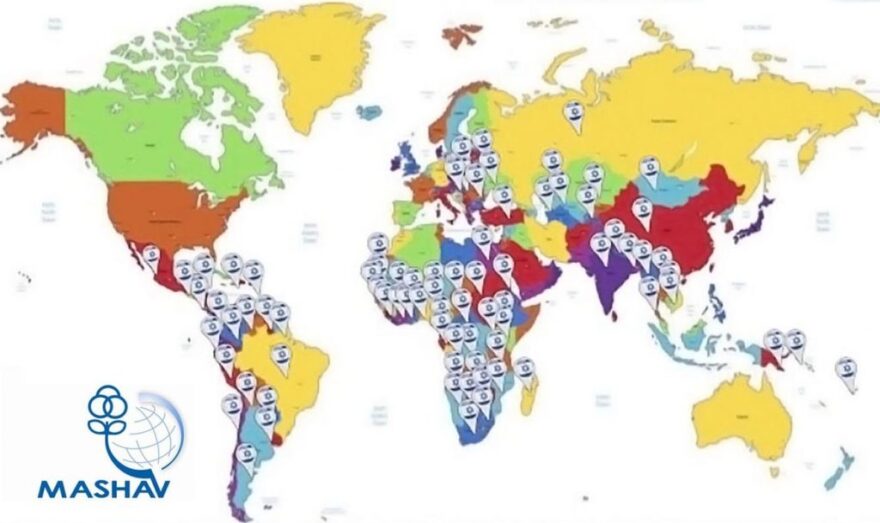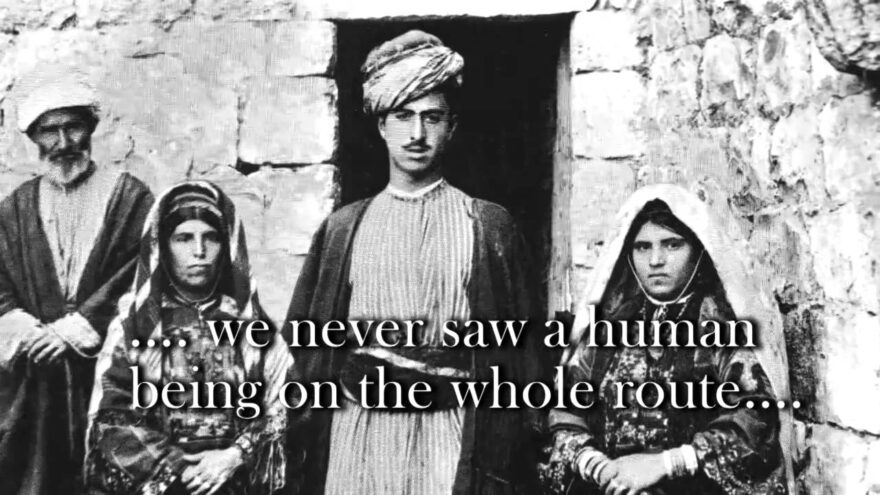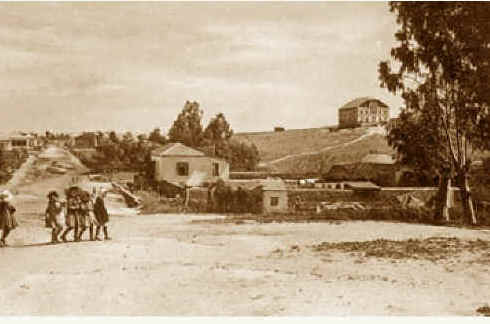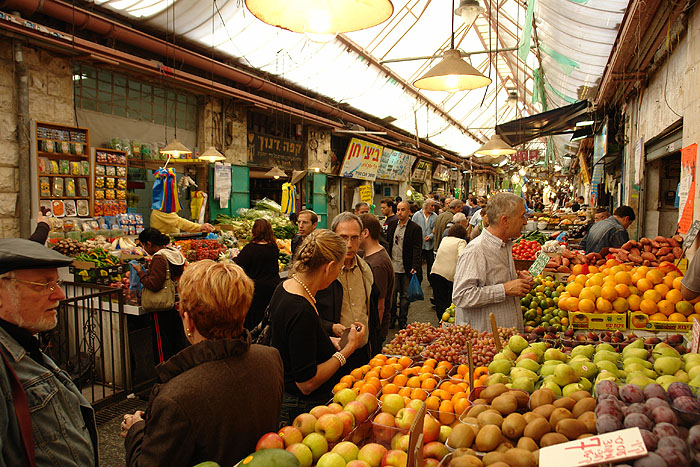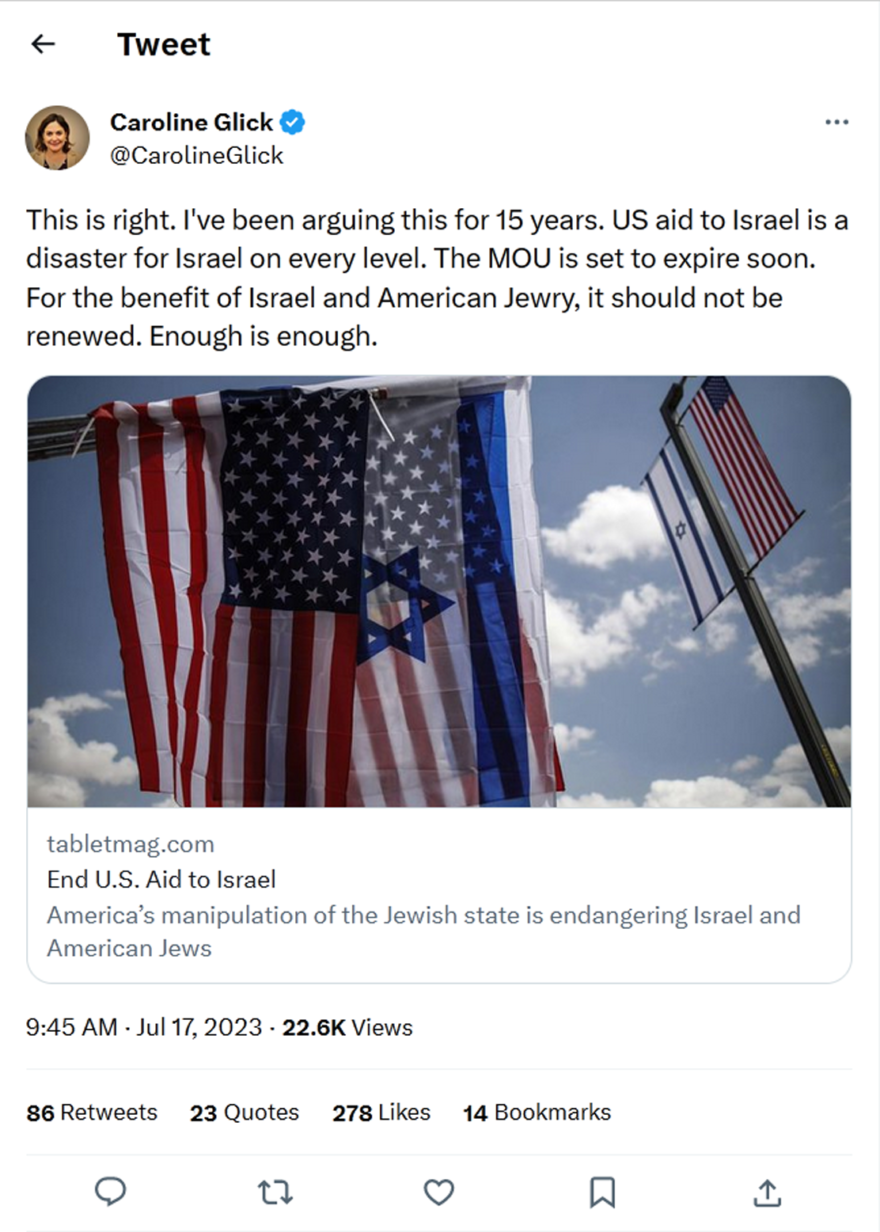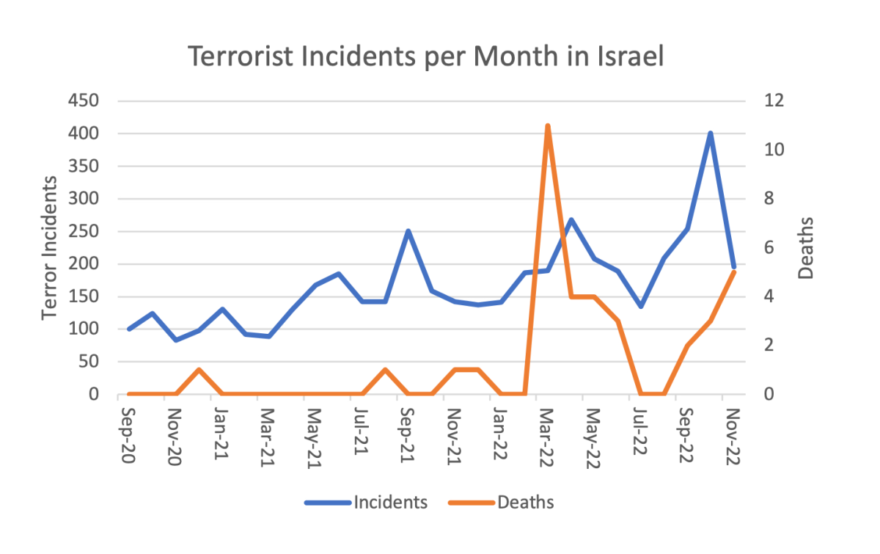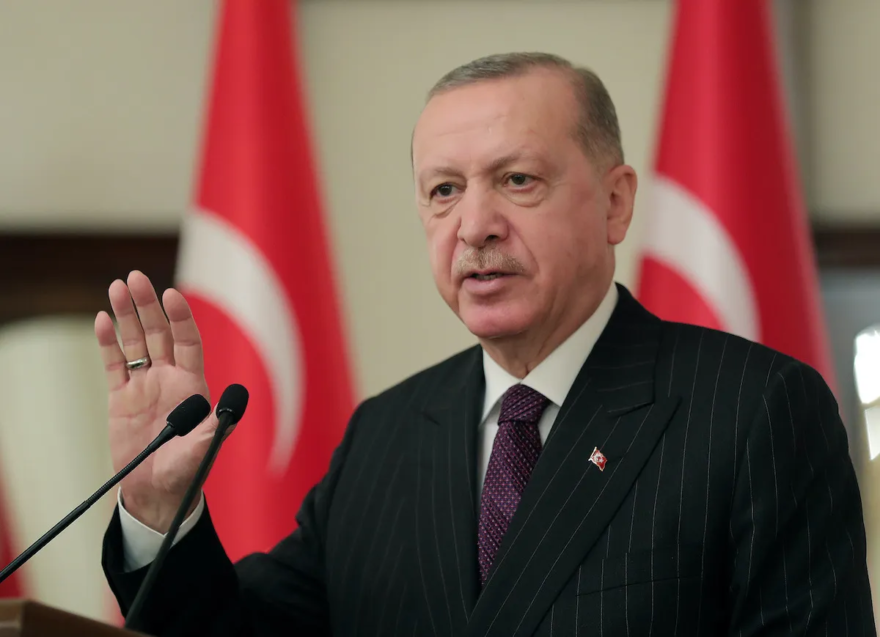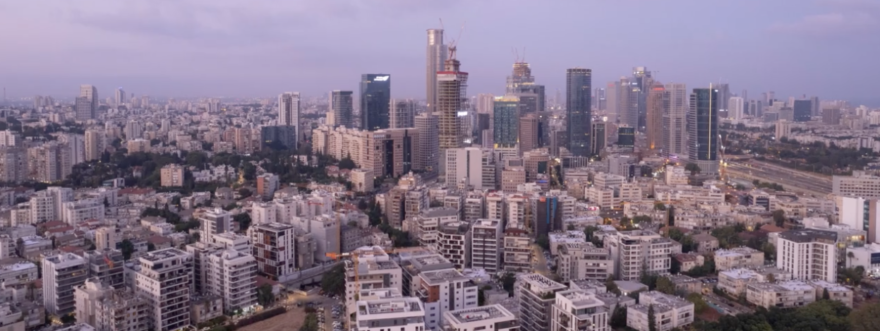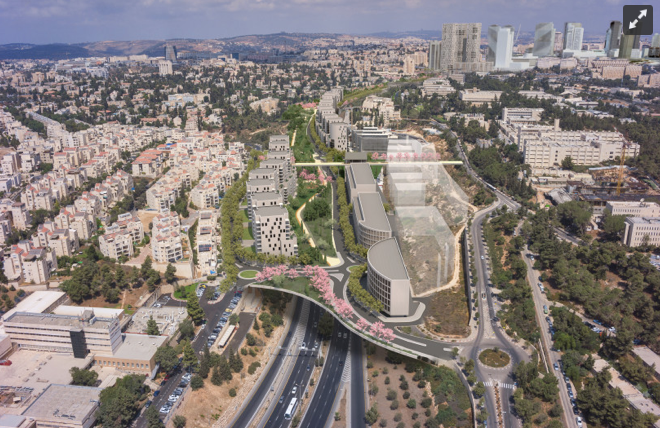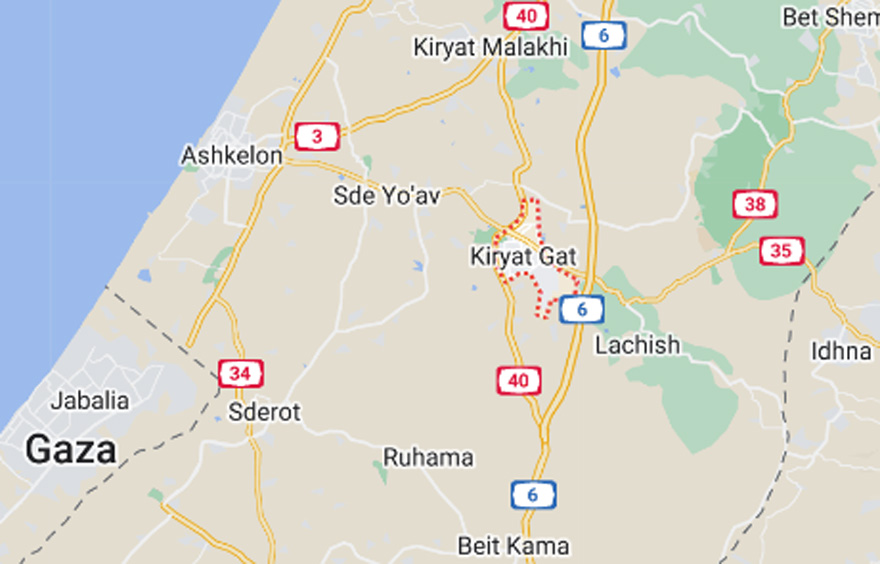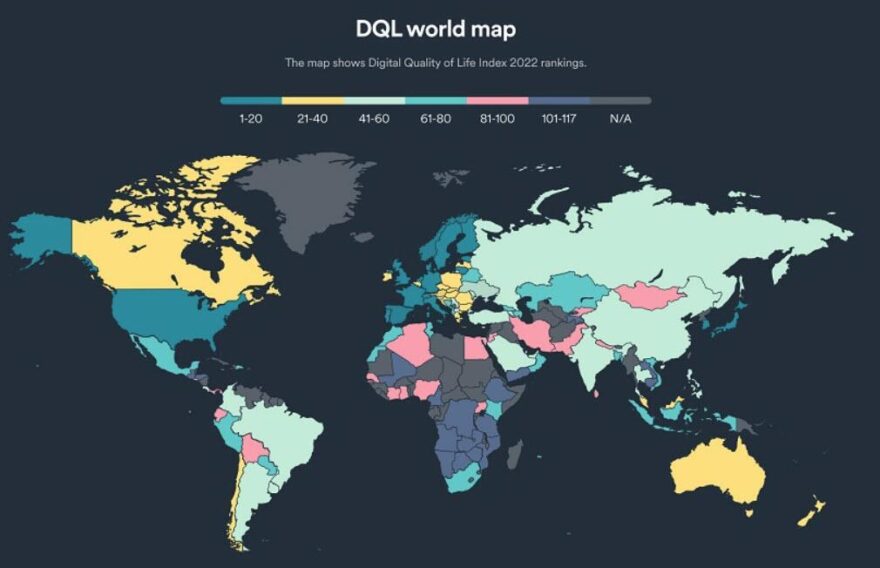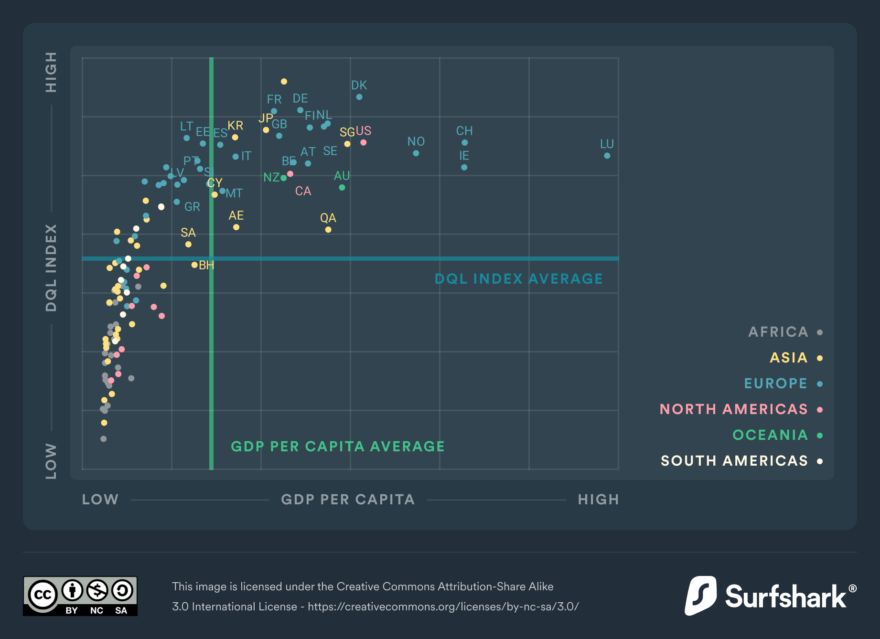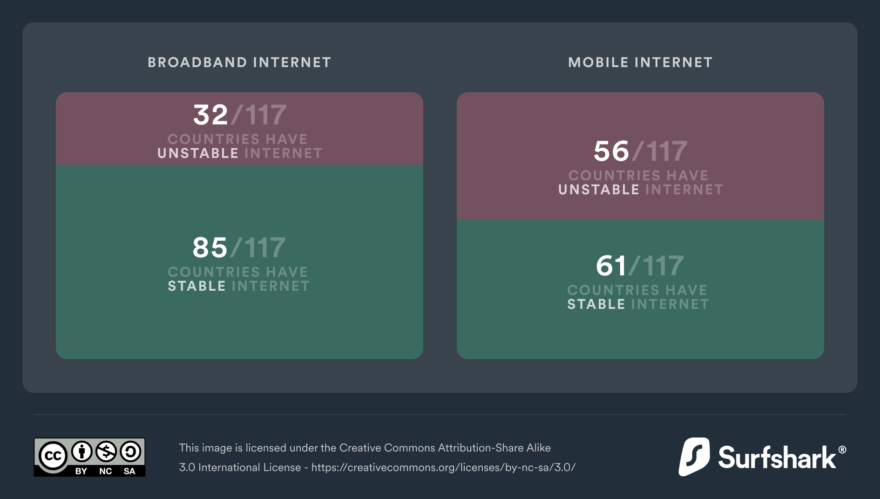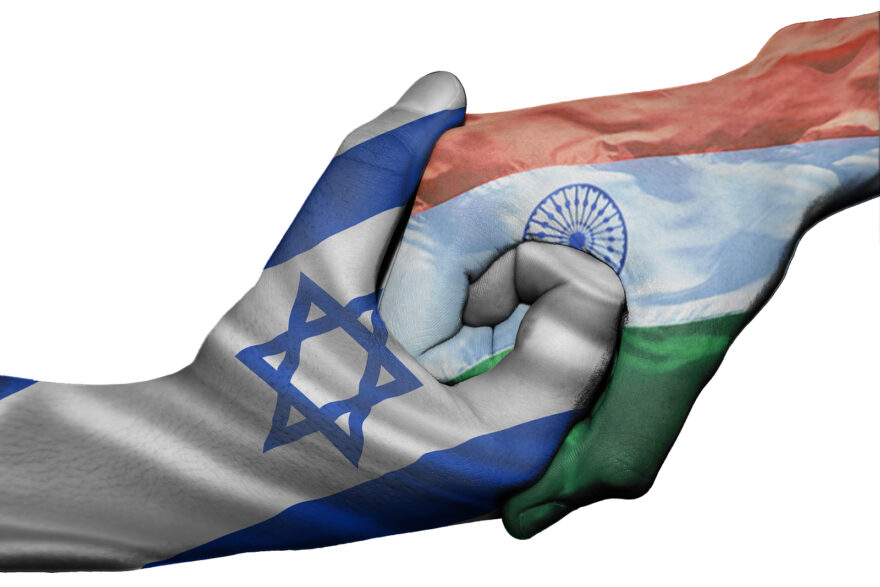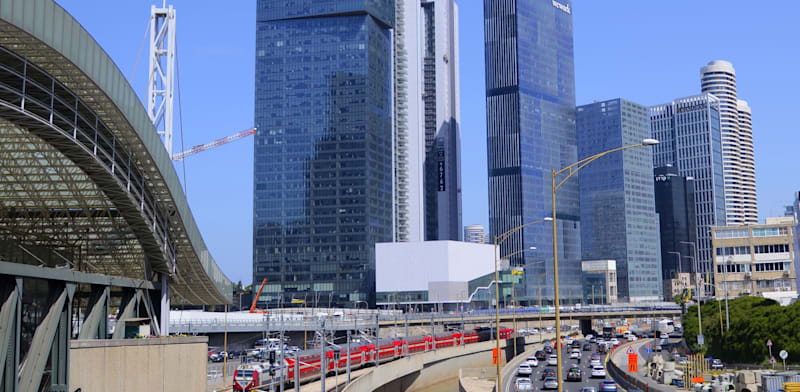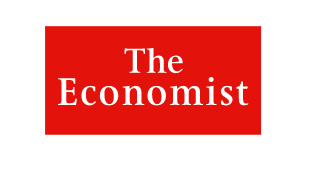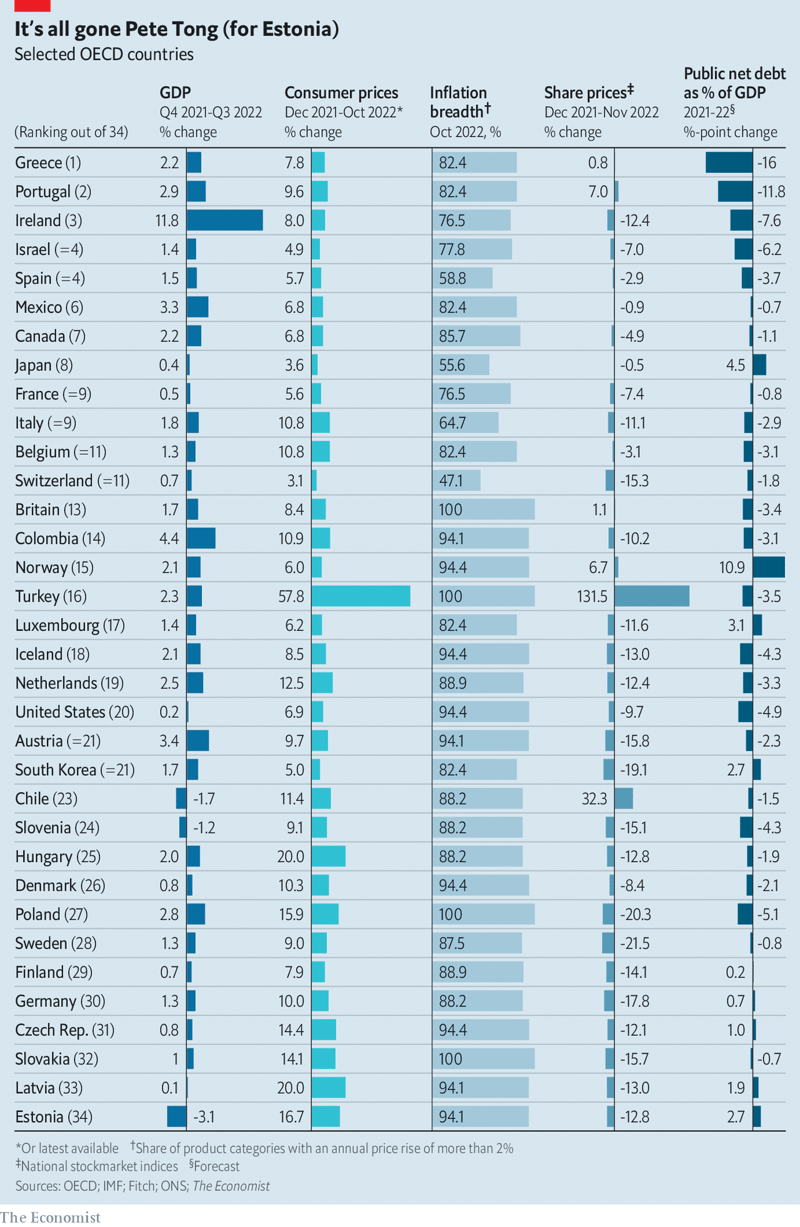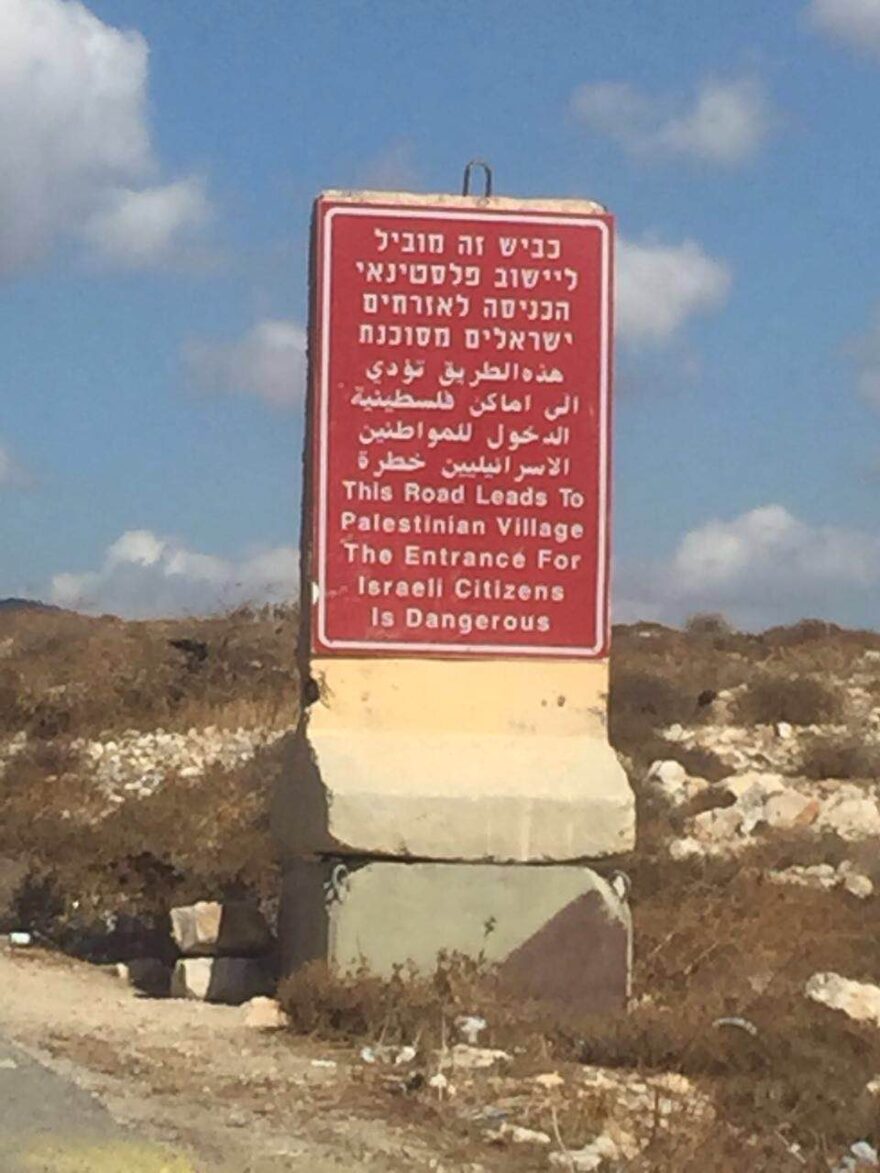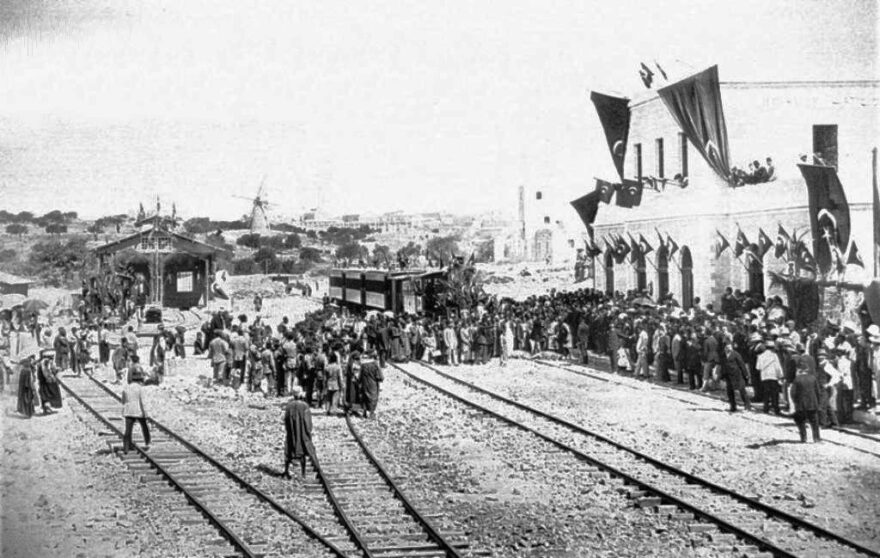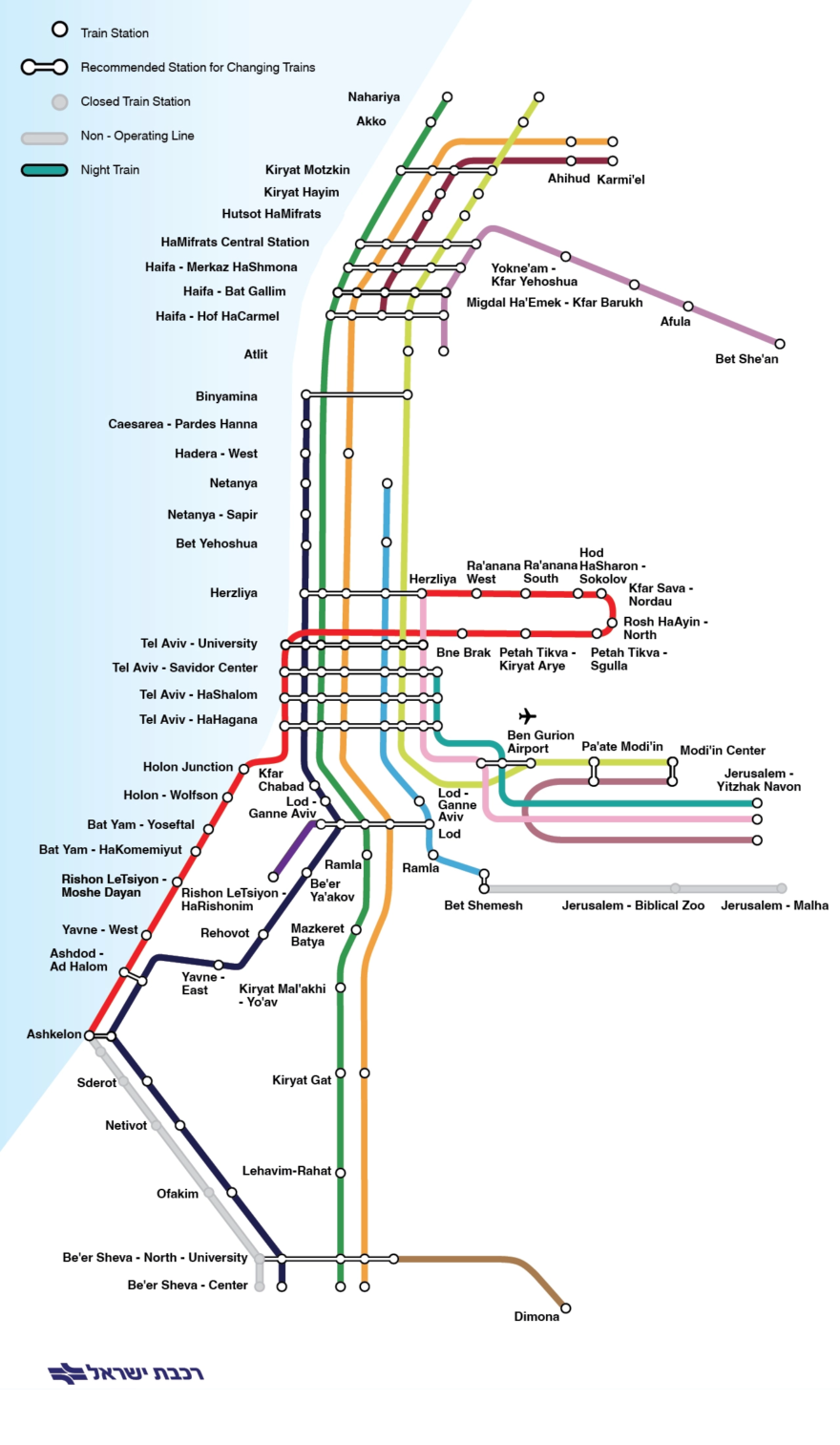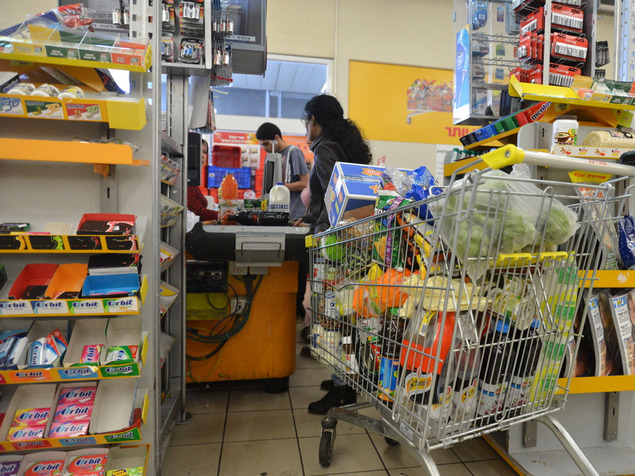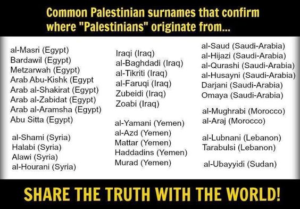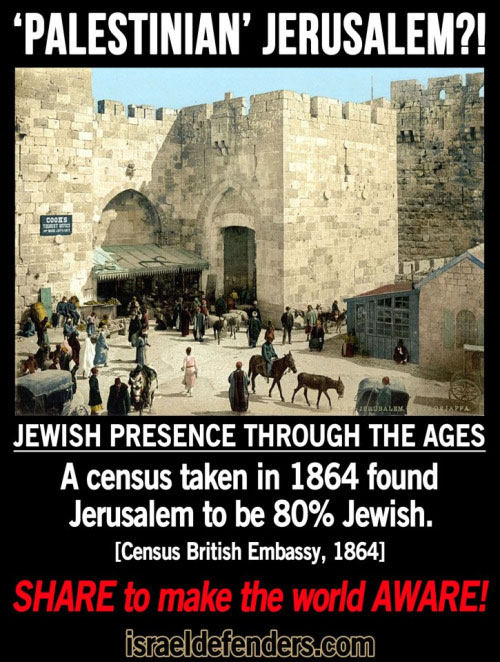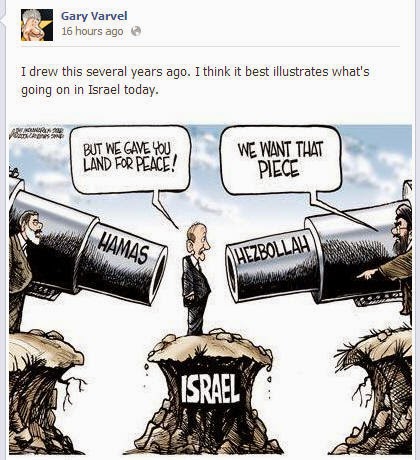|
|
“It may be dangerous to be America’s enemy, but to be America’s friend is fatal.”– Henry KissingerAsk the Afghans, ask the Kurds. Ask the Israelis. Ask the Germans. Ask Ghadaffy. Ask the Ukrainians. |
|

After bleating a path to Israel, Jacob’s sheep frolic in new homeWith flock’s 5,000-year exile and difficult quarantine beset by rains behind them, biblical sheep are baaaack in the Holy LandBy Melanie Lidman and Video by Luke Tress 1 February 2017, 7:10 pm https://www.timesofisrael.com/after-bleating-a-path-to-israel-jacobs-sheep-frolic-in-new-home/ After baa-liyah, Jacob’s sheep frolick in new homeNES HARIM — Every new immigrant to Israel faces many challenges making a new life in the Holy Land. The 118 Jacob’s sheep, the first livestock to immigrate to Israel for religious reasons, are no different.
Gil and Jenna Lewinsky have spent the past three years fighting to make aliyah to Israel with their herd of Jacob’s sheep, a breed whose genetics trace it back to the Middle East some 5,000 years ago. The sheep are characterized by “spots and speckles,” the kind of sheep that Jacob took from Laban in Genesis, Chapter 30.
After a three-year-long journey that required top-level political negotiations between the Israeli Embassy and the Canadian Embassy, a road trip across Canada, $80,000 worth of flights to airlift the herd from Toronto to Tel Aviv, and a harrowing quarantine, the sheep are finally frolicking in their pasture in the Beit Shemesh suburb of Nes Harim.
As with all new immigrants, the first issue to address was the housing quandary. For the sheep, this was a quarantine imposed by the Ministry of Rural Development and Agriculture. The wettest December in decades pelted the sheep with cold rain relentlessly, as their makeshift stables collapsed from heavy rain. Over 40 sheep got sick and five sheep died due to the difficult conditions. The Agricultural Ministry eventually allowed the Lewinskys to leave quarantine two days early to move to their new home in Nes Harim, ahead of another winter storm. They found the rental farm in Nes Harim through a farmers WhatsApp group.  The origins of the Jacob’s sheep date back to the Middle East 5,000 years ago, but until last December they hadn’t been in Israel for millennia. This sheep, pictured on January 15, 2017, is adapting well to the transition. (Luke Tress/Times of Israel)
Now, as the sun shines over the Jerusalem mountains, the sheep playfully butt heads with each other and sniff at visitors’ pockets for treats, the difficult journey seemingly forgotten.
“When we first got out of the desert [quarantine], everything was so overwhelming it didn’t sink in that we were really in Israel,” said Jenna Lewinsky. “The next day we walked in the Judean Hills, from here you can see all the way to Tel Aviv and Jerusalem and even Gaza. We felt that we saw the footprint of God’s miracle. Every day when I wake up it feels like we’re living the dream,” she said.
That’s partly because their bedroom window looks into the barn, so sheep impatient for their breakfast act as an alarm clock by bumping the glass with their nose and baa-ing pitifully until someone gets up to feed them.
“There is a mystical bond between the Jewish people and these sheep, they bring so much joy to everyone who visits,” said Gil Lewinsky. Gil Lewinsky sometimes reads parts of the Torah to his flock, kneeling down among the ovines and making sure no curious onlookers try to nibble pages of the holy books.  Jacob’s sheep can have a maximum of six horns each, though four, like the one pictured here on January 15, 2017, is more common. (Luke Tress/Times of Israel)
“This is the national flock of Israel, and the work has just started,” said Gil Lewinsky. “Our connection to these sheep goes back to the beginning of our faith.”
The next step in the immigration process was the identity card, or for the sheep, a red tag in their ears. The Lewinskys decided not to remove the Canadian yellow tags, allowing the sheep to keep their Canadian “passports.”
Eventually, all new immigrants need to join the workforce, and the sheep are no exception. The Lewinskys plan to turn the farm into an ecological heritage park and educational farm, which could open as early as March. They will offer “sheep trekking” with special sheep harnesses ordered from America, so visitors can choose their favorite sheep and go for a stroll in the stony Jerusalem hills that surround the farm, with stunning vistas and deep wadis. In the spring, Jenna Lewinsky, who completed a sheep-shearing course in Canada, will give the sheep haircuts. Future plans include possibly weaving tallits from the sheep’s wool. Until they open to visitors, the Lewinskys are subsisting on donations.
New immigrants to Israel often struggle with adapting to the culture of their new home. But here is where the sheep, who don’t seem to be having any difficulty becoming culturally Israeli, diverge from their human counterparts. “Israelis that come to visit say they know they’re Israeli sheep because they don’t stand in line,” said Jenna Lewinsky. “Every sheep has its own idea of what it wants to do; each one is its own boss.”  Jacob’s sheep – Gil and Jenna Lewinsky plan to open an ecological heritage park and educational farm where visitors can choose to take their favorite sheep for a stroll, like this one pictured on January 15, 2017. (Luke Tress/Times of Israel)
The sheep also seem to be adapting to the food. During the quarantine, Jenna left a bowl of hummus on the table and stepped away for a moment. When she came back, the hummus was gone. Abraham, one of the original patriarchs of the flock, had a bit of suspicious hummus stuck to his wool.
The Lewinskys were never concerned that Abraham, whose magnificent horns and friendly demeanor make him an instant visitor favorite, would adapt to Israel. When the Lewinskys were still in Abbotsford, Western Canada, a volunteer who was considering donating came to visit the flock. She immediately connected with Abraham and knelt down to pet him under his chin, the “sweet spot” for sheep. Abraham, sensing the opportunity, tilted his head to the side, stuck his horn into her purse and deftly removed, among other things, her checkbook. She ended up making a donation. And after an exile that lasted more than 5,000 years, the Jacob’s sheep ended up back in Israel. 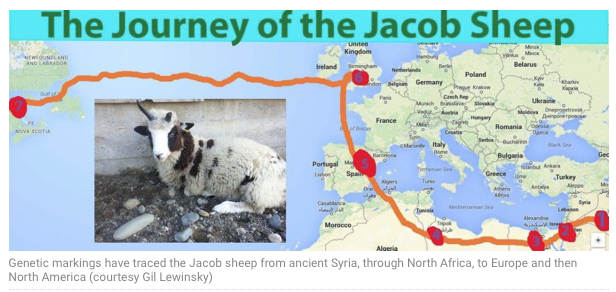 Journey of Jacob’s Sheep – Map
 Gil and Jenna Lewinsky on their new rental farm in Nes Harim, outside of Beit Shemesh, on January 15, 2017. (Melanie Lidman/Times of Israel)
 The Lewinskys hope to eventually use the sheep’s wool to make clothing or tallit. Shearing is in the spring for this sheep, pictured in Nes Harim on January 15, 2017. (Melanie Lidman/Times of Israel)
 Jenna Lewinsky feeds grains to the Jacobs sheep on January 15, 2017. (Melanie Lidman/Times of Israel)
 All of the sheep have individual personalities and quirks, says Jenna Lewinsky, pictured here on January 15, 2017. (Melanie Lidman/Times of Israel)
|
|

A Sign: Fox on Temple Mount28July2023 https://shiratdevorah.blogspot.com/2023/07/a-sign-fox-on-temple-mount.html
Last night [Tisha b’Av] in Jerusalem, a fox was spotted wandering among the rocks. On the solemn day of Tishabav, which commemorates the destruction of the Temple, we recall a story from the Talmud of Makkos. In this tale, a group of Rabbis visited Jerusalem to witness the ruins of the Temple. As they stood on the Temple Mount, they saw a fox emerging from the very place where the Holy of Holies once stood. This sight intensified their sadness, but Rabbi Akiva responded with laughter. Confused by his reaction, the other Rabbis asked Rabbi Akiva why he was laughing amidst their grief. He explained that their tears were fulfilling two prophecies. Uriah had predicted the destruction of Jerusalem and the Temple, which led to the area being inhabited by foxes. On the other hand, Zechariah had prophesied a future where people would return to Jerusalem and live there peacefully. Rabbi Akiva believed that since Uriah’s prophecy had come true (seeing the fox), it meant that Zechariah’s prophecy would also come true (people living peacefully in Jerusalem). Therefore, their tears of sorrow were actually bringing hope for a better future. The other Rabbis found comfort in Rabbi Akiva’s explanation and thanked him for his wise words. Source: Sholom Rochela Rodal |
|

Israel is 5th safest country in the world for tourists – studyThe United States is ranked 20th on this list, earning an overall safety grade of C-, primarily because of a high homicide rate and the high risk of natural disasters.By HERB KEINON  A man wearing a hat during a hot sunny summer day walks near the Tower of David in Jerusalem Old City on June 23, 2022. Violence and the prospect of an untimely death, it seems, are all around us.
Turn on the television news and you’ll hear about an attempted car ramming or a stabbing attack. Tune in to the radio and you’ll hear about a man clobbered with a motorcycle helmet in a road rage incident. Open up the newspaper and you’ll read about extortion and “protection” rings operating in the South.
Not to mention horrific reports of car accidents, polio outbreaks, and salmonella in Sabra hummus. It’s enough to make you shout out the title of that 1961 musical: “Stop the world – I want to get off.”
Surrounded by a drumbeat of negative news in this country, a recent survey on the least and most safe travel destinations around the world, by a US insurance comparison website called The Swiftest may come as a jaw-dropping surprise.
According to this study, Israel is the fifth safest [EDD: Source: See Below] among the 50 countries in the world most widely visited by tourists. No, you didn’t read that wrong. The fifth safest, not the fifth most unsafe country to visit. And here you thought that all those studies and surveys that consistently place Israel among the top 10 happiest countries in the world were counterintuitive? If we kvetch so much, one might ask, how can we be happy? Yet study after study, year after year, shows that we are; that in terms of happiness, we are right up there with New Zealand and a bevy of Northern European countries that are the happiest in the world. Who would have thought? And now this – Israel is the fifth safest travel destination for tourists.Turns out that the question that many first-time visitors to Israel are asked by friends and relatives when they reveal their plans to visit – “Are you sure it’s safe?” – is misplaced. Not only is it safe, but it is very safe; safer, in fact, than visiting the US (ranked 30), Canada (21), Australia (18), France (15) and the United Kingdom (10).
True, presumptive national security minister Itamar Ben-Gvir may have done so well in the last elections because he ran on a law-and-order ticket that resonated among a population feeling increasingly insecure and unsafe. But according to The Swiftest study, Israel – at least in comparison with other countries – is safer than most.
The study – based on data culled from reports put out by numerous organizations such as the UN Office on Drugs and Crime, the World Health Organization, the World Bank, Our World in Data and the WorldRiskReport – came up with a “travel safety index” based on several per capita criteria: the number of homicide deaths, road traffic deaths, unintentional poisoning deaths, death from poor hygiene conditions, life years lost due to communicable disease, life years lost due to injury and a country’s likelihood to be hit by a natural disaster. Death or injury as a result of acts of terror, it is assumed, falls under either the homicide or life years lost to injury categories.
Israel’s overall safety index was -60.22, giving it a grade of A. Only Switzerland, the Netherlands, Denmark and Singapore were considered safer, with the last two countries earning an A+ grade.
Singapore, the study says, is “the least deadly country for tourists. With a very low homicide rate, road death rate and natural disaster risk, Singapore is an excellent choice for travelers regarding safety. What makes Singapore so safe? Well, crime does not pay in Singapore. The consequences for committing crimes in Singapore are incredibly high, even for ‘smaller crimes.’ This, combined with high surveillance and police presence, makes Singapore the world’s safest country for travel.”
And the least safe countries to visit? South Africa – by a wide margin, mainly because of its homicide rate of 36.4 murdered for every 100,000 people. According to the report, about 68 people are murdered every day in this country of 60 million.
India followed South Africa as the second deadliest destination for tourists – not because of homicide, but rather because of deaths caused by poor hygiene conditions (18.6 per 100,000), years lost to communicable diseases, and the risk of natural disasters.
The United States is ranked 20th on this list, earning an overall safety grade of C-, primarily because of a high homicide rate (5 for every 100,000 people) and the high risk of natural disasters.
In the homicide category, Israel received a B grade, with 1.5 murders for every 100,000 people. The only other B it received was regarding natural disasters and the country’s ability to deal with them, where it received a B+ score.
In all the other categories, Israel received an A. For instance, its incidence of road accident deaths (3.9 people per 100,000) is low compared to other parts of the world: 30.6 in Vietnam, 12.7 in the US, 9.4 in Poland, and 8.3 in Greece.
Israel has no instances of unintentional poisoning and a negligible number of deaths caused by poor hygiene conditions. Likewise, the number of years lost to communicable diseases and years lost to injury for various reasons – from poorly maintained hiking paths to interpersonal violence and traffic accidents – is also low compared to most other countries in the survey.
And there’s the rub. We feel things are awful in terms of crime, violence and car accidents because we are exposed to it hour after hour in the media. What we are not exposed to are the incidences of crime, violence and car accidents in other countries around the globe. If we would be, we might feel better about how things are here.
If things are so good, goes an age-old question, why do I feel so bad? In the case of overall safety, the reason is that we are not comparing our situation here with that in most other countries. When we do, our situation doesn’t look as bad as it so often feels. |
|

Is Israel really a safe country?An examination of police statistics, comparison with other countries, and local opinions show how secure Israelis truly are.By ROMAN MEITAV Walking down the streets of Jerusalem, one could be inclined to feel uneasy, with police officers on almost every corner and armed security guards at every government office or bank. But should this make us feel uneasy?
It is somewhat “common knowledge” that Israel is unsafe, at least when asking tourists or expats visiting Israel, but most Israelis don’t necessarily share that sentiment.
So is Israel safe or not?Examining police statistics could help answer this question. One particular statistic that police departments use worldwide is crime per 1,000 citizens, which helps make clearer comparisons between regions or countries with sometimes massive differences in population.
In 2020, Israel had a standing rate of 30.4 crimes recorded per 1,000 citizens, including anything from petty theft to outright murder. That might sound like a lot, but how does it compare to other Western countries?
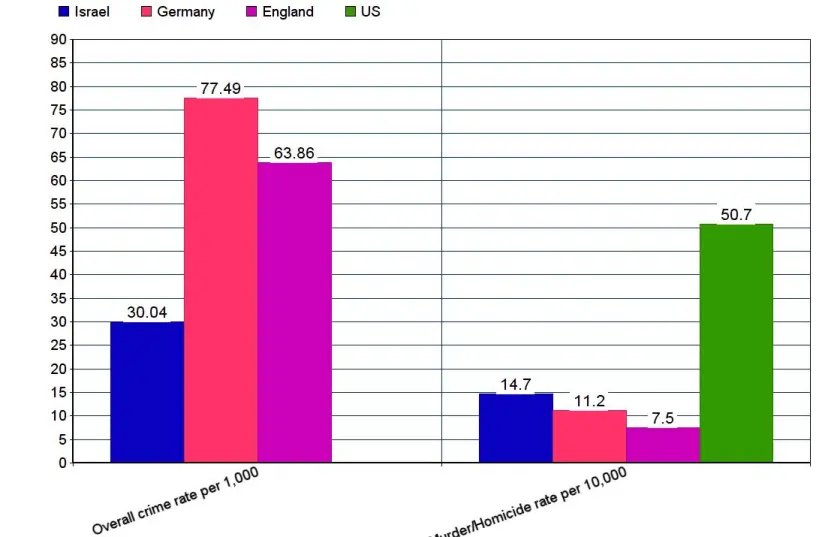 Israel crime rate comparison, using official statistics from the countries mentioned. (credit: Roman Meitav) In England, for example, the same statistic from 2020 was 77.5 crimes per 1,000 citizens, and Germany had 63.8. Compared with countries such as these that are not thought to be as dangerous, Israel seems to actually be much safer.
Overall crime rates, however, may not accurately convey a projected feeling of safety. A rise in white-collar crime or computer offenses, for example, will likely have no real effect on how safe one feels on the street.
What is the murder rate in Israel?A HIGH murder rate could be a better, more specific indication of how safe a country is. In Israel, the rate of murder/homicide in 2019 was 1.47 per 100,000 civilians. The US had a rate of 5.07, more than triple the amount.
European countries have much lower rates, however, with England standing at 1.12 murders per 100,000, Germany with 0.75, and Spain with 0.71. So when compared with European countries, Israel’s rate is more than double in some cases, which could indeed be a cause for concern.
For comparison, South American countries have numbers that could put Israeli statistics in perspective. Mexico had a whopping 26.6 murders per 100,000 citizens in 2019, followed closely by Brazil with 23.6.
Although the calculated number of murders per capita is indeed higher in Israel than in some European countries, this could be affected by several unique factors, such as a high murder rate in the Arab-Israeli sector and terror attacks, an issue European countries don’t have to deal with as much.
In 2019, seven people were murdered as a result of what the Defense Ministry defined as “terrorist attacks,” which would bring down the per-100,000 statistic by a mere 0.06 if excluded, hardly making a noticeable difference.
MURDER IN Israel is heavily represented by Arab society. According to police data, since the beginning of the year, 62 people have been murdered in Arab society countrywide. The police have solved only 12 murder cases in the sector so far this year.
Manar Hajjaj, 34, and one of her twin daughters, 14-year-old Hadra, were recently murdered in their car in Lod, in the latest crime-related Arab-sector killings.
They were shot dead under the residential building where they lived after returning from shopping at the supermarket, according to police reports. The girl’s twin sister, Miriam, was taken to Shamir Medical Center in moderate condition.
In another murder case, Nidal Aghbariya, an Arab journalist who ran the Bldtna news site, was shot in his car in Umm al-Fahm just a day earlier.
Although the situation looks grim, the police claim that the high number of murders in Arab society has decreased compared to the same time last year, when it stood at 67.
But the NGO Avraham Initiatives, which tracks cases of violence and murder in Arab society, claims that the actual number of murder victims so far in 2022 is 75. If this is true, it shows an alarming 12% increase from last year.
When compared to non-Arab victims, murders in Arab society make up about three-fourths of all murders in recent years, a very high percentage ranging between 73% and 78%, numbers calculated based on reports by Israel’s Central Bureau of Statistics.
The police attribute this decrease in the number of murders in the sector when compared to last year – from 67 to 62, according to their data – to Operation Safe Route, which set out to combat the high crime rate in Arab society.
Police have achieved impressive achievements so far. They have foiled at least 39 assassination attempts in the Arab sector alone since the operation began, police spokesman Eli Levi told the Magazine, along with the seizure of 65,000 various firearms, munitions and armaments.
A total of 2,787 arrests have been made so far in Arab society alone as part of the police’s greater goal of combating crime, which until now has been left neglected in Arab communities, directly influencing the high murder rate, a statistic one can hope will decrease as the operation goes on.
Why do people feel safe in Israel?IF ISRAEL has such a relatively high crime rate compared to European countries, why do people still feel safe on its streets – and, in some cases, safer than they felt before?
“Here I feel safer when walking around outside,” Katia, a Jerusalem resident who immigrated to Israel from the US several years ago, said.
“Back in California, I would never walk around alone at night – it seemed unthinkable and felt really unsafe. Here in Jerusalem, though, I feel comfortable even walking home after a night out or getting into a taxi, without constantly worrying that something will happen to me.”
Another point that helps people feel safer, even if it takes some getting used to, is the heightened presence of security personnel in major cities.
In Jerusalem, for example, a city with many battle scars from terrorist attacks, one can’t walk more than a few minutes before spotting a police officer, Border Police officer, soldier, or armed security guard, especially in places with a high concentration of people like the light rail or the downtown bar area.
Border Police officers regularly patrol the downtown area day and night; riot police are stationed near nightlife areas when most people go out on the town in the evening; and there is a heightened police presence throughout the city during the morning and evening rush hours.
Some people may find so many armed security personnel intimidating at first, especially if one is coming from a country where this heightened security isn’t standard. But once you get used to this, it does have the intended effect of making people feel safer.
“When I first got to Jerusalem, the number of armed people freaked me out – I kept thinking that something had happened, it made me feel uneasy,” according to Peter, a Hebrew University of Jerusalem exchange student from Australia.
“We really don’t have anything like this in Australia – not even in major cities – so it definitely caught me off guard,” he said. “After living here for some time, though, I think I’ll feel odd when I go back home and there aren’t armed cops and security cameras everywhere. I’ve grown used to it; I think I’ll feel less safe otherwise.”
THE SECURITY situation in Israel is indeed complex, but as a country that has dealt with years of terrorist attacks – especially ones caused by “lone wolves” about whom there is almost no prior intelligence – security forces have adapted to meet the threat head-on.
In Jerusalem, a wave of “knife terror” occurred in 2015, a period that tested the collective mettle of Jerusalem security forces. But as a precaution against future events, the entire city’s security system received a boost: More forces overall were stationed around the city, security cameras were installed and the police presence was better felt.
A combination of adept security forces and the fact that murders are very sectorial in Israel explains what so many local Israelis feel – that despite everything, Israel feels like a safe place to be in. ■
The writer is The Jerusalem Post’s police affairs correspondent and former member of various Israeli security forces. He holds a bachelor’s degree in criminology from the Hebrew University of Jerusalem. |
|

Good news for olim: Immigrant Absorption Ministry budget to rise by 220 million NISDue to the budget increase, funds will be directed to encourage immigration from the US and France and to assist those immigrants.Israel National News, 25February2023 http://www.israelnationalnews.com/news/367951 With the approval of Israel’s 2023-2024 budget after a lengthy cabinet meeting on Friday, Immigrant Absorption Minister Ofir Sofer managed to upgrade his ministry’s budget for the coming two years.
The ministry will receive an additional budget of 220 million NIS this year and, in 2024, an additional 250 million NIS.
Minister Sofer demanded a significant addition to his ministry’s budget in light of the 75,000 new immigrants who arrived in Israel over the past year, nearly three times the amount of those in the previous year. The majority of the new immigrants arrived from Ukraine and Russia as a result of the war between the two nations, and more are expected to arrive from those counties this year as well.
The budget will be directed to absorption programs for the many immigrants who arrived in the past year, programs to encourage the immigration of communities and students, and resources to assist new immigrants in joining the workforce. In addition, the ministry will receive an additional 70 positions in the staffing quota, which will help the ministry assign more workers to immigrant programs and reinforce absorption centers.
The programs which Minister Sofer is expected to promote will integrate immigrant doctors and other professionals. In the past year, nearly 1000 doctors immigrated to Israel, and their integration into clinics and hospitals is expected to ease the current overcrowding. In addition, 4,000 engineers and 1,700 teachers immigrated to Israel, both professions needed in the Israeli economy.
“As I said in recent weeks, without a significant increase in the budget for the ministry, we would be facing a serious crisis in light of the substantial rise in immigration due to the Russia-Ukraine war,” Sofer stated after the cabinet meeting during which the state’s budget was decided.
The minister added: “In order to ease the absorption and integration of the immigrants to Israel and to encourage Jews to immigrate to Israel, we have to invest efforts to integrate the immigrants into the workforce by recognizing degrees and diplomas together with teaching the language. I am glad that I managed to enlist the Finance MInistry staff in understanding the importance of aiding immigrants, and despite the budget difficulties, I managed to obtain a substantial addition to my ministry. I thank Finance Minister Bezalel Smotrich for his support.”
In addition, Sofer said that due to the budget increase, he would be able to direct funds to encourage immigration from the US and France: “Over the past year, there was a significant drop of a few dozen percent in the quantity of American and French immigrants. The data from files being opened at the Jewish Agency shows a continuous trend, and this obligates us to form quality absorption programs and programs to encourage immigration from these areas.” |
|
Ben and Jerry’s Israel-All Kashrut Cholov Yisroel NO Kitniyot-Pesach Ice Cream
|
|

New Ben & Jerry’s Limited-Edition Flavor for Lag B’Omer in IsraelBy Hana Levi Julian
Israeli ice cream lovers, rejoice! Ben & Jerry’s Israel has announced it will offer a brand-new flavor – in a limited edition – for the upcoming Lag B’Omer holiday. The new flavor, “S’mores” will reprise the long-beloved sweet, created annually by countless children at summer campfires, using sweet crackers, chocolate bars and gooey, roasted marshmallows. The name “s’mores” is an abbreviation of the phrase “some more.” The Ben & Jerry’s version – only in Israel and only for the Lag B’Omer holiday, will feature ice cream that combines marshmallow with cookie crumbs, chocolate cookie crumbs and pieces of fudge. The new flavor will be available in all the Israeli food chains, convenience stores and supermarkets where Ben & Jerry’s is sold. |
|
What should be! – Hope kindergarten |
|

It’s time for Jews to say, ‘Sorry, not sorry’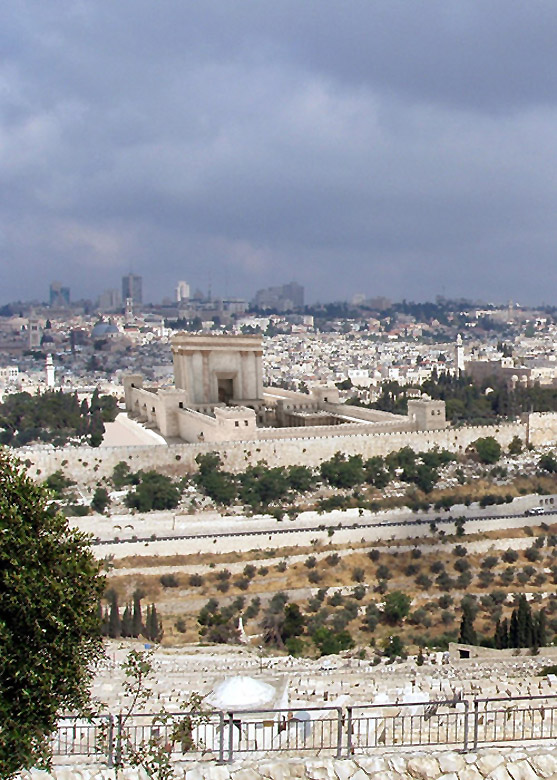 “בית מקדש שלישי בירושלים Third Beit HaMikdash Holy Temple in Jerusalem; And rebuild Jerusalem the holy city soon in our days! Blessed are You, O Lord, Who will rebuild Jerusalem in His mercy. The age of the apologetic Jew is over.JerusalemCats Comments: Pictures and Comments Added Hillel Fuld 25December2022 https://www.jns.org/opinion/its-time-for-jews-to-say-sorry-not-sorry/ (December 25, 2022 / JNS) For many years, I have felt something that made no sense to me, but I felt it very strongly. The feeling was that Jews around the world who blatantly support our enemies are worse than our enemies themselves.
There are many examples of this, but to keep it simple, I’m talking about Jews who are ashamed of their identity, Israelis who are ashamed of their country and the combination of the two: Jews who are ashamed of their country and Israelis who are ashamed of their Jewish identity.
Why do these people bother me so much?
Recently, the answer came to me: These people haven’t gotten the memo that Jews don’t have to be apologetic anymore.
Throughout our history, we were always apologizing:
“Sorry, I won’t learn Torah if it offends you, Greeks.”
“Sorry if we destroyed your economy, Germans.”
It’s not new. It’s even in the Torah. We sent spies to examine the land before entering it, and guess what 10 out of 12 came back saying?
“I’m sorry. They are too strong. We can’t do this. We’re too small. We’re too insignificant. Sorry, but no.”
Today, we no longer have to apologize.
We don’t have to apologize for waving an Israeli flag, for praying on the Temple Mount, for holding a Torah scroll at the Western Wall or for living in our land—all of it.
But these people are constantly apologizing:
“We’re so sorry about the ‘occupation.’”
“We’re so sorry about those crazy religious people who want my kids to know the foundations of our history, our tradition and our religion.”
“We’re so sorry about those freaks who want and are willing to fight for every inch of this land.”
“We are so sorry that the citizens of Israel have spoken and democratically elected a right-wing government that realizes that there never was an Arab Palestinian state and there never will be.”
“We’re sorry, America. Please don’t pull your foreign aid. We depend on you.”
Those days are over.
We are home and some of us are proud to be home, while others are still stuck in the olden days when Jews would turn the other cheek.
Want to know how this manifests? It’s simple: When you are ashamed of who you are, you blame yourself.
There are many Jews out there who blame Israel for antisemitism:
“If only we didn’t ‘occupy’ the ‘Palestinians,’ there would be no antisemitism.”
“If only those ultra-Orthodox Jews wouldn’t dress like that and stick to their ‘primitive ways,’ people wouldn’t hate us so much.”
But they’ll never accept our apology, so it’s time we stop apologizing.
The new government is too right-wing for you? You must have confused me for someone who cares about your opinion.
Foreign aid? Go ahead, Biden, try to pull it. Try to boycott Israel, BDS. Go for it, let’s see how that goes for you. JerusalemCats Comments: The Ukraine/NATO-Russian War proves that the US sells over priced fragile weapon systems that Israel has to modify to work. The US Military Foreign Aid saves the US Military Trillions of Dollars in development and testing, or would you like the Russians test them out in Ukraine? US Body Bags anyone? See Below: JerusalemCats Comments: Israel needs to develop it’s own Military Hardware like it did with the Iron Dome.
We don’t need you any more than you need us.  Riots in Los Angeles California; Just remember that the only country that the Jews have is Israel אין לי ארץ אחרת” Allow me to officially declare that the era of the apologetic Jew is dead. It should rest in peace.
Now let me introduce you to a new creature: the proud Jew. Ben and Jerry’s Israel-All Kashrut Cholov Yisroel NO Kitniyot-Pesach Ice Cream
 The world’s vision of Jerusalem from 1949 to 1967 was a place dominated by Christianity in terms of reverence, by Muslims in regards to prominence, and lastly by Jews, whose holiest spot was not even acknowledged and their basic human rights to live and worship were ignored. We have a lot to be proud of.
20% of all Nobel prizes have been awarded to Jews. We have the most moral army in the world. We are able to balance our military power with our unwavering need to behave morally and ethically, sometimes too ethically.  Since 2000, Israelis have won three times more Nobel Prize per capita in science and economics than the next highest-ranked countries. We lead the world in life-changing tech: Medicine, food, you name it, we are at the forefront of it all. See: Angels on Ambucycles: Jews and Arabs saving lives
 A 26-tent IDF field hospital set up during an exercise in Beit Naballah, in central Israel, on December 9, 2013. (IDF Spokesperson’s Unit) See: Angels of reliefWe took a desert that Mark Twain famously referred to as “a hopeless, dreary, heartbroken land” and transformed it into one of the most flourishing societies in the Middle East and the world, and it only took us 75 years. See: I Am Israel
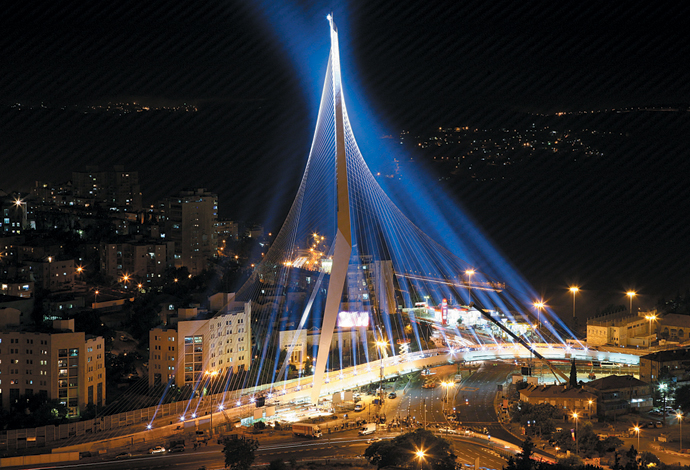 The Jerusalem Chords Bridge or Jerusalem Bridge of Strings גשר המיתרים, Gesher HaMeitarim, also called the Jerusalem Light Rail Bridge is a cantilever spar cable-stayed bridge at the entrance to the city of Jerusalem, Israel, designed by the Spanish architect and engineer Santiago Calatrava. The bridge is used by Jerusalem Light Rail’s Red Line, Incorporated in the structure is a glass-sided pedestrian bridge enabling pedestrians to cross from Kiryat Moshe to the Jerusalem Central Bus Station.
So, it’s time we all declared the apologetic Jew dead and introduced the world to a new breed of Jew, the proud Jew. If we don’t respect ourselves, how can we expect the world to?
Our new government, despite its shortcomings, represents the proud Jew. There has never been more Torah learning than there is right now. We have never been stronger physically or economically. That’s something to be proud of.
This new government will support Torah. It will support the land of Israel—all of it. It will support our needs, not the needs of our enemies. We have always talked about and prayed for the people of Israel, with the Torah of Israel, in the land of Israel. And now, we have arrived, not yet to the final destination, but we are well on the way. For that, we, the Jewish people, should be proud, not ashamed and apologetic.
Or, in other words: Sorry, not sorry.
Hillel Fuld, named Israel’s top marketer, is a leading journalist, tech advisor, online influencer and expert on Israeli innovation. |
|

How Israel is redefining foreign aid for the 21st centuryWorldwide activity by Israel’s Agency for International Development Cooperation (“MASHAV”) By Sam Gordon6March2018 https://jewishstudies.washington.edu/israel-hebrew/israel-redefining-foreign-aid-21st-century/ With the U.S. trumpeting an “America First” foreign policy, alongside draconian cuts planned for vital aid agencies like USAID, and China visibly increasing aid to the developing world, a new era of development assistance is dawning. This shift is coinciding with what the World Economic Forum is calling the “Fourth Industrial Revolution.” Data, AI, and the Internet of Things will redefine development in the 21st century, and countries at the forefront of innovative new technologies will gain a distinct competitive advantage.
Israel has already been globally recognized as a leader in innovation and technology, and it is now leveraging its technological advances into methods which are helping to redefine how foreign aid is delivered. This technological expertise, combined with its culture and history, grants Israel a unique angle in providing development assistance and establishing relationships with other countries through “development diplomacy.”
The government of Israel delivers aid through an organization called MASHAV, a Hebrew acronym for “Israel’s Agency for International Development Cooperation.” The organization represents an “official development assistance” model, in which a national government provides funding for development projects.
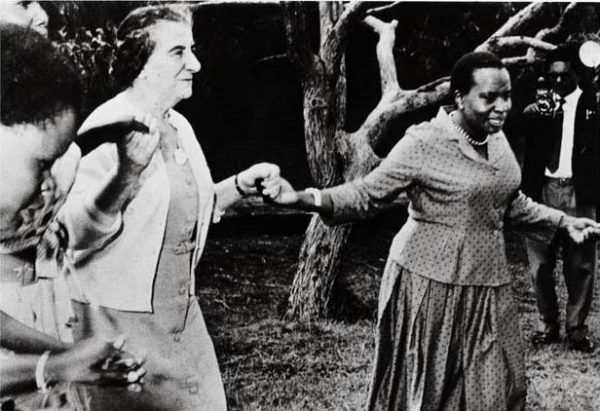 Israeli Prime Minister Golda Meir dancing with Ngina Kenyatta, wife of the first Kenyan Prime Minister Jomo Kenyatta, on a 1963 trip. Former Israeli Prime Minister Golda Meir established MASHAV in 1957 to reach out to nations in Africa and Asia. Today, MASHAV operates out of Israel’s Ministry of Foreign Affairs and partners with 132 countries as diverse as Ethiopia, Vietnam, and Guatemala. MASHAV seeks to focus on areas where Israel has a competitive advantage, such as technology, water, and education. It also places emphasis on sectors in which it has learned lessons during its own experience transitioning from a newly independent nation to a high-tech power.
This model relies on the use of Israeli experts to build up “human capacity” on the ground by training the next generation of professionals in developing countries, teaching them skills they can use to improve their society. To date, Israel has trained over 280,000 individuals. Training and technologyOne recent example of Israel using training and technology to redefine aid is the Indo-Israel Agriculture Project (IIAP). This project was initiated in 2008 and is jointly operated by the Israeli embassy, the Indian national and state government, the Indian Agriculture Ministry, and MASHAV. The project trains 20,000 farmers a year through Agricultural Centers of Excellence; there are twenty Centers of Agricultural Excellence currently operating throughout India, with an additional seven under construction.
 Greenhouse tomatoes grown through the IIAP (Indo-Israel Agriculture Project) using Israeli techniques The project’s goal is to boost farmers’ crop productivity by employing advanced Israeli technology and leveraging Israel’s specific expertise in agriculture. Centers are created based on a consultation that considers overlapping sectors of need in India and experience in Israel. Examples include beekeeping, vegetable cultivation, and dairy production.
Part of the IIAP involves using “big data, with drones, with other instruments of technology” to determine the proper water needs for each individual plant on a farm. Adviser to the India-Israel CEO Forum Sunil Parek sees the possibilities: “special agriculture technology for targeted plant-single plant-based nutrient supply system[s] can… reduce water requirements & input costs in agriculture significantly.”
Israel is hoping that investing in India’s development will pay diplomatic dividends by, for example, increasing trade and promoting a future alliance. This case also reveals trends that will become prevalent in the Fourth Industrial Revolution. Though Israel has eight million citizens and India over a billion, it is Israel’s innovation that is driving the relationship. A legacy of foreign aidTechnology is clearly a factor in how Israel is redefining aid, but Israel’s culture and history also play a vital role. There is a biblical connection in why the Jewish State is committed to providing international aid: Israel has a desire to be viewed as a “light unto the nations.” This phrase, a foundation of Prophetic Judaism, first appeared in the biblical book of Isaiah and was later adapted by Israel’s first Prime Minister David Ben-Gurion, who said it was a “guiding star” in all of Israel’s efforts. This “guiding star” can be interpreted as an ethical imperative for Israel to be a moral beacon in the world.
Israel also wishes to share its own development experience with other countries. As a state that formed successfully following colonial rule by Britain, Israel strives to share its experiences with countries that have similar origins. This idea was especially powerful during Israel’s “golden age of diplomacy” in Africa during the 1960s, when newly independent African leaders looked to Israel for its experience with development issues that were similar to the ones they were facing.
A key component of this was Israel maximizing the potential of the non-arable Negev desert, which encompasses nearly fifty percent of Israeli territory, through the process of drip irrigation. This innovation, developed by Sholmo Blass, ensures that plants grow using “small, but steady drops of water… targeted at their roots” that is “brought to the crops” from a nearby water source such as a lake or reservoir. The method resulted in both water saved and yields that were “higher than any other irrigation technique.” Through MASHAV, Israel has cooperated with over a hundred countries to provide individuals training on water management and irrigation using these techniques.
Has this development outreach provided tangible benefits for Israel? Israeli scholar Ayre Oded asserts that international aid has “remained an important arm of the Ministry of Foreign Affairs in its efforts to enhance Israel’s standing.”
An example of these principles translating into successful diplomacy is Zambia in the 1990s. When Frederick Chiluba won the Zambian presidential elections in 1991, he immediately reinstated diplomatic relations with Israel. As the new Israeli ambassador presented his credentials, Chiluba said that one of the factors motivating him to reinstate relations was his desire to renew MASHAV’s activities in the country. In fact, one of the representatives in Zambian parliament was quoted as saying that they “wanted the Israelis to come back because ‘ten of them’ had done more than the thousands of foreign advisors currently at work in Zambia.”
The Zambian example demonstrates how diplomatic results can blossom from sustained development efforts. It also exemplifies how there is a practical as well as an altruistic, “Jewish” angle to Israel’s outreach.
Israel will continue to be a key bellwether in understanding how technology will redefine both development and diplomacy in the 21st century. |
|

US ‘foreign aid’ to Israel: What’s in it for America?The annual $3.8 billion U.S. investment in Israel saves U.S. lives, strengthens U.S. security and yields an annual rate of return of several hundred percent.Yoram Ettinger 19December2021 https://www.jns.org/opinion/us-foreign-aid-to-israel-whats-in-it-for-america/ (December 19, 2021 / JNS) 1. Return on investment In October 2021 and January 2020, Israeli intelligence alerted the United States to Iranian drone and missile attacks on U.S. military installations in southern Syria and Iraq. Two hundred U.S. soldiers (in Syria) and 1,500 U.S. soldiers (in Iraq) took effective shelter.
The scope of intelligence shared with the United States by Israel exceeds that provided by all NATO countries combined. It includes data on Iran’s global terrorism and nuclear and ballistic programs; Islamic terrorism targeting the United States and pro-U.S. Arab regimes; battle tactics and military systems of U.S. rivals and enemies; Israeli-developed technologies and battle tactics; Soviet nuclear-equipped intercontinental ballistic missiles, and more.
According to General George Keegan, former head of U.S. Air Force Intelligence: “I could not have procured the intelligence [received from Israel] with five CIAs.” The annual budget of one CIA is around $15 billion.
Israel is the most cost-effective battle-testing laboratory for U.S. defense industries, employing (with much gratitude!) hundreds of U.S. military systems, sharing with the U.S. manufacturers lessons learned (operation, maintenance, repairs), which are later integrated as upgrades. These upgrades enhance U.S. global competitiveness, spare the United States billions of dollars and many years of research and development, increase U.S. exports and expand U.S. employment.
According to Lockheed-Martin, Israel’s use of the F-16 fighter jet has yielded over 700 upgrades, netting the manufacturer a mega-billion-dollar bonanza. A similar bonanza was received by McDonnell-Douglas, the manufacturer of the F-15 fighter. The benefits to the United States deriving from Israel’s experience with the more sophisticated and expensive F-35 are substantially higher.
According to the late Admiral Elmo Zumwalt and General Alexander Haig, “Israel is the largest US aircraft carrier, which does not require American soldiers on board, cannot be sunk, and is deployed in a most critical region, economically and militarily, sparing the US the need to manufacture, deploy and maintain more real aircraft carriers and additional ground divisions, which would cost the US some $15 billion annually.”
The formulation of U.S. battle tactics is largely based on Israel’s battle experience. For instance, U.S. special operations units (on their way to Iraq and previously to Afghanistan) and urban warfare specialists are trained in Israel. The U.S. Air Force benefits greatly from joint maneuvers with the Israeli Air Force, which possesses much more battle experience, shedding light on the far-reaching capabilities of U.S.-made combat aircraft.
Israel is an innovation hub (second only to the United States), hosting more than 200 U.S. tech giants, which operate research and development centers in the country, leveraging the brain power of the “Start Up Nation.”
Israel is a unique commercial and defense force-multiplier for the United States, extending America’s strategic reach without the presence of U.S. troops (unlike Europe, South Korea and Japan), while deterring and preempting regional rogue entities, which threaten the United States and pro-U.S. Arab regimes. More data is available here. 2. From misperceived liability to unique asset In 1948, the State Department, Pentagon, CIA, The New York Times and the Washington Post opposed the establishment of the Jewish state, considering it a feeble pro-Soviet entity, unable to withstand an Arab offensive; a burden on the United States.
Israel’s 1967 victory obliterated the military of then pro-Soviet Egypt, which aimed to topple every pro-U.S. Arab oil-producing regime, at a time when the United States was heavily dependent upon Persian Gulf oil. It spared the United States a major economic and national security setback and dealt a severe blow to the USSR. Israel shared with the United States captured Soviet military systems (including surface-to-air missile batteries and tanks) and game-changing battle tactics. This event changed the U.S. perception of Israel from burden to asset.
In December 1969, an Israeli commando unit snatched from Egypt the most advanced Soviet P-12 radar system, and transferred its technologies to the United States (the Senate Intelligence Committee assessed the value of this gift at $3 billion), enhancing the capabilities of U.S. defense industries and the U.S. armed forces.
In 1966, 1968 and 1989, Israel acquired (through defecting Arab pilots) Mig-21, 17 and 23 fighter jets, which were shared with the United States, upgrading the U.S. Air Force capabilities.
In 1970, Israel demonstrated its effective posture of deterrence, forcing pro-Soviet Syria to roll back its invasion of pro-U.S. Jordan by buttressing its military presence on the Syria-Israel-Jordan border (the Golan Heights)—at the request of the United States—at a time when the United States was bogged down in Southeast Asia.
In 1981, Israel destroyed Iraq’s nuclear reactor, sparing the United States a potential nuclear confrontation in the 1991 Gulf War. The transformation of Iran (1978/79) and Turkey (2003) from favored U.S. allies to major enemy/adversaries highlighted Israel as the only effective, reliable and democratic Middle East U.S. ally.
In 2007, Israel destroyed the Syrian-Iranian-North Korean nuclear reactor, sparing the globe a potential nuclearized civil war in Syria.
Since 2010, the “Arab Tsunami” has traumatized the Arab Street, underscoring Israel’s role as a unique U.S. ally, against the backdrop of the inherently intra-Arab violence, instability, unpredictability and tenuous nature of Arab regimes, policies and accords.
In 2021, the United States could terminate its military presence in the Persian Gulf if there were an Israel-like entity in that region. More data is available here. 3. Israel’s Qualitative Military Edge (QME) benefits the United States Israel’s QME has: • Upgraded its posture as a U.S. beachhead and force multiplier—with no need for U.S. soldiers—in the inherently explosive junction of Europe, Asia and Africa, between the Mediterranean, the Red Sea, the Indian Ocean and the Persian Gulf, which is an epicenter of regional and global Islamic terrorism, the proliferation of ballistic technologies, and drug trafficking.
• Bolstered its performance as a cost-effective battle-testing laboratory for the U.S. defense industry and armed forces, increasing U.S. exports, expanding U.S. employment and enhancing the formulation of U.S. battle tactics.
• Reinforced Israel’s posture of deterrence against Islamic terrorist organizations and rogue regimes, which have targeted the United States and all pro-U.S. Arab regimes.
• Constrained the maneuverability of Iran, Syria and Russia in Syria and Lebanon, serving as a critical line of defense for the highly vulnerable pro-U.S Hashemite regime in Jordan.
• Scaled down regional instability, reducing the threat of regional wars and terrorism, while enticing the relatively moderate and pro-U.S. Arab regimes to seek peace and normalization with Israel.
• Motivated the Arab Gulf States—in the face of Iran’s ayatollahs—to dramatically improve ties with Israel.
• Facilitated relatively swift and decisive military operations—with fewer losses to both sides—limiting the scope of Israel-Arab conflicts, regionally and globally.
• Eased a gradual U.S. military withdrawal from the Middle East, while Israel’s military capabilities fill in the geo-strategic void.
However, Israel’s QME is not an effective substitute for the topography of the Golan Heights and the mountain ridges of Judea and Samaria (the West Bank), which dominate the geographic sliver along the Mediterranean of pre-1967 Israel. Israel’s QME could be erased tomorrow, not so its topographic edge. More data is available here. Conclusion The aforementioned data reaffirms the fact that the United States’ annual $3.8 billion constitute a most productive investment in—not foreign aid to—Israel, yielding an annual rate of return of several hundred percent.
Thus, U.S.-Israel relations constitute a mutually beneficial two-way street—with the flow of benefits from Israel to the United States expanding by the day.
Yoram Ettinger is a former ambassador and head of Second Thought: A U.S.-Israel Initiative. This article was first published by The Ettinger Report. |
|
Foreign aid? Go ahead, Biden, try to pull it. Try to boycott Israel, BDS. Go for it, let’s see how that goes for you. JerusalemCats Comments: The Ukraine/NATO-Russian War proves that the US sells over priced fragile weapon systems that Israel has to modify to work. The US Military Foreign Aid saves the US Military Trillions of Dollars in development and testing, or would you like the Russians test them out in Ukraine? US Body Bags anyone? See Below: JerusalemCats Comments: Israel needs to develop it’s own Military Hardware like it did with the Iron Dome.
End U.S. Aid to IsraelAmerica’s manipulation of the Jewish state is endangering Israel and American Jewsby Jacob Siegel and Liel Leibovitz 17July2023 https://www.tabletmag.com/sections/news/articles/end-american-aid-israel Two years ago, Rep. Alexandria Ocasio-Cortez famously wept in Congress after changing her vote on funding Israel’s Iron Dome missile defense system from “no” to “present.” The New York Times said that the incident showed progressive members of “the Squad” “caught between their principles and the still powerful pro-Israel voices in their party, such as influential lobbyists and rabbis.” (The line was later removed with no correction.) In People magazine, the congresswoman’s procedural maneuver to avoid voting was appreciated for its pathos: “Ocasio-Cortez Opens Up About Israel Iron Dome Vote That Left Her in Tears: ‘Yes, I Wept.’” In the end, the resolution passed the House 420-9.
Ocasio-Cortez’s bit of Kabuki theater fit neatly into the premade mythology of a domineering Israel lobby, popularized by academic John Mearsheimer, whose views are experiencing a burst of popularity in isolationist corners of the right. His central claim—that America has been pressured by an all-powerful, determined ethnoreligious lobby into acting against its own interests—is made explicit in references to “influential lobbyists and rabbis,” in Rep. Ilhan Omar’s tweets that U.S. support for Israel is “all about the Benjamins,” and in graphics like The New York Times’ infamous “Jew-tracker” that policed support for Barack Obama’s Iran deal according to the religion of members of Congress.
Belief in the mythic power of “the lobby” rests on a common article of faith that is shared by Israel’s loudest critics and most fervent supporters—namely, that U.S. military aid forms the cornerstone of the “special relationship” between the two nations, and that this aid is a gift that powerfully benefits Israel. Cutting off Israel’s D.C. cash pipeline, it’s assumed, would dramatically alter the balance of power in the Middle East: in one scenario by endangering Israel’s security, and in another by forcing its recalcitrant leaders to accept the enlightened proposals of Western policymakers.
While this fantasy version of the U.S.-Israeli relationship is useful for stirring up emotions and demonstrating partisan loyalties, it does more to flatter the self-importance of Israel-aid opponents and supporters alike than it does to describe an increasingly warped reality, in which Israel ends up sacrificing far more value in return for the nearly $4 billion it annually receives from Washington. That’s because nearly all military aid to Israel—other than loan guarantees, which cost Washington nothing, the U.S. gives Israel no other kind of aid—consists of credits that go directly from the Pentagon to U.S. weapons manufacturers.
In return, American payouts undermine Israel’s domestic defense industry, weaken its economy, and compromise the country’s autonomy—giving Washington veto power over everything from Israeli weapons sales to diplomatic and military strategy. When Washington meddles directly in Israel’s domestic affairs, as it does often these days, Israeli leaders who have lobbied for these payments—including current Prime Minister Benjamin Netanyahu—are simply reaping the rewards of their own penny-wise, pound-foolish efforts.
As the costs to Israel of U.S. aid have skyrocketed over the past decade, the benefits of the relationship to the U.S. have only grown larger. Aid is popular with key voting blocs (few of them Jewish). It functions as a lucrative backdoor subsidy to U.S. arms makers, and provides Congress and the White House with a tool to leverage influence over a key strategic ally. The Israeli military, often ranked as the fourth-most powerful in the world, has become an adjunct to American power in a crucial region in which the U.S. has lost the appetite for projecting military force. Israeli intelligence functions as America’s eyes and ears, not just in the Middle East but in other key strategic theaters like Russia and Central Asia and even parts of Latin America. Controlling access to the output of Israel’s powerful high-tech sector is a strategic advantage for the U.S. that alone is worth many multiples of the credits Israel receives. Meanwhile, the optics of bringing the snarling Israeli attack dog to heel helps credential the U.S. as a global power that plays fair—but must also be feared.
It’s no wonder that one well-known regional expert we consulted, who served in high security-related positions in the U.S. government, was horrified when we proposed ending American aid to Israel. When we asked which of our arguments were overstated or mistaken, this person answered: “None of them. But my job is to represent the American interest. Aid to Israel is the biggest bargain we have on our books. Ending it would be a disaster for us. I just don’t see who it benefits.”
We do. The alternative to this unequal relationship based on dependence is a more forthrightly transactional relationship, which would allow Israel to benefit economically, diplomatically, and strategically. It might also, we believe, diminish the current American infatuation with treating the Jewish state as a moral allegory in U.S. political psychodramas, rather than as a tiny country in the Middle East with its own local challenges and considerable advantages to offer the highest bidder. The current hyperpolarized atmosphere around Israel is not good for anyone—not for an America whose political class is looking to distract people from its own failings; not for a majority of the world’s Jews who live in Israel; and not for American Jews, who have come to identify their civic role with serving as props in an expiring piece of political theater. When the curtain comes down, they’ll find themselves without a role—and cut off from the 3,000-year-long Jewish historical continuum that is, or was, their inheritance.
Ending aid would not mean the end of the U.S.-Israeli military alliance, intelligence sharing, trade, or any mutual affinity between the countries. Rather, it would allow both sides to see what each is getting in return for what. In the words of retired IDF Major General Gershon Hacohen: “Once we are not economically dependent on them, the partnership can flourish on its own merits.”
Contrary to the blather about an “eternal relationship,” the U.S.-Israel alliance is a fairly recent coinage. America was not particularly involved in the creation of the Jewish state. When Israel declared its independence and was attacked by eight Arab armies in 1948, Washington extended diplomatic recognition to the new nation but refused to sell it arms, even pressuring other countries to deny weapons to the Israelis.
In 1956, when Czechoslovakia, then a satellite of the Soviet Union, sent a shipment of weapons to Egypt, Israel’s Prime Minister David Ben-Gurion implored American President Dwight Eisenhower “not to leave Israel without an adequate capacity for its self-defense.” But Eisenhower believed that a policy of “evenhandedness” would allow his administration to solve the Arab-Israeli conflict and strengthen America’s position in the Middle East, so he refused the request. When Israel, in partnership with Britain and France, seized the Suez Canal, Eisenhower made them give it back, and aligned the U.S. with Egyptian leader Gamal Abdel Nasser—in what Eisenhower later described as one of the worst mistakes of his presidency.
Eisenhower’s approach to the Middle East would change during his later years in office, but not before the Israelis found a different superpower patron: France. In addition to gunboats and fighter planes, the French supplied the Israelis with their single greatest strategic asset to date—the country’s nuclear program, which by the mid 1960s had produced several nuclear bombs despite the best efforts of President John F. Kennedy and his State Department to stop it. France continued to be Israel’s leading military supporter until the runup to the Six-Day War, when French leader Charles de Gaulle imposed an embargo on weapons sales to the country in expectation of a Soviet-backed Arab victory. After Israel took out the Egyptian and Syrian air forces on the ground in the first six hours of the war using French Mirages, it became clear that de Gaulle had bet wrong—and a newly powerful Israel entered the market for a new great power backer.
This, then, is when the U.S. began substantial arms sales to Israel, picking up the card that de Gaulle had discarded and playing it back against the Soviet Union, which as the dominant power in the region was backing the Arab states. From the beginning, the U.S. military partnership with Israel came with political conditions. During the 1973 Yom Kippur War, Israel’s fate hung in the balance until Henry Kissinger convinced Richard Nixon to resupply Israel with ammunition for U.S.-made weapons systems, which America was withholding. In 1975, the Ford administration suspended arms sales as a tactic to pressure Israel into signing a new “Sinai accord” with Egypt.
Formal U.S. military aid to Israel, as opposed to loans and cash-on-delivery arms sales, started in 1979, when the Carter administration offered it as a carrot to get Israel to agree to withdraw from all of Sinai as part of a peace deal with Egypt. The same deal provided a comparable sum of U.S. military aid and arms to Egypt, for many years the second-largest recipient of U.S. foreign military financing after Israel. Notably, the aid to Egypt was given despite the country’s displaying no capacity to deploy military force outside its own borders—the goal being to achieve a rough form of U.S.-brokered parity between the two recent foes.
These days, the appearance of massive U.S. largesse to Israel reinforces the claim that America provides Israel with a “blank check.” In 2019, leading liberal and progressive candidates vying for the Democratic nomination for president, Bernie Sanders, Elizabeth Warren, Pete Buttigieg, and Julian Castro, all voiced support for making aid a condition of Israel allowing the U.S. to dictate its internal politics. “I would use the leverage of $3.8 billion—it is a lot of money,” said Sanders. “We cannot give ‘carte blanche’ to the Israeli government.”
Sanders is right that $3.8 billion is a lot of money. But he is either irresponsibly mistaken or being deliberately manipulative in his claim that it is offered “carte blanche.” U.S. financing for the Israeli military more than pays for itself, and has always had conditions attached. Aid to Israel has never been an act of charity or a payment extorted by “the lobby,” but a tool to advance American interests. The list of these interests can change—historically, it has included counterterrorism, nuclear nonproliferation, and a balance of military power that favors America’s dominant strategic position in the Middle East. What doesn’t change is that America’s foreign policy relationships are always rooted in the calculations of American politicians and elites.
Shortly before he left office, President Obama signed the largest aid package in history, committing the U.S. to send Israel $38 billion over a decade starting in 2018. The Memorandum of Understanding (MOU) capped the efforts of an administration that had spent the previous eight years downgrading the U.S.-Israeli alliance to the point of spying on pro-Israel members of Congress. After all the acrimony over the Iran deal, the landmark aid agreement shut up Obama’s critics by “proving” that he was in fact a stalwart ally of Israel, even as he was gifting Iran with a nuclear bomb—which the Iranians would presumably use to fulfill their threats to “wipe the Zionist entity off the map.” Even Obama’s archnemesis Netanyahu thanked the U.S. president for the “historic deal.”
In reality, the MOU advanced Obama’s goal of paying lip service to Israeli fears while constraining future Israeli actions, in line with a new American strategic architecture in which the interests of traditional allies like Israel and Saudi Arabia would be “balanced” with those of their mortal enemy, Iran. It deepened Israel’s reliance on U.S. arms and military spending, while extending Washington’s reach into Israel’s domestic affairs. Paradoxically, the “most generous” package ever was an instrument to downgrade the U.S. commitment to Israel. The MOU purchased both influence over Israel and the acquiescence of American Jews who were expected, in the face of such public generosity, to go along with the White House policy of strengthening Iran, while upholding the narrative that Obama was Israel’s “best friend.”
Why is it important to present Israel as America’s best friend, and as central to American decision-making? Because it’s easier than telling the truth, which is that many American foreign aid arrangements are ultimately rooted in enriching a morally profligate arms industry that is financially headquartered in the U.S. but invested in conflict on a global scale. Recently, U.S. military aid to both Israel and the Palestinian territories has been dwarfed by U.S. aid to Ukraine, which last year totaled over $75 billion. That’s more aid than Israel has received from the U.S. during the entirety of the U.S.-Israel relationship.
Last week, President Biden authorized the military to deploy up to 3,000 reservists to Europe in support of Ukraine’s war effort. There are, at present, an undisclosed number of American troops operating in Ukraine alongside the other 80-some countries where the U.S. has forces stationed. By contrast, no American soldier or pilot has ever risked their lives for Israel, and no American missile or aircraft has ever flown in Israel’s defense. Such are the myths and realities of “the lobby.”
In any age of political decay, social dysfunction, economic volatility, and geopolitical danger, it has been convenient and comforting to blame the Jews. The current American elite is not interested in frank public discourse about its own complicity in our national troubles. Ending aid won’t end the practice of scapegoating Jews, but it will remove a favorite decoy and dog whistle of American public officials, administrators, bureaucrats, philanthropists, and thought leaders. It might even force them to be more honest with the public—not least about what our Middle East strategy is actually supposed to accomplish.
The Israeli political class has known about the lopsided reality of the U.S.-Israel arrangement for some time, but for the past eight or nine years seems to have decided the farce had some value. For them, U.S. aid is valuable not because it is a good deal for Israel’s military-tech complex, but because the appearance of close strategic alignment with the U.S. serves as a public, tangible pledge, renewed annually, of Great Power backing, in a world that is largely hostile to the country’s existence. Even now, as it’s clear from Washington’s courtship of Iran that U.S. security pledges no longer mean what they once did (ask the Afghans, or before them the Vietnamese, Cambodians, and a long list of other former recipients of U.S. military aid), the value of these pledges to Israel has been based on the belief that other parties believe in them—and are therefore constrained accordingly. The point is for the world’s only hyperpower to be seen publicly putting a big diamond ring on Israel’s finger, even if the diamond is actually made of glass. The more “special” the relationship appears to others, the better.
As the price of its dependency, Israel is now being forced to downgrade its own defense industries. Whereas the previous MOU contained a special provision for Off-Shore Procurement (OSP) that allowed Israel to spend around 26% of the aid it received on domestic products, the new terms require that all aid received from Washington be spent inside the U.S. In 2018, Israel’s Defense Ministry projected that the new MOU would cost the country $1.3 billion annually in lost revenue and cause the loss of some 22,000 jobs. Moshe Gafni, a former chairman of the Knesset’s financial committee, warned of the deal’s “severe ramifications for the delicate fabric of the State of Israel, harming its security.” A separate assessment in 2020 by the Israeli think tank INSS, concluded that “anywhere between several thousand and 20,000 of the 80,000 jobs in the defense industries in Israel will be lost.”
In return for accepting Obama’s aid package, Israel has now become dangerously reliant on U.S. military technology. The result of this enforced dependency, according to the retired General Hacohen, is stunting the IDF. “Israel is so addicted to advanced U.S. platforms, and the U.S. weaponry they deliver, that we’ve stopped thinking creatively in terms of operational concepts,” Hacohen told the U.S. publication Defense News in 2016—two years before the new MOU went into effect.
This is especially dangerous because, having short-circuited Israeli competition and dumped tens of billions of dollars worth of equipment into Ukraine, the U.S. is increasingly having trouble arming itself—let alone anyone else. A recent report from the Government Accountability Office found systemic problems in the U.S. procurement system leading to widespread delays. The report found that more than half of the 26 major defense acquisition programs under review “had yet to deliver operational capability” and were delayed due to “supplier disruptions, software development delays, and quality control deficiencies.” And what does get produced often isn’t up to par. As part of its “special arrangement,” Israel gets preferential access to the F-35, but is then locked into a fleet of aircraft both riddled with technical problems and a poor fit for Israel’s strategic air priorities. At the risk of stating the obvious, it would be nice to be able to shop on the open market.
The consequences for Israel’s economy and to the country’s security posture will get more severe in coming years as the full bill from the MOU comes due. According to a congressional report, the “phasing out [of] Off-Shore Procurement (OSP) is to decrease slowly until FY2024, and then phase out more dramatically over the MOU’s last five years, ending entirely in FY2028.” As a consequence, the report notes “some Israeli defense contractors are merging with U.S. companies or opening U.S. subsidiaries”—in other words, transferring their personnel and capacities from Israel to the U.S.
So, in return for a so-called “aid package” that actually costs Israel a fortune, the Jewish state is now tethered to its benefactor’s Iran-centric foreign policy and prohibited from capitalizing on its own considerable capabilities, while granting the U.S. access to its best military and scientific minds at a heavily reduced rate of pennies on the dollar. In turn, the ostensible largesse of this arrangement transforms Israel into a scapegoat for every lunatic conspiracy theorist in America to indulge in Jew-baiting in the guise of pontificating about “U.S. foreign policy.”
Had this been 1981, say, you could safely argue that Israel hardly has any choice but to depend on the kindness of strangers and disregard any unpleasant blowback. Back then, the Jewish state worked tirelessly behind the scenes to make sure that President Reagan’s sale of the AWACS weapons system to the Saudis came with a consolation prize for Jerusalem as well.
But the Israel of 2023 is immeasurably wealthier and more powerful than the dusty socialist country of 40 years ago, where local electrical grids could be overloaded by American hair dryers.
The growth of Israel’s independent capacities are particularly obvious in the military arena. According to some estimates, Arab states purchased about a quarter of Israel’s $12.5 billion arms exports in 2022, a number that keeps growing. Add to that India, a growing market—and the recent buyer of a $1.1 billion Phalcon advanced early-warning system—and you have a robust nation perfectly capable of striking bilateral deals with partners that aren’t superpowers hellbent on containing and downgrading their allies.
Still, a small but powerful cadre of Israelis seems invested in the idea that nothing has changed. Certain former generals, politicians, investors, and intellectuals in Israel—often graduates of elite American universities who enjoy strong ties to American corporations and NGOs—can’t imagine a scenario other than fealty to the Big Brother across the ocean. They see Washington not only as a crucial ally, but as the center of all power and legitimacy. It is the U.S., after all, that bestows fellowships in prestigious think tanks and sabbaticals at Harvard that have become essential markers of global professional success—and who helps them fight their enemies at home. While this small, American-adjacent clique is increasingly finding themselves on the unkind end of the voters’ ballots (see under: Barak, Ehud), they maintain a powerful ability to stoke fears about how displeasing America could threaten the entire Jewish future.
In this, they are joined by Jewish communal leaders stateside. It is a bitter irony that organized pro-Israel political advocacy in America places “support full security assistance to Israel” at the top of its list of policy objectives. In doing so, these groups are setting a strategic trap in which being “pro-Israel” requires supporting a policy of U.S. soft power projection that conditions Israel to act as a satrap of Washington, and go along with a regional policy that poses a direct threat to the country’s longer-term prosperity and survival.
Indeed, in order to maintain their own power, the entire cosmos of American Jewish organizations, with few exceptions, is now dedicated almost exclusively to maintaining an arrangement that cripples Israel’s capacity for independent action, while locking American Jews into a permanent posture of appearing to suck the U.S. government dry in order to fund their own niche overseas project.
This goes deeper than politics. Instead of looking at the Jewish state through the prism of a commitment that is as old as human civilization itself, and whose stakes include the physical survival of the Jewish people, American Jews have been herded into understanding Israel through the narrow prism of a 60-year-old political deal that has passed its sell-by date.
With Israel and Israelis increasingly a mystery to them, the only issue around which American Jews feel permitted to organize these days is antisemitism—and even then only as defined from above. Hence, we aren’t actually allowed to look at the major sources and manifestations of this phenomenon, which are anti-Zionism and attacks on religious Jews, but instead are urged to sign on to celebrity-driven, Instagram-friendly messaging campaigns whose actual beneficiaries—like those of other viral “justice” crusades—are, at best, unclear.
The whole charade has to end. External hostility has more or less been the Jewish fate since the time of the ancient Greeks. Yet Jews are still here—having somehow survived the previous 3,000 years and revived their historic homeland again without relying on U.S. military aid packages or officially sanctioned declarations against antisemitism that elevate people who hate us.
The irony is that American history, Jewish history, and the modern State of Israel already share a deeper, richer link than any provided by aid or social media: a belief in divine election, which also guided the Founding Fathers as they struggled to erect the political and moral foundations of the early republic.
If that sounds too lofty, too overblown, too religious, the same point stands on grounds of mere self-preservation, as evidenced by the history of Jews in Egypt, in Spain, and in Vienna whose survival strategy was to seek protection by those who happened to be in power at a given moment. The imperative to transcend such a strategy is not insular or backwards; it’s the powerful realpolitik of Jewish history.
Cut the stranglehold of aid. Let America pursue its interests. Let Israel, too, follow its own interests, which sometimes align with those of Washington and sometimes don’t. If Israelis think it will ensure their security to decapitate the Iranian regime, or give the Golan Heights on a platter to Bashar Assad, or develop their own homemade fighter plane and sell it to India or Saudi Arabia, let them go ahead. And let American Jews who care about being Jewish focus on observance and learning their people’s history, instead of pimping for Lockheed Martin. If the commitment to Israel is deeper than mere political fashion, if it is more than a secularized idolatry, then it’s time to prove it—by smashing the ideological idols of America’s Israel debate. |
|

Israel government is new normal in the Middle EastNew coalition signals normalization of Israeli politics in a China-led era of fast-shifting geopoliticalby David P Goldman 03January2023 https://asiatimes.com/2023/01/israel-government-is-new-normal-in-the-middle-east/?mc_cid=c4f3b6b009&mc_eid=9a559f479b  Israeli Prime Minister-designate Benjamin Netanyahu adjusts his kippah after speaking at a special session of the Knesset, Israel’s parliament, to approve and swear in a new government, in Jerusalem on December 29, 2022. Photo: Pool / Amir Cohen JERUSALEM—Prime Minister Benjamin Netanyahu’s new government is anything but the manifestation of extremism portrayed in most of the world’s media.
Typical of misreporting in the Western press was Le Monde’s December 28 assertion that “the new coalition gives pride of place to Jewish extremists and the ultra-Orthodox, who plan to weaken the judiciary and expand settlements.”
On the contrary: The new coalition embodies the normalization of Israeli politics, that is, the politics of a Jewish State in the Middle East.
Israel’s “new normal” may find an alignment with a changing political landscape in the Middle East, especially if negotiations to establish diplomatic relations with Saudi Arabia succeed. This new alignment is the work of regional players, with China in a supporting role. The United States and other Western countries, meanwhile, have become bit players.
The success of the two national religious parties in the last election and their prominent place denotes the emergence of a Jewish nationalist center that seeks accommodation with the Arab world at large, as opposed to the radical fringe of Palestinian irredentists who have an exaggerated share of the global limelight. It also denotes a greater distance between the United States, which hosts the world’s second-largest Jewish community after Israel, and Israel itself.
Israel’s fifth national election in four years appears to have established a new and enduring majority. Netanyahu’s previous governments depended on a shaky alliance between the secular right-wing (Likud) and the Haredi religious parties. This arrangement was inherently unstable; the Haredi (ultra-Orthodox) for the most part have little interest in Jewish nationalism and lobby for subsidies for their own communities.
This time, as numerous analysts have observed, some of the ultra-Orthodox vote, especially among younger Haredi, shifted to the nationalist religious parties. That, plus the law-and-order voter shift from the center, gives Netanyahu a solid and possibly lasting majority. Israeli voters shifted their support to parties that insisted that Israel would deal with its own security problems according to its own requirements. A surge of support for Bezalel Smotrich’s Religious Zionist Party and Itamar Ben-Gvir’s Otzma Yehudit (“Jewish Strength”) was a law-and-order vote more than anything else.
A surge in terrorist attacks on Israelis directed by Hamas and Islamic Jihad lifted the monthly count to more than 400 in October, the month of the elections.
Many Israelis from all walks of life told me that they had voted for the religious-nationalist ticket for the first time in response to the terror attacks. Ben-Gvir will have enhanced powers over Israel’s police in his new capacity as minister for national security.
Hamas, the governing entity in Gaza under a charter that demands the destruction of the State of Israel, likely took heart from Robert Malley’s return to office as Biden’s special envoy to Iran.
In 2008, the Obama campaign fired Malley for engaging in personal outreach to Hamas, only to bring him back as chief coordinator of operations against the Islamic State.
The military capability of Hamas has only nuisance value. Its sole stratagem is to engineer civilian casualties among Arabs in order to accuse Israel of human rights violations.
In May 2021 alone, Hamas and Islamic Jihad terrorists fired more than 4,340 rockets from Gaza at civilian targets in Israel. These rockets killed ten Israelis, but many of them fell back inside Gaza, killing more than 90 Palestinian Arabs.
That is, Hamas and Islamic Jihad killed ten Arab civilians for every Israeli civilian killed in missile attacks. Hamas uses Gaza civilians as human shields, by its own admission firing rockets at Israel from schools and hospitals.
Maximizing civilian deaths in order to accuse the Israelis of human rights violations recalls the classic definition of the Aramaic-Yiddish word chutzpah, namely a man kills his parents and then asks for clemency on the grounds that he is an orphan. But this charade has a sympathetic audience in the left wing of American politics.  Members of the Al-Qassam brigades, the armed wing of Hamas, march in Gaza in a file photo. Photo: AFP / Emmanuel Dunand When Israeli soldiers raided a Hamas cell in the West Bank town of Jenin last May 11, a stray Israeli bullet killed Shireen Abu Akleha, a Palestinian Arab journalist embedded with a terror group.
Under pressure from the left wing of the Democratic Party, which imagines that the Palestine conflict is a cognate of the American civil rights movement, the Biden administration on November 14 announced an FBI investigation into the shooting, despite a previous assurance that it wouldn’t.
Only 34% of Democrats (versus 66% of Republicans) have a favorable view of Israel’s government, according to a May 2022 Pew Research poll conducted while then-prime minister Yair Lapid made every effort to placate Washington.
The knee-jerk anti-imperialism of Third World governments continues to produce majorities for UN General Assembly resolutions condemning Israel, although the majorities are shrinking as more developing countries, especially in sub-Saharan Africa, vote with Israel or abstain.
More important than the UN General Assembly vote, though, is a shift in regional alliances that for the most part works in Israel’s favor.
Hamas, strictly speaking, is the Palestinian branch of the Muslim Brotherhood, the fundamentalist Islamic sect founded in 1928. The Brotherhood combines extreme Islamism with the organizational structure of a modern totalitarian party.
In the past, the Islamist government of Turkish President Recep Tayyip Erdogan supported Hamas, most visibly with the 2010 “Gaza flotilla” that sought to break the joint Egyptian-Israeli blockade of Hamas-controlled Gaza.
Turkey provided refuge to Hamas and other Muslim Brotherhood operatives. This put pressure on the Arab Gulf states, which view the Muslim Brotherhood as a threat to the Arab monarchies.
In 2016, an officers’ coup tried and failed to overthrow Erdogan. The Turkish leader blamed the Gulf States, especially the United Arab Emirates (UAE), for backing the coup. In 2018, when Israel suppressed attacks from Gaza, Turkey withdrew its ambassador to Jerusalem. Turkey has now exchanged ambassadors with Israel, patched up relations with the UAE and reportedly expelled dozens of Hamas operatives. Turkey’s economic fortunes have reversed; the Turkish lira, in free-fall during 2021, stabilized during 2022, and Turkey’s depressed stock market doubled in US dollar terms, the best-performing stock market in the world.
Direct investment from the Gulf States helped Turkey, but (as I reported on December 15) a surge of Chinese exports to Turkey, presumably with Chinese trade financing, probably was the biggest driver of Turkey’s turnaround.
Turkey’s realignment with Israel, the Gulf States and China creates a new security architecture in the region. Iran is marginalized, emphatically so after China signed a December 9 joint statement with the Gulf States admonishing Iran for supporting terrorist activity in the region, following Chinese President Xi Jinping’s state visit to Saudi Arabia.
All of Israel’s major parties, emphatically including the national religious parties, agree that the country’s most urgent diplomatic goal is to establish diplomatic relations with Saudi Arabia, the guardian of Islam’s holy sites. Normal relations with the Saudi kingdom, Netanyahu argues, would establish peace between Israel and the Arab world.
A great deal has changed since US liberals during the Obama administration envisioned a Middle East security architecture with Iran at the center. Instead, Turkey has moved into center position, with China’s economic backing.
Turkey has had to give up (or at least defer) its ambition to be the center of the Muslim world, in exchange for a rescue from the brink of economic chaos. Iran is the self-isolating odd man out, even where China is concerned.
The two-state solution that has occupied so much of the attention of Western governments is not on the agenda. It never really was. Hamas abhors the notion of a Jewish state of any kind. The Fatah faction that controls the Palestinian Authority in the West Bank notionally supports a two-state solution but in practice has done everything possible to stop it.
In a June 25, 2009 interview with the Jordanian daily Al-Dustour, Palestinian Authority chief negotiator Saeb Erekat said that the Israeli government under former Likud prime minister Ehud Olmert had offered PA President Mahmoud Abbas territory equal in size to 100% of the land occupied in 1967. 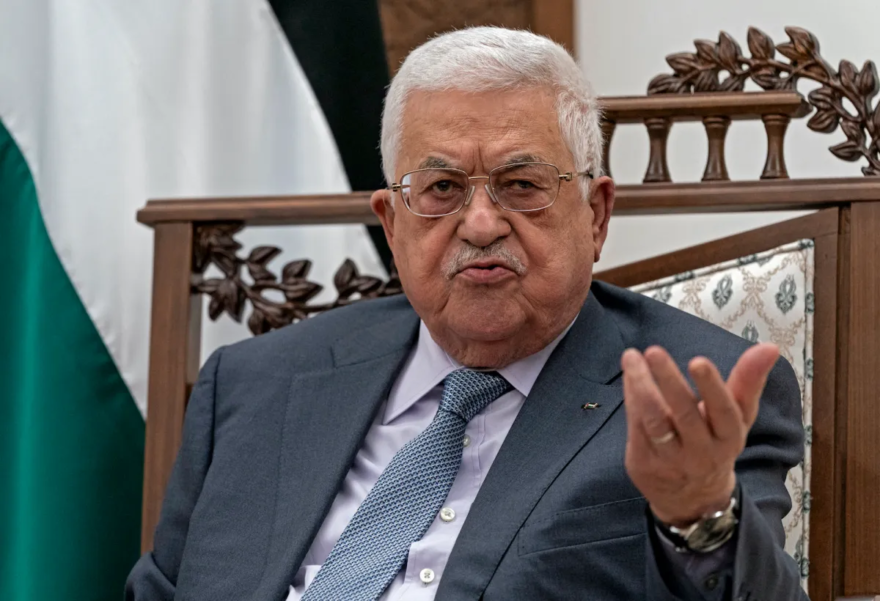 Palestinian President Mahmoud Abbas doesn’t really want his own state. Photo: AFP / Alex Brandon / Pool Abbas doesn’t want his own state, for several reasons. The Israelis unilaterally withdrew from Gaza and let the Palestine Authority take over in 2005, but Hamas took over in a violent 2007 coup. Abbas rightly fears the same outcome on the West Bank. In the meantime, Western subsidies make the PA a lucrative enterprise.
After years of Charlie Brown-and-the-football-games with the Palestine Authority, most Israelis are tired of hearing about the two-state solution. Only 31% of Israelis supported the notion while 60% opposed it, according to a recent poll.
In Judea, the biblical heartland of the ancient Jewish kingdom, an official of the Jewish settlers’ community said that the national religious parties would welcome a Gulf State presence on the West Bank, for example, to beautify the area around the tombs of the patriarch Abraham in Hebron.
The site is holy to Muslims as well as Jews, housing a mosque as well as a synagogue. Follow David P Goldman on Twitter at @davidpgoldman |
|
Jordan: A whole country going on Silicon Valley Bank. Cash has dried up at several Jordanian banks
|
|

The Jordan Option is finally being actualizedThis means the King is abdicating.
The President of the Jordan Coalition for Change, Abedalelah Amaala, tweeted on July 28th, “Abdullah II, Rania, his son Hussein, his hope, his prime minister and his entire government are outside Jordan in a tourist resort. Jordan is on the brink of collapse” What this means is that King Abdullah II is abdicating along with his government.
The Jordan Option called for his abdication in 2017 and the change of Jordan into a republic lead by Mudar Zahran. This is great news for Israel as Zahran wants to cooperate with Israel, not confront her. He intends to reaffirm the Jordanian citizenship of all Palestinians in the West Bank and Gaza. Thus Israel will be able to annex most of the land without the need to give a path to citizenship for the local Arabs. Furthermore Zahran will effectively replace the Palestinian Authority and UNRWA will be done away with.
The next day the Secretary General of the Jordan Opposition Coalition, Mudar Zahran, tweeted,
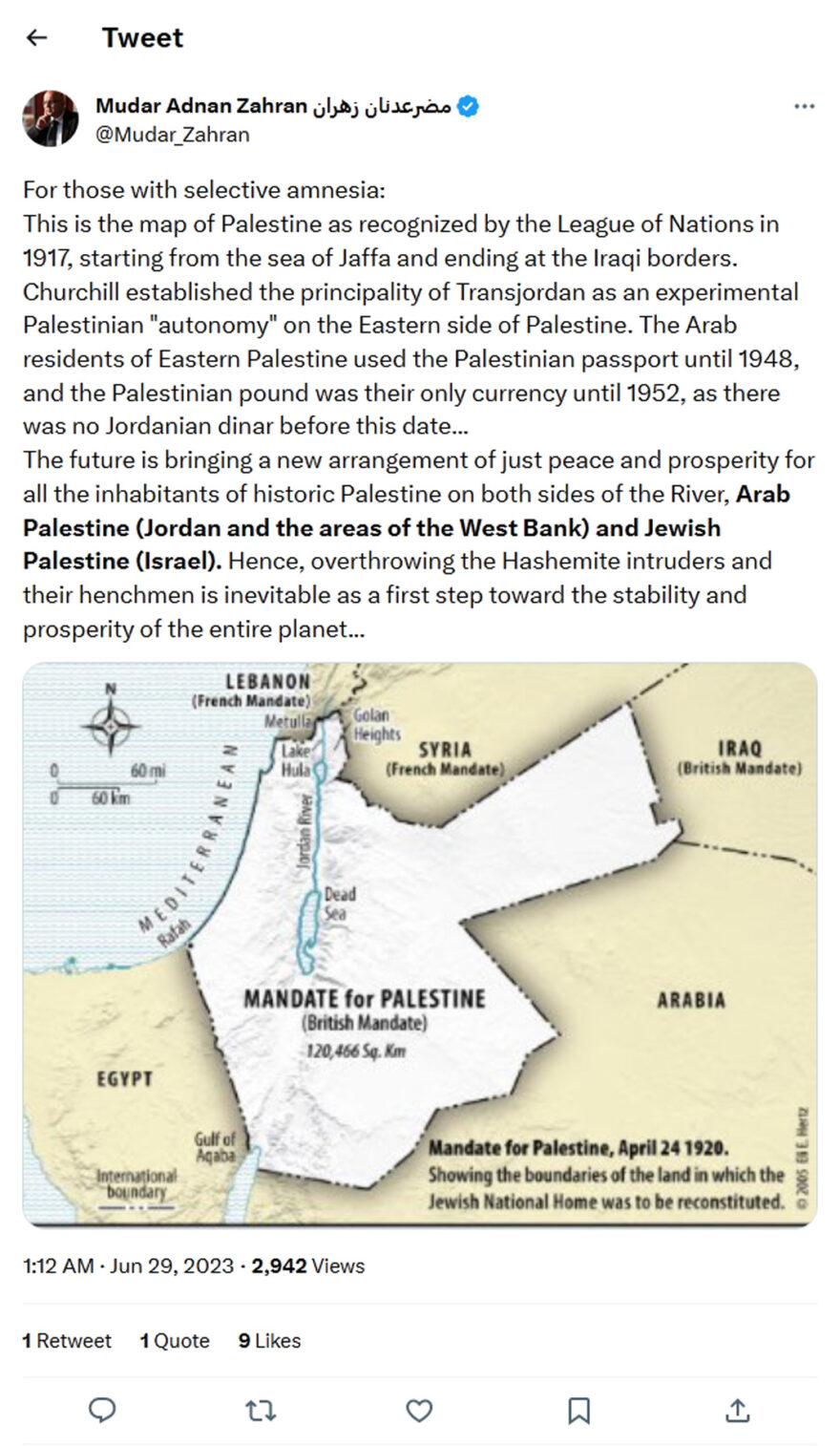 Mudar Adnan Zahran-tweet-28June2023-This is the map of Palestine as recognized by the League of Nations in 1917
A day earlier he had tweeted, “The remembrance benefits the believers;
This actualization was set in motion at a Conference on the Jordan Option held in the Begin Center on Oct 17, 2017. Ted Belman’s remarks at Jordan Option Conference in 2017.
One year later I wrote, Trump’s Deal of the Century a.k.a The Jordan Option. “According to a very well-informed source (and reiterated in 2022) , the administration of the A areas, will pass from the PA to Jordan. These areas include, Tulkarn, Qalkilya, Jenin, Nablus, Ramallah, Bethlehem and Jericho. The B areas will be absorbed into the C area in order to remove the Swiss cheese effect. Hebron, on the other hand will be administered by a joint local council made up of Israelis and Palestinians. This is the Confederation that Abbas rejected a few weeks ago”
“My source also tells me that the Palestinians living in the Gaza Strip will be given the option of being in a confederation either with Jordan or Egypt. Either way, negotiating a Gaza truce is part of the deal.
“This means that the PA will be done away with because its primary function is to wage war against Israel’s legitimacy
“All Palestinians living west of the River will be seen as both Jordanian citizens and foreign residents. There will be no need to give them Israeli citizenship.”
Then on Aug 28, 2022, I wrote, The Genesis of the Jordan Option and “Confederation with Jordan”. It is self-explanatory.
I explained, How the Jordan Option will impact Israel and Who is Mudar Zahran and why is he important? It is not clear to me what is meant by “confederation”. I hope it does not mean that Jordan will be the sovereign of the “areas of the West Bank”. I have suggested many times to Mudar Zahran, that Israel should be the sovereign and that said lands could be leased to Jordan for a long time.
Mudar told me yesterday that Israel will be the sovereign over all lands west of the Jordan but I am not sure if he means Gaza also. He went further to explain in more detail what was happening. It seems that what he reported a year ago is still the order of the day.
At the Jordan Option Webinar in May 2022, he gave this talk. Jordan’s Future Between the Abraham Accords and an Arab NATO – Mudar Zahran And last summer he wrote this article: Change in Jordan, Easy, Cheap and Good for Everyone – Mudar Zahran. I was very disturbed by what I read and told him so.
“Your stress was on the gradual creation of the MEUnion similar to the EU. In addition a defense pact like NATO is envisioned.
“In order to make the MEU remotely possible, you must re-educate the Arabs to stop hating Jews, Christians and infidels. This would require at least three generations of Arabs to be taught to love their neighbors in schools and in the Mosques. They must be taught to love democracy and reject the autocratic rule. They must do away with Sharia Law and give up on Jihad, except for the personal jihad.
“I do not believe this is possible. Perhaps you could make an argument for why it is possible and how it would be done.
“Secondly, the EU is breaking down now due to the stresses caused by Muslim immigration, open borders and the Ukraine War. Nationalism is on the rise. I for one think nationalism is a good thing. MEU is antithetical to nationalism and sovereignty.
“You stress that people will be able to live and work anywhere within the MEU. I find this very troubling. the JO envisioned mass emigration to Jordan. This envisages the opposite. It will require the security fences to be removed and travel restriction for Palestinians lifted and will permit Palestinians from A and B to live anywhere.
“The only restriction is that Israeli citizenship will be denied them. So A and B simply will be areas where Jordanians/Palestinians will have autonomy.
“Do I understand this correctly? Is this the future?”
“I still believe that all refugees must emigrate to Jordan and that all Area Bs must be ultimately done away with the inhabitants absorbed into Area A or preferably Jordan.”
At the conference in 2017, I said:
“Liberman came up with the asinine plan to double the population in Qalquilya,
“Now Martin Sherman points out how can you have authority over Area C when you have all these cheese holes all the way through it? How do you do the border? What do you do with all that? So from my point of view, we have to focus. We have to empty out Qalquilya. Empty out Tulqarm. Empty out any refugee camps that are in our heartland right at the middle, right adjacent to Highway 6 and we have to clean out all those area B lands and then do Area C.
“Thank you and just to show you how magnanimous I am I’m quite prepared to have the Palestinians in Hebron have an emirate as proposed by Mordechai Kedar. They want to be removed from the PA. They’re ready for self-government. They want to live in peace. They can stay and be an Emirate plus all the cities that are on the ridge, of Ramallah, of Shiloh, of Jenin. You know how far Ramallah is from Amman? 40 miles. We can make a highway. They could stay there and they could travel by highway to Amman.
“I can’t see it any other way. Mudar texted me an answer today. Ted “A very important part of the JO is the compensated immigration to Jordan. What’s happening with that?” “We must move everyone out of the B areas either to the A areas of preferably to Jordan.” “MEU is the opposite of Nationalism. I’m for nationalism.” Mudar “There will not be a program to move them per say.” “But they will automatically and naturally move to where the work and welfare are” Ted “Correct. So there can’t be work or welfare for them in Israel” Mudar “Nothing in Israel for them” Ted “Considering that only about 100,000 Palestinians have work permits does that mean the rest will have no choice but to more to Jordan?” Mudar “I think so. Also, we will cancel the pay for slay and end UNRWA. And of course the Arab curriculum must be overhauled. And we will criminalize all attacks on Jews.” Looking good to me |
|
The following posts are arguments for a Jewish State and against the Arab Propaganda.Caroline Glick’s Epic Speech about Settlements & Jewish RightsPosted 10July2022 Jewish Civil Rights in the Land of Israel and Islamic NAZI Terrorists. |
|

Since when did the Palestinians become entitled to a state?By Ted Belman 01January2017 https://www.israpundit.org/since-when-did-the-palestinians-become-entitled-to-a-state/ In 2011, Newt Gingrich said “The Palestinians are an invented people.” He was right. So why are they entitled to a state? In 1964, the Palestine Liberation Organization was formed to liberate Palestine through armed struggle. But it took years for the notion of a Palestinian people to crystalize. In 1967, they were not recognized as such, nor were they considered a party to the conflict. Security Council Resolution 242 passed after the ’67 war, made no mention of them.
But in 1969, the State Department tabled the Rogers Plan:. It provided: “We believe its just settlement must take into account the desires and aspirations of the refugees and the legitimate concerns of the Governments in the area.” whereas Res 242 simply required a “just settlement of the refugee issue”. It also stressed the “inadmissibility of the acquisition of territory by war” as set out in the recital ignoring the fact that recitals do not create obligations.
In 1978, when the peace treaty with Egypt was being finalized, Pres Carter pushed PM Begin to agree to create a Palestinian state in five years. Begin refused but did agree to give them autonomy only.
Pres Reagan, who followed Carter, continued the pressure on Israel to create a Palestinian state. Jewish Virtual Library reports on the Reagan Plan (1982):
“Unknown to Israel, the Reagan administration was preparing a new diplomatic initiative for the Middle East, designed to renew the peace process, deal with the Palestinian issue, improve Israel-Egypt relations and provide impetus for Jordan to join the peace process. It was also aimed at pleasing those Arab states who had accepted PLO . evacuees from Beirut and signaling them that the U.S. was not satisfied solely with their departure from Beirut, but was seeking an overall solution.”
When PM Begin finally heard of the plan he said, “It is the saddest day of my life”. The Reagan plan called for direct negotiations, an interim period of self-government and then ultimately an alliance with Jordan rather than a Palestinian State. He also called for an immediate freeze on settlement construction and for an undivided Jerusalem, the fate for which to be decided by negotiations.
The US as a matter of policy, promoted the PLO as the representative of the Palestinian people and forced Israel to accept them in peace discussions at the Madrid Conference in 1991.
Israel wanted to deal only with the Arabs in the territories but the US kept insisting that the PLO be involved because she wanted a voice for the Arab refugees outside of the territories. This pressure led Israel to come forward with her own Plan namely the Oslo Accords. She wanted it to apply only to the local Arabs but Pres Clinton insisted that the PLO be involved and that Israel accept back 40,000 of their terrorists and their leadership who has been rescued from Beirut by Reagan and deposited in Tunisia for safe keeping.
In 1993, Israel signed, along with them, the Declaration of Principles on Interim Self-Government Arrangements (Oslo I) and in 1995 the Interim Agreement on the West Bank (Oslo II), but these Accords made no mention of giving them a state.
Surprisingly, President George W. Bush gave it an official nod for the first time in his vision speech of 2002. This speech came about in response to enormous pressure from Saudi Arabia which was demanding the creation of such a state. Even so, it was conditioned on the Palestinians fighting terror, not aiding it or abetting it. In fact, there were many other pre-conditions to the creation of the state. But the US and the world quickly forgot about the preconditions and went forward with the idea that the Palestinians were entitled to a state.
Then in 2004, Bush gave a very important letter of assurances to PM Sharon in order to support his plans for disengagement.
“The United States will do its utmost to prevent any attempt by anyone to impose any other plan. Under the roadmap, Palestinians must undertake an immediate cessation of armed activity and all acts of violence against Israelis anywhere, and all official Palestinian institutions must end incitement against Israel. The Palestinian leadership must act decisively against terror, including sustained, targeted, and effective operations to stop terrorism and dismantle terrorist capabilities and infrastructure. Palestinians must undertake a comprehensive and fundamental political reform that includes a strong parliamentary democracy and an empowered prime minister.
“Second, there will be no security for Israelis or Palestinians until they and all states, in the region and beyond, join together to fight terrorism and dismantle terrorist organizations. The United States reiterates its steadfast commitment to Israel’s security, including secure, defensible borders, and to preserve and strengthen Israel’s capability to deter and defend itself, by itself, against any threat or possible combination of threats.[..]
“As part of a final peace settlement, Israel must have secure and recognized borders, which should emerge from negotiations between the parties in accordance with UNSC Resolutions 242 and 338.”
In this letter, which amounted to a contract, Bush committed the US to prevent any other plan being imposed. He also committed the US to Israel’s security and reiterated Israel’s right to defensible borders. By affirming Res 242, he was affirming that Israel need not vacate 100% of the land. The Arabs were livid.
Within a couple of months of his inauguration in 2009, Pres Obama repudiated this contract. In response to this and other indicators, I wrote that Obama intended to impose a solution on Israel in 2009. I explained that he had to repudiate it because the contract, if allowed to stand, committed the US to oppose the imposition of any other plan.
Obama then forced Netanyahu to recognize a Palestinian right to a state in his Bar Ilan Speech in June 2009 in which Netanyahu said:
“In my vision of peace, in this small land of ours, two peoples live freely, side-by-side, in amity and mutual respect. Each will have its own flag, its own national anthem, its own government. Neither will threaten the security or survival of the other.”
He went on to stipulate two demands or preconditions: namely the new state must be demilitarized and must recognize Israel as the State of the Jewish people. This was the first time Netanyahu or his party embraced the two state solution. Obama was satisfied even with all the pre-conditions and stipulations. He got what he wanted. He would ignore the stipulations. And this resolution does just that.
Next, he backed the Arab Peace Initiative, which called for 100% withdrawal, contrary to Res 242, albeit with mutually agreed swaps.
Then he demanded a complete building freeze, even in Jerusalem. Even so he could not get any concessions from either the Arab League or from the PA as compensation. Having no other choice, he backed the PA’s demand that, as the price of the PA entering negotiations, Israel should release over 100 Arab prisoners with blood on their hands. Israel agreed, though no one had any expectations that the PA would compromise. This prisoner release was in effect another freebie for them.
After strenuous efforts to achieve an agreement, Obama backed off but demanded that there be a continued freeze and nothing be done to make untenable the two-state solution.
But he hadn’t given up. By engineering the passage of Security Council Resolution 2334 declaring “the establishment by Israel of settlements in the Palestinian territory occupied since 1967, including East Jerusalem, has no legal validity” and demanding 100% withdrawal, he, in effect, was getting the Security Council to back his parameters for a peace agreement, namely ’67 lines plus swaps, with a divided Jerusalem.
This, in other words, is a demand by the international community that all lands east of the ’67 lines be free of Jews (judenrein, as the Nazis used to put it). That would include the Jewish neighborhoods in the eastern part of Jerusalem. Thus, the lands east of the ’67 lines must be ethnically cleansed of the 900,000 Jews that live there. A majority of which Jews were born there.
The Security Council underlined “that it will not recognize any changes to the 4 June 1967 lines, including with regard to Jerusalem, other than those agreed by the parties through negotiations….” Thus the Jews were denied the Temple Mount, the Old City, including the Jewish Quarter, the Holy Basin and the Western Wall, otherwise known as the Kotel.
This resolution completely overturned Res 242, which was passed 50 years ago and which was the cornerstone of all subsequent initiatives like the Oslo Accords, the Roadmap and the Bush letter of ’04. Throughout this entire period, all US presidents stressed the need for direct negotiations to settle all disputes. Any concessions that Israel made along the way were conditioned on the basis of direct negotiations to come.
This resolution removed from such negotiations, the ultimate borders, the fate of the settlements, the requirement that the borders be defensible and whether to create a state.
In the Oslo Accords, Israel made major concessions to the Palestine Liberation Organization representing the Arabs by inviting them into the territories and granting them autonomy in Areas A and B as demarcated by the Accords, believing that all Israeli safeguards in the Accords would protect her. Keep in mind that the Accords did not promise the Arabs a state nor did they proscribe settlement activity.
Prior to signing these Accords, Israel insisted that the PLO accept Res 242 as binding. This was important to Israel because it stipulated that Israel need only withdraw to “recognized and secure boundaries”. This new resolution negates all Israeli safeguards but not the concessions made by Israel. To do so is unconscionable.
On the one hand, the UN continually accuses Israel of violating international law and declares the settlements illegal by international law; yet, on the other hand, it ignores salient facts and binding contracts. The resolution thus violates the international legal order itself. The UN should be governed by law not by caprice.
Another example of invoking a law that doesn’t exist is the clause which cites “the inadmissibility of the acquisition of territory by force”. Howard Adelman makes short shrift of this proposition. There is no such law.
This resolution is built upon the proposition that the settlements are illegal by international law. But what if they aren’t? The UN holds that the lands in question are subject to the Fourth Geneva Convention, which applies whenever a High Contracting Party (HCP) i.e., a country which signed the convention, belligerently occupies the land of another HCP. But in this case the lands in question were not the land of a HCP but were unallocated land under the Palestine Mandate.
PM Netanyahu appointed a commission consisting of one retired High Court Judge and two senior lawyers to study the matter. In 2014, it issued the Levy Report, which concluded that the FGC does not apply. But even if it does apply, it doesn’t prevent Jews from voluntarily settling on the lands. And keep in mind that the Palestine Mandate gave Jews the right of close settlement on these lands, which right has never been terminated, nor can it be.
This matter has never been determined by a court of competent jurisdiction and thus the UN has no right to treat it as settled law.
To use the vernacular, Israel is being railroaded into creating a Palestinian state on all the territories captured 50 years ago, contrary to law, the facts, and existing agreements. Everything is twisted to label Israel a violator of law, when in fact it is the UN that is the violator. All this on behalf of an invented people who didn’t exist 50 years ago. |
|

The entrenchment of Western Jew-hatredAs the culture hurtles towards the precipice, Diaspora Jews are like rabbits caught in the headlights. Op-ed.By Melanie Phillips (JNS) In Britain’s House of Commons this week, MP Kim Johnson launched an attack on the “fascist Israeli government” and its “apartheid” policies. Johnson is a Labour Party MP. You know, the same Labour Party whose current moderate leader, Sir Keir Starmer, has reputedly cleansed it of the Jew-hatred that exploded under its previous hard-left leader Jeremy Corbyn.
Following Johnson’s remarks, the Labour leadership leapt into immediate action. Within hours, Johnson was ordered to make a groveling apology.
This is supposed to reassure us. True, Starmer now takes action against any expression of Jew-hatred. This includes the pathological demonization of Israel that singles it out for lies designed to delegitimize and destroy it—an agenda applied to no other people or state in the world.
Any such eruption threatens Starmer’s strategy of suppressing the bigotry that previously threatened to destroy the party as the self-professed standard-bearer of conscience, enlightenment and all good things. So, he stamps down on it hard whenever it appears.
But Starmer is playing a game of whack-a-mole. Anti-Jewish bigotry still courses through the party. Anyone who thinks Labour’s antisemitism has gone away or is restricted to a tiny unrepresentative fringe is a fool.
The demonization of Israel is the defining cause of the progressive left. As such, it has become the default narrative in all higher reaches of the culture.
In America, where there is still a bedrock of public support for Israel, this poison has spread through the universities into the schools and infiltrated the Democratic Party. Unlike in Britain, however, the Democrats haven’t even gotten to the Labour Party’s stage of seeking to rid themselves publicly of this moral stain.
The ousting of the Jew-bashing Minnesota Democrat Rep. Ilhan Omar from the House of Representatives’ Foreign Affairs Committee was organized by the Republicans. The Democrats, who refused to take action against her when they governed the House, opposed the ouster, complaining that it was “revenge” for the Democrats’ removal of two GOP representatives from committees during the previous session of Congress.
Accordingly, the Democrats continue to sanitize Omar’s egregious Jew-hatred. In 2019, she tweeted that U.S. support for Israel was “all about the Benjamins”—that is, hundred-dollar bills. In 2012, before she arrived in Congress, she claimed that “Israel has hypnotized the world” and added, “May Allah awaken the people and help them see the evil doings of Israel.”
Last weekend, Omar claimed on CNN that she was unaware that the word “hypnotized” and conspiracy theories about Jews and money are anti-Jewish tropes.
“I might have used words at the time that I didn’t understand were trafficking in antisemitism,” she said. Her protestations of ignorance have drawn widespread incredulity and scorn. In fact, they imply something more unpalatable than being disingenuous.
Omar knows that there’s a prejudice called antisemitism. However, she self-evidently believed that Jews do use their money to exercise covert and harmful power and that they do hypnotize the world.
In other words, Omar thought that what others know to be Jew-hating tropes couldn’t be prejudice because they’re true. So, when she says she didn’t think these tropes constituted antisemitism, she reveals just how antisemitic she actually is.
Yet even now, the supposedly anti-racist Democrats refuse to condemn her. This is because Western progressives either support or refuse to condemn “intersectional” Critical Race Theory.
Emanating from Marxist propaganda that damns as oppressive all who have political, economic or military power, this dogma identifies Jews as oppressors—because it itself draws upon the antisemitic tropes of Jewish power and money.
This ideology of Western oppression turned the left into the useful idiots of the former Soviet Union, which allied with the PLO’s terrorist leader Yasser Arafat in the 1960s to fuse Marxism with the fabrication of Palestinian Arab identity and victimization by Israel.
This both fueled and provided cover for overt Jew-hatred. While Western liberals have normalized this through their support for the Palestinian Arabs, it has been promoted disproportionately by black people and Muslims under the influence of Black Power, Critical Race Theory and the laundering of the global Islamic jihad through the Palestinian cause.
Black people and Muslims are involved in attacks on Jews in America, Britain and elsewhere in numbers significantly disproportionate to their presence in the population as a whole.
Such attacks are now being normalized in the wider culture. The Netflix movie “You People”—which premiered on International Holocaust Remembrance Day last week—depicts Jews in hateful terms. They are presented as rich people who profited from the slave trade and now leech off the poor, or degenerate and lying low-lifes who earn deserved humiliation over their attempts to whitewash their racism.
On the Jew in the City website, Allison Josephs observed how this production repeats and normalizes the Jew-hating tropes of Nation of Islam leader Louis Farrakhan. “The erasure of past and current Jewish persecution, while pitting Jews against black people, is absolutely vile,” she wrote. Where are the other Jewish voices raised in protest over this production? The Jewish Diaspora leadership may complain about antisemitism on campus or some of the most egregious lies about Israel’s supposed oppression and “war crimes.” But in general, it refuses to call out Muslim or black antisemitism.
With very few exceptions, it refuses to tell the truth that the Jews are the only people with a legal, historical and moral claim to the entire Holy Land and thus lance the boil that produces this poison—the lie that the Jews stole the land from its indigenous inhabitants.
It refuses to call out the West’s political and cultural leaders for telling the lie that Israel illegally occupies “Palestinian” land. This is not just because of the fear of challenging people in power. Far worse, many Jewish Diaspora leaders themselves believe this lie because they are ignorant of Jewish and Middle East history.
In America, “progressive” Jewish groups that regularly demonize Israel actually defended Ilhan Omar. A number of them published a statement claiming that House Speaker Kevin McCarthy was acting “based on false accusations that [Omar] is antisemitic or anti-Israel.”
In Britain, The Jewish Chronicle reported that the United Synagogue—analogous to America’s Orthodox Union—actually sold the now-defunct Wembley synagogue in London to an extremist Islamic group, the U.K. branch of the Pakistan-based Dawat-e-Islami. In raising funds to buy this synagogue, the group described it in its publicity materials as “a former place of worship of non-believers.” Dawat-e-Islami’s Midlands branch hosted an extremist preacher, Shaykh Asrar Rashid, who once claimed Hitler did Jews “a favor.” The group’s founder, Muhammad Ilyas Attar Qadri, wrote that boycotting Jewish products wasn’t enough for Muslims, who must make sure not to behave as “imitations of the Jews.”
Yet the clueless United Synagogue claims that it activated its “robust due diligence processes” to conduct the sale. Like the rest of Britain’s Jewish leadership, it seems neither to understand Islamic extremism nor to recognize the severity of the threat it poses to Britain’s Jews.
While failing to call out systemic Muslim, black or Palestinian Arab antisemitism, Britain’s Jewish leaders instead demonize as Islamophobic, racist or extremist anyone who does.
Meanwhile, Jewish voters and donors are flocking back to the supposedly safe-again Labour Party; while in both Britain and America, Jewish communities internalize the hysteria and distortions about both the new Israeli government and the Palestinian Arabs that flow unremittingly from outlets such as the BBC, Haaretz and The New York Times.
As the West careens off the moral and political road and hurtles towards the precipice, Diaspora Jews are like rabbits caught in the headlights, unable to move. Melanie Phillips, a British journalist, broadcaster and author, writes a weekly column for JNS. Currently a columnist for The Times of London, her personal and political memoir Guardian Angel has been published by Bombardier, which also published her first novel, The Legacy. Go to melaniephillips.substack.com to access her work. |
|

Diaspora Jews keep making the same mistakeHerzl would recognize all too well the tragic fantasy of assimilation.By Melanie Phillips
A perverse feature of the Jewish people is that they make one particular mistake over and over again. They are persecuted. They frantically try to assimilate into their host community in the belief that this will avert future persecution. They are persecuted again. They frantically assimilate again.
This week saw the publication of the first collected works of Theodor Herzl, the founding father of modern Zionism. The set initiated the Library of the Jewish People, a new series of works by classic Jewish writers issued by the Koren publishing house.
Publishing this now is particularly fitting because of striking similarities between Herzl’s time and today.
Gil Troy’s masterful introduction to the collection draws attention to the complexities of Herzl’s tortured life. This rings a loud contemporary bell, not just about the persistence of antisemitism but about the current attitudes of Diaspora Jews.
Assimilated and sophisticated, Herzl had an ambivalent attitude towards his Jewishness. Infatuated with the German high culture that was dominant in Europe, he refused to circumcise his son and lit Christmas tree candles for his children.
Jews had risen to the highest levels of German and Austrian political, professional and cultural society. Yet at the same time, Germany and Austria were becoming more and more pathologically hostile to the Jews.
Herzl was caught in a permanent identity crisis – a conflict between his “enlightened” Europeanized self and the Jewish culture whose fundamental importance he only gradually came to understand.
As he reeled from one antisemitic shock after another, he repeatedly tried to reconcile the high degree of assimilation achieved by European Jews with the fact that, for non-Jewish Europeans, the Jews were unassimilable.
In 1895, he was shattered by the conviction in Paris of the Jewish officer Capt. Alfred Dreyfus on a trumped-up charge of treason, with the profound Jew-hatred of the French on naked display. That year, he was further unnerved by the election of the vicious antisemite Karl Lueger as mayor of Vienna – a city described by Amos Elon in his book The Pity of It All as culturally dominated by Jews.
Realizing after the Dreyfus affair that the Jews would never be safe except in their own homeland, Herzl’s thinking nevertheless remained framed by his assimilationist mindset. As Elon writes, he thought the site of the new Jewish national home would be chosen by a committee of rational and scientific geographers and economists, and it would be a multicultural, multilingual state like Switzerland.
The echoes of all this today are unmistakable. In Britain and America, antisemitism has reached record levels. Yet their Jewish communities have their heads in the sand or are looking the other way entirely.
In America, a majority of Jews have embraced universalism and intersectionality. Although these ideologies are antithetical to the inherently particularist values of Judaism and fuel antisemitism and anti-Zionism as a result, “progressive” American Jews tell themselves they represent Jewish values.
For days, there’s been uproar over former President Donald Trump hosting two profound antisemites at his table: the rapper Ye and the white supremacist and Holocaust denier Nick Fuentes. Such criticism of Trump for helping legitimize antisemites, not least through his failure to denounce them and admit the magnitude of his error, is entirely justified.
But progressive Jews gloating over Trump’s behavior have themselves connived at the promotion of antisemitism. In particular, they have failed to condemn the “Squad” of Jew-bashing congresswomen.
Ye draws upon the ideology of Nation of Islam leader Louis Farrakhan, who has spent decades vilifying the Jews as “satanic.” Yet former President Barack Obama had previously helped with Farrakhan’s organization, former President Bill Clinton shared a stage and a smiling handshake with him and the Democratic establishment has remained silent about his Jew-bashing.
In Britain, Labour Party leader Sir Keir Starmer has gone to great lengths to demonstrate his commitment to rid the party of the antisemites who openly infested it under the former hard-left leader Jeremy Corbyn.
Yet Starmer had previously campaigned vigorously for Corbyn to become prime minister. Starmer’s current deputy, Angela Rayner, was a leading Corbyn acolyte. His foreign affairs spokeswoman, Lisa Nandy – who says she is a Zionist – has promised in the past to oppose what she called “the illegal occupation of Palestine” and the “blockade of Gaza,” and supported the Palestinian Arabs’ “right of return.”
Starmer has been extremely careful to press all the right buttons in his charm offensive to reassure Britain’s Jewish community. It’s worked. “Progressive” British Jews now think it’s safe to vote Labour again.
This is wishful thinking. Anti-Zionism and antisemitism still course through the left.
This week, the journalist John Ware won his third victory in the libel courts. He had sued the Labour party and certain individuals who falsely claimed that in his 2019 BBC “Panorama” program “Is Labour Antisemitic?”, Ware had knowingly exaggerated the scale of antisemitism in Corbyn’s Labour party.
In this week’s case, Ware had sued a retired TV producer named Paddy French.
Among French’s supporters were the hard-left film director Ken Loach and Roger Waters, the co-founder of Pink Floyd who was French’s main financial backer. Waters, who has a long record of antisemitic remarks, said that Ware was “entirely controlled by the oligarchs … bought and paid for.”
On the contrary – Ware’s stand was heroic, particularly because he acted alone and with no financial support from the BBC or anyone else. Despite the record damages of £90,000 awarded to him this week, Ware risks being left badly out of pocket if French is unable to pay up, due to the high costs of the case.
Ware’s victory won’t stop French or Waters – with the rocker’s 550,000 Twitter followers – from pushing vicious falsehoods about Israel and the “world Zionist conspiracy” on social media.
Antisemitism will still roar out of control because it’s being fueled by defamatory lies about Israel. It’s not just the hard-left but the softer “progressives” who push this narrative, which is the cause of causes for Western liberals.
In both Britain and America, the Jewish community seeks ways of denying this reality in their overwhelming anxiety to fit into the dominant power structure. In order to pretend they aren’t different from everyone else, they tell themselves there are no barriers between them and non-Jewish Brits or Americans.
In a similar vein, Herzl and the Jewish communities of Germany and Vienna tried to rid themselves of characteristics that made them separate, telling themselves that assimilation made them as German or Austrian as everyone else. Such acceptance wasn’t true then and it’s not true now. The Jews are in the Diaspora on sufferance.
Last month, Israel’s Committee for Immigration, Absorption and Diaspora Affairs discussed a report published by the London-based Institute for Jewish Policy Research. It showed that between 1970 and 2020, Europe lost 59% of its Jewish population through a combination of antisemitism, the collapse of Jewish communities and assimilation.
The committee’s chairman, David Bitan, said, “In Europe, Jews are forced to conceal the Jewish characteristics. They are afraid to walk through the streets wearing a kippa, and the synagogues are guarded by local police.”
Dr. Dov Maimon of the Jewish People Policy Institute said, “There is no positive scenario for European Jewry due to the economic decline and the rise of Islamization.” Yet more than 80% of European Jews aren’t even thinking about leaving.
Antisemitism may be more widespread and violent in mainland Europe than in America and Britain, but the same baleful trends are all too obvious there too. Obvious, that is, for those with eyes to see.
If Herzl were around today, he would surely marvel at the astounding strength and vigor of the State of Israel; but he would also surely grieve that, for “assimilated” Diaspora Jews, little seems to have changed. |
|
What the World thinks of the liberal U S Society todayJerusalemCats Comments: This is reality in the west! This is NOT Russian propaganda!
|
|

THE FUTURE OF ERETZ YISRAEL01 December 2022 https://habayitah.blogspot.com/2022/12/the-future-of-eretz-yisrael.html THINK FOR A MINUTE THAT ALL THE CITIES IN ERETZ ISRAEL WILL BE PART OF AN INFRASTRUCTURE THAT WILL MAKE IT POSSIBLE TO “TAKE THE TRAIN” TO THE CAPITAL OF JERUSALEM AND TO THE NEW BEIS HAMIKDASHThe National Committee for Planning and Building National Infrastructures is planning to extend the high-speed Tel Aviv-Jerusalem railway line through the capital and into the Germany Colony neighborhood’s Emek Refaim Street.
Emek Refaim, albeit a main street, is narrow and hugely congested, with cafes, restaurants, vegetable and fruit stores and numerous other quaint shops on both sides of the street, which is lined with historic residential and other buildings as well.
The high-speed train currently takes 30 minutes to reach Jerusalem from Tel Aviv.
Jerusalem Mayor Moshe Leon told Ynet that “by 2030 Israel Railways will reach the Khan complex with a metro station in the city center as well.”
According to the plan, the track will pass through an underground tunnel and include new passenger stations at the intersection of Jaffa and King George Streets, and in the Khan complex near the historic Ottoman-era train station.
The line is expected to connect to the blue and red Light Rail lines, and the cable car that is planned for the Old City. https://www.jewishpress.com/news/travel-news/israel-plans-tel-aviv-jerusalem-train-extension-to-emek-refaim/2022/12/01/ Visit Israel Properties to see a panorama view of some of the buildings in Tel Aviv. Then search the drop-down menus to see more developments in Israel at https://www.israel-properties.com/new-projects Israel’s Infrastructure for Growth 2021-2025 https://itrade.gov.il/usa/israels-infrastructure-for-growth-2021-2025/ https://infrastructure.pmo.gov.il/infrastructure/ The historic train line linking the UAE and Israel among new infrastructure projects. https://africa-me.com/the-historic-train-line-linking-the-uae-and-israel-among-new-infrastructure-projects/ Israel Economic Missions to The USA https://itrade.gov.il/usa/posts/ Rebuild Jerusalem: The largest construction projects in Israel’s capital
Armed with the largest municipal budget in the city’s history, Mayor Moshe Lion has moved strongly to implement the campaign promises he made in 2018.
Must read this article at https://www.jpost.com/israel-news/rebuild-jerusalem-the-largest-construction-projects-in-israels-capital-677133
TO VIEW NEW HOUSING CONSTRUCTION IN JLEM NEIGHBORHOODS: https://geoln.com/israel/jerusalem |
|||||||||||||||||||||||||||||||||||||||||||||||||||||||||||||||||||||||||||||||||||||||||||||||||||||||||||||||||||||||||||||||||||||||||||||||||||||||||||||||||||||||||||||||||||||||||||||||||||||||||||||||||||||||||||||||||||||||||||||||||||||||||||||||||||||||||||||||||||||||||||||||||||||||||||||||||||||||||||||||||||||||||||||||||||||||||||||||||||||||||||||||||||||||||||||||||||||||||||||||||||||||||||||||||||||||||||||||||||||||||||||||||||||||||||||||||||||||||||||||||||||||||||||||||||||||||||||||||||||||||||||||||||||||||||||||||||||||||||||||||||||||||||||||||||||||||||||||||||||||||||||||||||||||||||||||||||||||||||||||||||||||||||||||||||||||||||||||||||||||||||||||||||||||||||||||||||||||||||||||||||||||||||||||||||||||||||||||||||||||||||||||||||||||||||||||||||||||||||||||||||||||||||||||||||||||||||

Intel to invest $25b in chip factory in southern IsraelIsraeli government agrees to give Intel a $3.2 billion grant toward the new plant in Kiryat Gat.
By Abigail Klein Leichman
ntel has confirmed reports, first floated half a year ago, that it plans to build a new chip factory in the southern Israeli town of Kiryat Gat, where it already has a foundry called Fab28.
The California-based international company, one of the world’s largest semiconductor chip manufacturers, said the planned addition is an “important part of Intel’s efforts to foster a more resilient global supply chain, alongside the company’s ongoing and planned manufacturing investments in Europe and the United States.”
A chip fabrication plant, or fab, is expensive to build. Israel’s government will kick in $3.2 billion toward the construction, as the new facility will create thousands of employment opportunities.
“Squeezing billions of tiny transistors onto ever-smaller computer chips requires one of the most complex manufacturing processes humans have devised. A fully equipped new fab costs about $10 billion and takes 6,000 construction workers about three years to complete,” according to the company.
Intel will invest a total of $25 billion. This amount includes a commitment to purchase some $16.6 billion worth of goods and services from Israeli suppliers over the next decade.
The new plant, to specialize in producing advanced chips for companies such as Apple and NVIDIA, is due to open in 2027.
Intel Israel, helmed by Yaniv Garty, was founded in 1974 in Haifa as Intel’s first development center outside the United States. In 1981, Intel established its first factory outside the United States, in Jerusalem.
Today, Intel Israel claims to be the largest private employer in the Israeli high-tech. It has development centers in Haifa, Petah Tikva and Jerusalem as well as the Fab28 in Kiryat Gat that produces the chips inside most of the PCs in the world.
“As one of the leading companies in the Israeli market, we are committed to contribute to local economic development. We do this through our 11,700 employees plus additional 42,000 in indirect employment, through our significant procurement of products and services from local suppliers, and through exports of $8.7 billion in 2022, representing 5.5% of the hi-tech exports from Israel,” according to Intel Israel’s newsroom.
In August, Intel announced that it would not go through with a planned $5.4 billion acquisition of Israeli company Tower Semiconductor due to issues with Chinese regulators.
However, Intel is historically a strong M&A partner for Israel, having acquired Mobileye, Habana Labs, Cnvrg, Granulate and Screenovate.
|
|||||||||||||||||||||||||||||||||||||||||||||||||||||||||||||||||||||||||||||||||||||||||||||||||||||||||||||||||||||||||||||||||||||||||||||||||||||||||||||||||||||||||||||||||||||||||||||||||||||||||||||||||||||||||||||||||||||||||||||||||||||||||||||||||||||||||||||||||||||||||||||||||||||||||||||||||||||||||||||||||||||||||||||||||||||||||||||||||||||||||||||||||||||||||||||||||||||||||||||||||||||||||||||||||||||||||||||||||||||||||||||||||||||||||||||||||||||||||||||||||||||||||||||||||||||||||||||||||||||||||||||||||||||||||||||||||||||||||||||||||||||||||||||||||||||||||||||||||||||||||||||||||||||||||||||||||||||||||||||||||||||||||||||||||||||||||||||||||||||||||||||||||||||||||||||||||||||||||||||||||||||||||||||||||||||||||||||||||||||||||||||||||||||||||||||||||||||||||||||||||||||||||||||||||||||||||||

Israel Has The World’s Highest Digital Quality Of Life In 2022, USA Only 12thby Tyler Durden, 02January2023 – https://www.zerohedge.com/technology/israel-has-worlds-highest-digital-quality-life-2022-usa-only-12th Life and work in the 21st century is increasingly reliant on modern technology, with a country’s digital quality of life playing a massive role on people’s day-to-day.
Some countries excel in internet access and affordability, while others have more modern digital systems and relevant laws. And, as Visual Capitalist’s Omri Wallach details below, many regions of the world suffer with lacking digital infrastructure and access across the board.
The 2022 Digital Quality of Life Index (DQL) from Surfshark analyzes countries on digital wellbeing, based on data from the UN, World Bank, Freedom House, and the International Communications Union. 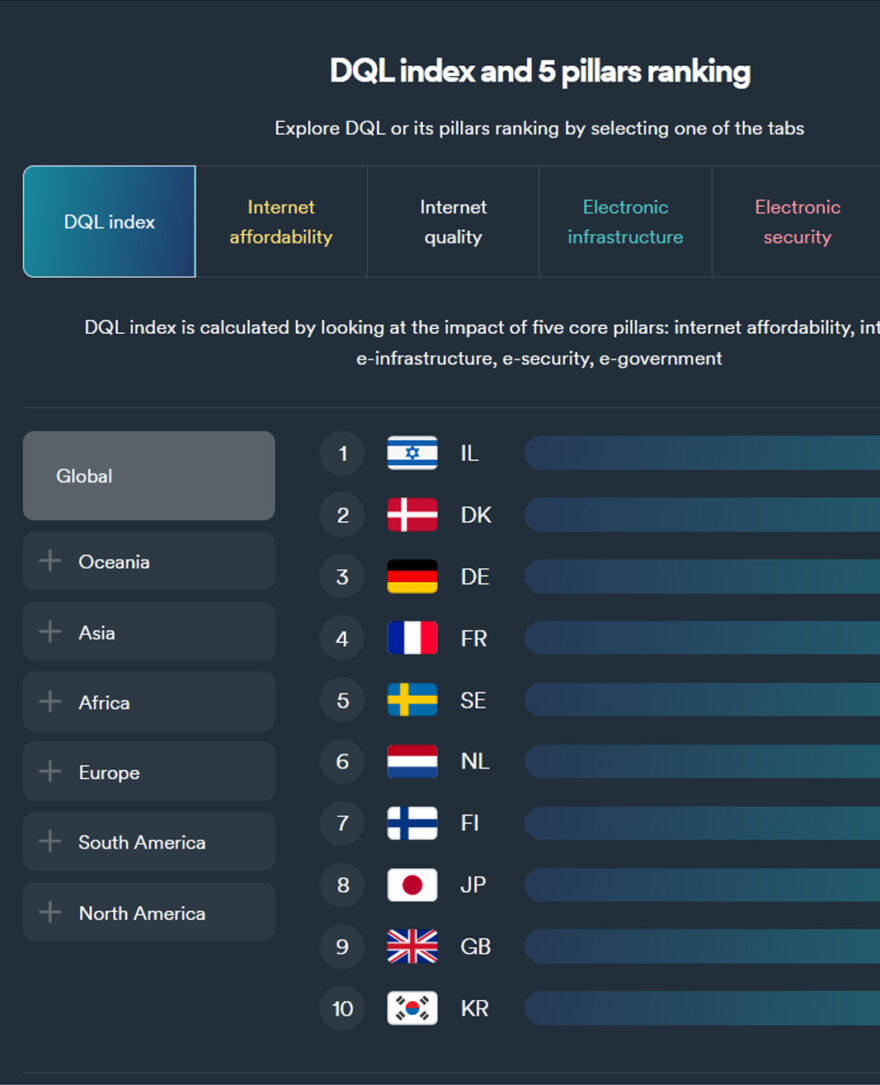 DQL index and 5 pillars ranking DQL index is calculated by looking at the impact of five core pillars: internet affordability, internet quality, e-infrastructure, e-security, e-government Source: https://surfshark.com/dql2022-tool/index.html 5 Metrics for Measuring Digital WellbeingThe DQL Index covers 117 countries with readily available data, making up 92% of the global population. Each country is scored on five pillars:
Visualizing The World’s Digital Quality of LifeOverall, Europe and Asia led the digital quality of life rankings in 2022. Israel took the top spot with an incredibly strong score in internet affordability. Here are the countries sorted by rankings and their weighted scores in each category:
Overall, 15 of the top 20 highest-scoring countries were located in Europe, including #2 Denmark and #3 Germany, reflecting the region’s strong scores in electronic infrastructure and security.
In addition to Israel, the Asia region was represented at the top by #8 Japan, #10 South Korea, and #15 Singapore. The only non-Asian and non-European country to make the top 20 was the United States at #12.
GDP’s Impact on Digital InfrastructureOf the 117 countries that had data available for the index, the majority of the lowest-ranking countries were in Africa or Asia. This includes the bottom five: Cameroon, Mozambique, Ethiopia, Yemen, and DR Congo.
In fact, when the DQL Index was charted against GDP per capita, a clear and unsurprising trend emerges: As countries have to grapple with limited resources and capital for increasing their digital wellbeing, we can see different priorities emerge. For example. many countries scored poorly on internet affordability and electronic government while prioritizing investments in internet quality and electronic infrastructure.
And despite the proliferation of mobile phones across the world, more countries were able to set up stable broadband internet over mobile internet.
To find out more interesting insights, dive in to the full Digital Quality of Life Index |
|||||||||||||||||||||||||||||||||||||||||||||||||||||||||||||||||||||||||||||||||||||||||||||||||||||||||||||||||||||||||||||||||||||||||||||||||||||||||||||||||||||||||||||||||||||||||||||||||||||||||||||||||||||||||||||||||||||||||||||||||||||||||||||||||||||||||||||||||||||||||||||||||||||||||||||||||||||||||||||||||||||||||||||||||||||||||||||||||||||||||||||||||||||||||||||||||||||||||||||||||||||||||||||||||||||||||||||||||||||||||||||||||||||||||||||||||||||||||||||||||||||||||||||||||||||||||||||||||||||||||||||||||||||||||||||||||||||||||||||||||||||||||||||||||||||||||||||||||||||||||||||||||||||||||||||||||||||||||||||||||||||||||||||||||||||||||||||||||||||||||||||||||||||||||||||||||||||||||||||||||||||||||||||||||||||||||||||||||||||||||||||||||||||||||||||||||||||||||||||||||||||||||||||||||||||||||||

Eastern Horizon: Israel and India’s Unrealized Strategic AllianceYeshaya Rosenman https://en.hashiloach.org.il/india-and-israel-a-crucial-alliance/
The new geopolitical landscape following the October 7th terror attacks has highlighted a crucial yet largely unrecognized alliance between Israel and India. Increased Indian interest in the Jewish state should serve as a signal for Israel to broaden its diplomatic focus beyond its traditional allies in the West.Never before Oct 8. had Israel been flooded with so many Indian reporters. Of the few thousand foreign journalists who rushed to Israel to cover the war, over a hundred arrived from India, including many of the most famous faces of Indian media.
I received multiple offers for reporting positions, and I chose Republic TV, India’s most viewed and most right-wing TV network. When I traveled to the residence of President Yitzhak Herzog to request an interview with our anchor in Delhi, they informed me that they were not intentionally ignoring my channel’s previous requests, but were simply swamped by inquiries from no fewer than 37 Indian outlets, each claiming it was the biggest in India.
Even more unusual than the sheer magnitude of Indian-focused coverage is the fact that Indian media was staunchly supportive of Israel. Excepting Communist-oriented media (such as the prestigious magazine ‘Frontline’)[1] and most Muslim-Indian reporters, Indian media was so enthusiastic in their support for Israel that Qatari-owned outlets began calling them out for “Zionism” and “Islamophobia”.[2]
Israelis may take for granted the strength of Israel-India relations and the warm welcome they receive in India, but merely a few decades ago our relationship was completely different.
From the Indian Independence Movement to Diplomatic Relations with IsraelFull diplomatic relations between India and Israel were only established in 1992 following the Madrid Conference, on the heels of over forty years of hostility. Since the inception of the Indian Independence movement, its leaders – from both the Indian National Congress and the All-India Muslim League – were hostile towards Zionism (though not Jews) for a variety of reasons.[3]
Muslim leaders of the Indian independence movement such as Muhammad Ali Jinnah, who later demanded Pakistan as a state for Muslims, found themselves in the paradoxical stance of demanding the partition of India but not of Palestine. Mahatma Gandhi did not understand why Jews were coming to Arab Palestine in the first place. Both India and Pakistan voted “No” to the establishment of Israel.
Jawaharlal Nehru, who followed Gandhi as India’s first Prime Minister, was a product of Cambridge education and a Socialist by conviction. He harbored idealistic, perhaps even unrealistic, views on foreign policy that shaped India’s direction from 1947 until the 1990s. Nehru’s vision included leading non-aligned nations in the post-colonial and Third World landscape, fostering a sense of fraternity with Asian countries like China and Russia, and harboring a strong aversion to American dominance and capitalist ideals. He also shared a close bond with Gamal Abdel Nasser, the secular Socialist leader and President of Egypt.
The only exception was V.D. Savarkar, godfather of Hindu Nationalism, the political creed of PM Modi and the BJP party. Savakar wrote an open letter congratulating Israel upon its founding.
It is the backdrop of the long-standing Nehruvian legacy that makes the current Israel-India relations so surprising. Indian Economy and Political PowerBeyond mere friendship however, India is also accruing a newfound importance, to Israel and globally. From a country famous for masses living in abject poverty and neglect, hostile to USA and its allies, and with leaders famous for populism and corruption, India is finally being regarded as the rising global power it had always envisioned itself.
The initial economic liberalization that saved India from bankruptcy in 1992 has now led India to represent – as of 2022 – 7.2% of the global economy, with the 5th largest nominal GDP.
Pro-American sentiment is on the rise, even as Indian Minister of External Affairs, S. Jaishankar, plots a course in foreign affairs that is asserting Indian independence from Western dictates. The greatest trophy for this independent Indian foreign policy would be a permanent seat on the UN Security Council. Although it would force India to take stances rather than remain silently “non-aligned,” it would further the narrative of India as master of its own destiny.
The Indian government is at ideological loggerheads with both Western progressives regarding nationalism and Islam, and with American Evangelicals over the proselytization of Hindus. But beyond the snarky moralizing exemplified in Western media, Indian officials enjoy ever-growing collaboration with the highest levels of Western governments.
Aside from the goal of containing China, the primary reason for this red-carpet-treatment is the influence of India’s most valuable export: Indian brainpower. India exports enormous numbers of its best, brightest, and most ambitious citizens, who have become leaders in the fields of STEM and management, including the current CEOs of illustrious tech brands such as Google, Microsoft, Adobe, and Palo Alto Networks. Indians and Israelis are the two most dominant minorities in Silicon Valley, and usually cultivate excellent work relationships, a sentiment echoed by former PM Naftali Bennet when speaking about his years as a high-tech CEO in the U.S.
Decades of elite immigration have led the 5-million-strong Indian-American community to supersede the Jews as the richest and most educated minority in the U.S. Yet a newer phenomenon is the Indian diaspora’s rising political power. Two Indian-originating Americans, Nikki Haley and Vivek Ramaswamy, are now contending for the Republican presidential nomination. Democratic Vice President, Kamala Harris, is half-Indian. There are five Indian Americans in Congress, ranging from radical ‘Squad’ member, Pramila Jayapal, to Shri Tenadar, who has founded a ‘Hindu Caucus.’ Rishi Sunak, PM of the UK, is a proud Hindu, as is former Home Secretary, Priti Patel, both Conservatives. Leo Vardakar is the PM of Ireland. Indians also lead countries in the Indies and South America such as Trinidad and Tobago, and Suriname.
In the U.S., Indian-American advocacy organizations, such as the Hindu American Foundation (HAF), are collaborating with Jewish advocacy organizations like AJC and the Simon Wiesenthal Center, and are even candidly adopting their methods; For example, modeling the definition of “Hinduphobia” along the contours of the IHRA definition for antisemitism.[4] As a conspicuous minority of non-white, non-Christian overachievers, Hindus have become targets of hate-crimes, and many Hindus, such as HAF leadership, are staunchly pro-Israel, as they are keenly aware that most of the anti-Hindu and and-Israel hatred originates from the same sources, with near-identical motivations.
Israel-India Conservative AllianceWe now begin to understand the common interests of India and Israel. Some such interests are shared by Jewish and Hindu diasporas, and some are unique to their respective motherlands.
Both share the existential threat of the global Red-Green Alliance of Progressives and Islamists. Many Hindus in the U.S. and UK were horrified by the post Oct. 7 pro-Hamas rallies and the dramatic spike seen in antisemitic attacks. Given a chance, these same mobs will come for the Hindus, as has already been the case in the UK.[5]
This opens up the possibility of a global conservative counter-alliance, although some obvious difficulties would have to be overcome: Israeli conservatives publish primarily in Hebrew and are largely unknown in the Anglosphere. And like most Westerners, they are unfamiliar with modern India and its discourse.
Hindu conservatives (“Nationalists” is their preferred term) don’t get along with Evangelicals, and for all their deep admiration of Israel, they are generally unaware of the basics of Jewish and Israeli history and heritage. If a long-standing bridge is to be built, deeper foundations must promptly be laid.
However, the recent wartime TV appearances of conservatives such as Douglas Murray are leading to a growing awareness and appreciation of Western conservatives, with whom Indians have had only a love-hate relationship since colonial times. And never before have so many Israeli experts and dignitaries appeared en masse on Indian screens.
Israel, India, and IslamOne major building block for further unity is the fact that Israel and India both share the common threat of Islamic terrorism, albeit from different terrorists and countries. India is already the Israeli defense industries’ largest client, and it will take years more for India to fully modernize its defense forces. According to foreign sources, it was an emergency shipment of Israeli precise armaments that allowed India to triumph over Pakistan in the Kargil War of 1999. This was the watershed moment in India-Israel relations, long before the rise of PM Modi, in 2014.
The primary Islamic threat to India is from Pakistan, in which wild incitement against India is inculcated in public schools, madrassas, mosques, and media. The Pakistani military recruits terrorists to organizations such as Lashkar-e Taiba (LeT) for its cross-border attacks on Indian Kashmir, hidden behind a thin veil of plausible deniability. LeT was also responsible for the 26/11/2008 attacks on Mumbai, which killed 166 people, including four Israelis and two other Jews. Recently, Israel finalized its designation of LeT as a terrorist organization, and is lobbying for Hamas to be recognized as such by India.
Indian Muslims number an estimated 200 million, roughly 15% of the 1.4 billion Indians. The majority are not radical, except for known enclaves in places such as Kerala, West Bengal, Hyderabad, and Kashmir.
However, the Oct. 28 televised speech of Hamas leader, Khaled Mashaal, to a Jamaat-I Islami (India’s Muslim Brotherhood) rally was an alarming development. The rally was part of a campaign titled “Uproot Hindutva and Apartheid Zionism.” Hindutva, the ideology of Hindu Nationalists – here just a code word for Hindus – was equated with Zionism by Muslim Brotherhood leaders in a candid attempt to export Hamas ideology and methods to India. BJP leadership responded with outrage, but Kerala is governed by the Communist Party of India (CPI), who align with Islamists, and it is unclear just how the central government will deal with these clear threats.
Yet on a deeper level, here too, critical infrastructure is lacking: Although India has defense research and Pakistan experts, shockingly, for a country that will soon have the largest Muslim population in the world, it has almost no experts on Islam or the Middle East. This is due to both the Marxist-Communist orientation of Indian humanities faculties that dictated the downplaying of all religions, and to the weakness in foreign language instruction. Here, Israeli scholars can play a role and collaborate with various institutions, especially with the young up-and-coming right-wing Indian intelligentsia, who are mainly STEM graduates who transitioned to humanities, and who have yet to fully find their intellectual voice.
Israel has few experts of South Asian Islam, no leading experts on South Asian Islamic terrorism, and almost no Urdu speakers. The Israeli intelligence community invests little effort in this part of the world, which is traditionally seen as lacking influence on Israel. I believe this assumption is incorrect.
Israel, India, and the Global OrderThe most tangible, immediate dividends in Israel-India relations have been aptly demonstrated by recent geopolitical realignments.
The history of the subcontinent is inextricably intertwined with that of the nearby Arabian Peninsula, even more so since the rise of Arab Petro-economies. In the UAE, South Asians (2.8 million Indians, 1.29 million Pakistanis, and 0.75 million Bangladeshis) number around half of the population, filling every position, from bellboys to billionaire CEOs. The UAE is India’s 3rd largest trading partner. Saudi Arabia (KSA) is itself home to 2.12 million Bangladeshis, 1.88 million Indians, and 1.81 million Pakistanis.
Cold War politics placed India in the non-aligned, de facto pro-Soviet camp. Pakistan aligned with the USA, as did the KSA and UAE, who both needed American military protection, and, as Salafi fundamentalists, espoused a visceral hatred of the “Godless Communists.”
Following the Cold War’s thaw, India moved ever closer to the West and its competitive economies, while Pakistan never recovered from the Islamic extremism, violence, and economic damage inflicted by Gen. Zia Ul-Haq’s Islamic reforms of 1978, and subsequent support for terrorism as a state tool. Gulf countries therefore increasingly courted India, while sending only nominal humanitarian aid to Pakistan. Subsequently, India-Israel relations hit a glass ceiling: India would not part ways with the rich Gulf states and had to maintain a delicate balancing act.
This changed dramatically with the Abraham Accords. Suddenly, India did not have to choose sides. On the contrary: if the UAE was warming up to Israel – and it was obvious the KSA had given a green light – India could join the party.
This logic engendered the mini-lateral alliance of I2U2 (Israel, India, UAE, USA). Israel would bring tech and defense capabilities, India would supply skilled and menial labor, UAE would bring finance, and the USA would defend the alliance diplomatically and with its fleets. While the alliance remained amorphic, business boomed, as did defense and intelligence ties.
Since the Arab spring of 2011, the UAE had become hostile to radical Islam, wiping out the local branch of the Muslim Brotherhood (Al Islah) by 2014.[6] As India legally integrated Kashmir in 2019, the UAE’s response to Pakistani outcries was granting the Medal of the Order of Prince Zaid to PM Modi. Kashmir apparently did not constitute an Islamic cause.
By the time the Abraham Accords were signed in 2020, the UAE had developed a vision of inter-religious tolerance, which resonates deeply with India.[7] The rise of Mohammad Bin Salman (MBS) and his vision for the KSA hold a similar promise,[8] though yet to be fully implemented. These developments led to various interfaith initiatives. Currently, both countries align with Israel and India in their battle against radical Islam.
G-20, IMEC, and Oct. 7The showcase initiative announced at the Delhi G-20 Summit in September was the India-Middle East-Europe Corridor (IMEC). IMEC is a proposed route for Indian goods to Europe that would cut transit times by 60%. Goods would transit from India’s northwestern ports to the Jebel Ali port in the UAE, and from there to the Indian-owned port of Haifa via freight trains running through the UAE, KSA, Jordan and Israel, and finally from the Haifa port to Greece. New energy pipelines and communications lines would be laid as well.[9]
This was India’s first successful counter to Chinese encirclement, and posed a strong blow to Pakistan, further alienating it from the KSA and the UAE and cementing its status as a Chinese client.
Although G-20 delegates were careful not to mention it, it was clear that the corridor proposal carried with it implications of KSA normalizing relations with Israel. Messages of normalization were delivered in Western media months before the summit.
This was the working logic of the Abraham Accords in Israeli foreign policy: More Muslim nations were destined to join in, and KSA was to be the biggest catch. KSA is the leader of the Sunni world, and other Sunni states couldn’t be more Catholic than the pope and would immediately follow suit. Shortly before the Oct 7. attacks, Foreign Minister Eli Cohen spoke of 6 other Muslim states that would normalize relations after KSA. The Palestinian veto on the Islamic world’s normalization with Israel seemed over at last.
Then came the Oct. 7 attacks. Muslim masses rallied emotionally behind Gaza, against Israel. The current Muslim popular sentiment is extremely anti-Israel, and some commentators have pronounced IMEC dead on arrival.
While IMEC and Israel-KSA normalization may have been delayed, I firmly believe they will materialize. Too many powerful parties are too deeply invested for it to fail.
In summary, IMEC represents staggering economic interests for all the involved parties, as well as the continuation of geopolitical realignments that began years ago – India realigning with the West and Israel, joined by a KSA and UAE inimical to radical Islam.
In this arena, China (which de-facto supports Hamas) is an anti-Western force that must be countered, as is the Progressive wing of President Biden’s Democratic Party, which has rallied so shockingly for Hamas. If Israel-KSA normalization has been postponed, it may well happen under a Republican president.
EpilogueI agree with our ambassador in Delhi, Naor Gilon, who stated that Indian love for Israel is “something I cannot fully explain.”[10] While the straightforward explanation posits the fascination of Hindu Nationalists with Israel as a paradigm of a high-functioning Religious-Nationalist state (contrary to secularist accusations of them creating “a Hindu Pakistan”), there does seem to be a deeper metaphysical connection, akin to our relationship with Evangelicals who view Jews as objects of veneration.
As Evangelical support is suffering a dramatic decline amongst young Americans[11], one could only hope that Indian Nationalists fill the void, maybe even in the UN Security Council. Although lacking the Biblical backdrop, and any in-depth knowledge of Israel, this newfound and unrealized strategic partnership must be fostered carefully. Israel must invest swift efforts to build a steady, direct, and mutual flow of information and expertise with India, unhindered by third parties such as the New York Times or the Guardian, who have become a steady source of hostile disinformation about both Israel and India. It is my hope that the recent peak of Indian interest in Israel may be leveraged to great effect in future times of peace.
[1] OpIndia, ‘Found your choice of interviewee sickening’: Israel’s Ambassador to India Naor Gilon slams ‘The Hindu’ for interviewing Hamas’s Mousa Abu Marzouk’, 10.31.23 [2] The New Arab, Dana Hourany, ‘Why India is leading the pro-Israel disinformation campaign online’ 10.24.23 https://www.newarab.com/analysis/why-india-leading-pro-israel-disinformation-campaign?amp [3] For a full overview of the stances of the founders of India on Zionism see: Shimon Lev (Hebrew) שמעון לב, נהירין לנו שבילין דהודו (גמא, 2018) [4] For a magisterial overview of Hindu-Jewish advocacy partnerships by a writer who opposes both Hindu Nationalism and Zionism see: Jewish Currents, Aparna Gopalan, The Hindu Nationalists using the Pro-Israel Playbook, 28.6.23 https://jewishcurrents.org/the-hindu-nationalists-using-the-pro-israel-playbook [5] The Indian Express, Vamsee Juluri, Anti-Israel sentiment on American campuses is a warning for Hindus, 11.1.23 https://indianexpress.com/article/opinion/columns/anti-israel-sentiment-on-american-campuses-is-a-warning-for-hindus-9007846/ [6] Guido Steinberg, Regional Power UAE: Abu Dhabi is no longer Saudi Arabia’s Junior Partner, German Institute for International and Security Affairs (SWP) July 2020, Berlin, pp.12, 16 https://www.swp-berlin.org/publications/products/research_papers/2020RP10_UAE_RegionalPower.pdf [7] See: The New Mandala, Greg Fealy, Selective moderation: Indonesia–UAE religious diplomacy, 17.4.23 and the embedded links inside https://www.newmandala.org/selective-moderation-indonesia-uae/ [8] It has been pointed out that the ambitious ‘Vision 2030’ and other official documents have deliberately written the Wahabi legacy out of Saudi history and society See: ‘Vision 2030’ https://www.vision2030.gov.sa/en/ [9] Jerusalem Post, Yeshaya Rosenman, What are the Key Takeaways from the G-20 Summit in New Delhi? 12.9.23 https://www.jpost.com/international/article-758642 [10] In an interview to ABP’s Nayanima Basu, 18.10.23 https://www.youtube.com/watch?v=-IR1QEDtct4 [11] Times of Israel, Jacob Magid, Support for Israel among young US evangelical Christians drops sharply — survey. 25.5.21 https://www.timesofisrael.com/support-for-israel-among-young-us-evangelicals-drops-sharply-survey/ |
|||||||||||||||||||||||||||||||||||||||||||||||||||||||||||||||||||||||||||||||||||||||||||||||||||||||||||||||||||||||||||||||||||||||||||||||||||||||||||||||||||||||||||||||||||||||||||||||||||||||||||||||||||||||||||||||||||||||||||||||||||||||||||||||||||||||||||||||||||||||||||||||||||||||||||||||||||||||||||||||||||||||||||||||||||||||||||||||||||||||||||||||||||||||||||||||||||||||||||||||||||||||||||||||||||||||||||||||||||||||||||||||||||||||||||||||||||||||||||||||||||||||||||||||||||||||||||||||||||||||||||||||||||||||||||||||||||||||||||||||||||||||||||||||||||||||||||||||||||||||||||||||||||||||||||||||||||||||||||||||||||||||||||||||||||||||||||||||||||||||||||||||||||||||||||||||||||||||||||||||||||||||||||||||||||||||||||||||||||||||||||||||||||||||||||||||||||||||||||||||||||||||||||||||||||||||||||

Amid the Noise and Hate, Israel is happy
Gallup’s 2022 World Happiness Report proves that while Israel is thriving, its enemies are among the world’s most miserable.(JNS / Bnai Brith) Israel, home to 53% of world Jewry, is a happy place. Yet you wouldn’t know it if you believed the headlines about Prime Minister Benjamin Netanyahu’s new government or saw the latest anti-Israel resolution at the United Nations and the current wave of Jew-hatred propagated by American celebrities.
After all, between the International Court of Justice, Whoopi Goldberg, Kyrie Irving and Kanye West, antisemitism appears to be off to a good start in 2023.
Yet in the antisemitic worst of times, there are aspects of Israel that represent the best of times. The Startup Nation continues to innovate and flourish. The Abraham Accords continue to deliver positive security and global trade rewards. Israeli companies continue to make a massive impact on the quest to alleviate humanitarian disasters around the world.
Moreover, in the face of a tsunami of traditional and social media hatred, Israel is one of the happiest places in the world. It’s true. Last March, the Gallup Organization released its 2022 World Happiness Report, and the survey showed Israel improving its ranking from number 12 to number 9.
The survey, which is based on GDP per capita, social support, healthy life expectancy and freedom to make life choices, assessed 146 nations. The countries ahead of Israel were Finland, Denmark, Iceland, Switzerland, the Netherlands, Luxembourg, Sweden and Norway. Israel was ranked ahead of New Zealand, Austria, Ireland, Australia, Germany, Canada, the United States and the United Kingdom.
Countries that signed normalization agreements with Israel as part of the Abraham Accords were also ranked in the top 25: Bahrain was at 21 and the United Arab Emirates at 24.
In contrast, the country that daily threatens Israel’s existence, Iran, was ranked 110. Iraq was 107 and Lebanon 145. The “Palestinian Territories,” by the way, were at 122.
In other words, no matter how much cacophony is heard in the Knesset, Israeli society is strikingly happy. Most people familiar with Israel understand that cacophony is a byproduct of a free, diverse society. After all, the Knesset has always been the home to shouting, arm waving and theatrical chaos.
Israel recently exercised its voice by electing Netanyahu in an election universally acknowledged to have been free and fair. Yet the media around the world, including in Israel, will continue to push the narrative of corruption, even as they seldom examine corruption in Palestinian society.
They will call Jewish settlements illegal, even when they’re not—unless you believe the sovereign state of Israel is illegal—but never challenge the illegality of Palestinian settlements or the usefulness of the so-called “refugee camps.”
The media will ratchet up the cries of “apartheid” and “occupation” to full volume. They will endlessly refer to Judea and Samaria as the “occupied West Bank,” even though they didn’t consider it “occupied” while it was occupied by Jordan from 1948-1967.
The world needs a strong dose of context. At a time when the world faces increasing antisemitism, Jews nonetheless understand that they have faced much worse over more than 3,500 years of history. What we are experiencing, of course, doesn’t make us happy. We would be happier if the media didn’t deny or ignore 3,500 years of history. We would be happier if Gen X Jewry and public and civil servants took 3,500 years of Jewish history into consideration. We would be happier without false narratives and revisionism.
But I’m afraid that, unless people become aware of the treacherous past of antisemitism and seek to understand Israel’s importance to Judaism, some forms of the scourge are here to stay.
The least happy countries on the Gallup list are fatigued by Middle Eastern wars. Ironically, they have a good—and happy—model of what could be the future in the form of Israel.
It’s not surprising that relatively few people in the world pay much attention to the Happiness Report or even know about it. Anyone, including Jews, who promote the BDS movement on college campuses or wishes to splinter and split Israel by appeasing the very unhappy Iran may want to learn more about the Jewish homeland and leave their bad karma at home. |
|||||||||||||||||||||||||||||||||||||||||||||||||||||||||||||||||||||||||||||||||||||||||||||||||||||||||||||||||||||||||||||||||||||||||||||||||||||||||||||||||||||||||||||||||||||||||||||||||||||||||||||||||||||||||||||||||||||||||||||||||||||||||||||||||||||||||||||||||||||||||||||||||||||||||||||||||||||||||||||||||||||||||||||||||||||||||||||||||||||||||||||||||||||||||||||||||||||||||||||||||||||||||||||||||||||||||||||||||||||||||||||||||||||||||||||||||||||||||||||||||||||||||||||||||||||||||||||||||||||||||||||||||||||||||||||||||||||||||||||||||||||||||||||||||||||||||||||||||||||||||||||||||||||||||||||||||||||||||||||||||||||||||||||||||||||||||||||||||||||||||||||||||||||||||||||||||||||||||||||||||||||||||||||||||||||||||||||||||||||||||||||||||||||||||||||||||||||||||||||||||||||||||||||||||||||||||||

“The Economist” ranks Israel fourth best performing economy25December2022 9:14 Oren Dori https://en.globes.co.il/en/article-The-Economist-ranks-Israel-fourth-best-performing-economy-1001433653 The UK weekly said that Israel had enjoyed economic success over the past year, despite the political chaos. “The Economist” has ranked Israel as the fourth best performing economy in 2022. “In the Middle East, Israel enjoyed success over the past year, despite the political chaos,” the UK weekly wrote.
The ranking of the 34 OECD countries was based on five macroeconomic indicators: GDP growth, annual inflation, inflation breadth, share prices, and government debt. As “Globes” reported last week Israel’s debt: GDP ratio has fallen from 68% to 60% this year. Although inflation over the past 12 months has risen to 5.3%, this is about half the level of inflation in much of the Western economies, as “The Economist” points out.
“The Economist” ranked Greece in first place as the best performing economy in 2022, after the shock waves that were sent through the economy in the years before the Covid pandemic. Among other things, Greece managed to shrink its debt: GDP ratio by 16% over the past year. In second and third places in the ranking, ahead of Israel in fourth place, were Portugal and Ireland. Israel shared fourth place with Spain.
The world’s biggest economies did not fare so well. The US was ranked 20th with negligible GDP growth of 0.2%, while Germany was ranked 30th with high inflation of 10%. In last place among the 34 OECD countries was Estonia.
The international comparison by “The Economist” shows an advantage in inflation in countries whose energy is not based on Russian gas and oil, such as Israel. Spain, for example, which purchases natural gas from Algeria and uses solar energy, recorded relatively moderate increase of 5.7% in its consumer price index, in the 12 months from October 2021 to September 2022. Latvia, on the other hand, was hit by inflation of 20% over that period due to its reliance on Russian energy.
Published by Globes, Israel business news – en.globes.co.il – on December 25, 2022. © Copyright of Globes Publisher Itonut (1983) Ltd., 2022. 2022’s unlikely economic winnersWhich countries performed best and worst this year?18December2022 | Ibiza https://www.economist.com/finance-and-economics/2022/12/18/2022s-unlikely-economic-winners In financial terms the past year has been bad for almost everyone. Inflation of 10% year-on-year across the rich world has slashed household incomes. Investors have lost out as global stockmarkets have plunged by 20%. Yet this poor aggregate performance hides wide differences: some countries have done pretty well.
To assess these differences, The Economist has compiled data on five economic and financial indicators—gdp, inflation, inflation breadth, stockmarket performance and government debt—for 34 mostly rich countries. We have ranked each economy according to how well it has done on these measures, and created an overall score. The table at the end of this article shows the rankings. It includes some unexpected results.
For the first time in a while, the economic party is happening in the Mediterranean. Top of our list is Greece. Other countries that plumbed the economic depths in the early 2010s, including Portugal and Spain, also score highly. They are not the only pleasant surprises. Despite political chaos, Israel did well. Meanwhile, despite political stability, Germany is an underperformer. Two Baltic countries, Estonia and Latvia, which won plaudits in the 2010s for speedy reforms, come bottom.
GDP, usually the best measure of economic health, is our first indicator. Norway (helped by high oil prices) and Turkey (by a boom in sanctions-busting trade with Russia) have done better than most. The fallout from covid-19 also looms large. Thanks to strict lockdowns and a collapse in tourism, a year ago much of southern Europe was in dire straits, so the region was due a decent year. Visits to the Balearics recently rebounded beyond their pre-pandemic level. As your correspondent discovered on a recent trip to Ibiza, the island is so busy it is difficult to book a taxi or find a spot at a half-decent restaurant.
Ireland probably had a strong year, though one not nearly as strong as gdp numbers suggest. The activities of big multinational companies, many registered there for tax purposes, have for years distorted the figures. By contrast, America’s gdp numbers are misleadingly weak: in recent quarters official statisticians have struggled to account for the impact of enormous stimulus packages.
More granular data fill in the picture. Our second measure is the change in the price level since the end of 2021. Away from the world’s attention, some countries have seen low inflation. In Switzerland consumer prices have risen by just 3%. The country’s central bank, helped along by a strong currency, responded rapidly to the rise in prices earlier this year. Countries which have non-Russian energy sources—such as Spain, which gets much of its gas from Algeria—have also done better than average. Those reliant on Vladimir Putin for fuel have truly suffered. In Latvia average consumer prices have risen by a fifth.
Our third measure also relates to inflation. It calculates the share of items in each country’s inflation basket where prices have risen by more than 2% in the past year. This provides an indication of how entrenched inflation is—and therefore hints at how quickly inflation will fall over the coming year. Some countries that suffer from high headline inflation have nonetheless been able to limit its breadth. In Italy, for instance, average consumer prices have risen by 11% this year, yet “only” two-thirds of its inflation basket has above-target inflation. Japanese inflation also looks like it may fade away. Britain is in more trouble. The price of every category in its basket is rising fast.
People’s sense of economic well-being does not just come from prices in the shops. They also look at the value of their pension pots and stock portfolios. In some countries it has been a terrible year for these sorts of investments. Share prices in both Germany and South Korea are down by nearly a fifth in 2022, double America’s decline. Swedish stocks have done even worse. Yet there are a few spots of strength. Norway’s stockmarket is up on the year. So is Britain’s, which is populated by the sort of dull, plodding companies that tend to be rewarded when economic times are tough. A fall in the value of the pound has also increased the value of foreign sales.
Our final measure concerns the change in net government debt as a share of gdp. In the short run ministers are able to paper over economic cracks by increasing spending or cutting taxes. However this can create more debt and thus the need to turn the fiscal screws in the future. Some governments have spent extravagantly to cope with the cost-of-living squeeze. Germany has allocated funds worth about 7% of gdp to help with sky-high energy costs, meaning its debt-to-gdp ratio has risen. Other countries have pulled back from the splurge, helping to right the fiscal ship. Assisted by high inflation, public debt in southern European countries seems to be on the way down.
Will the gap between 2022’s winners and losers persist in 2023? Before long southern Europe’s economic growth, weighed down by rapidly ageing populations and high debts, will surely fall back to the region’s usual less-than-stellar levels. And there are hopeful signs that in countries such as America and Britain high inflation may finally be easing, which would help them up the rankings.
Along other dimensions, differences are likely to persist, not least when it comes to those countries reliant on Mr Putin for their energy supplies. Against the odds, many managed to replenish their stores of natural gas before winter set in—but only by paying outrageous prices. With supplies now largely cut off, the coming year will be a lot more difficult. That will be a big concern in the Baltics, but less so on the other side of Europe. It is hard to worry about gas supplies while eating a giant plate of squid on an Ibicencan beach. ■ |
|||||||||||||||||||||||||||||||||||||||||||||||||||||||||||||||||||||||||||||||||||||||||||||||||||||||||||||||||||||||||||||||||||||||||||||||||||||||||||||||||||||||||||||||||||||||||||||||||||||||||||||||||||||||||||||||||||||||||||||||||||||||||||||||||||||||||||||||||||||||||||||||||||||||||||||||||||||||||||||||||||||||||||||||||||||||||||||||||||||||||||||||||||||||||||||||||||||||||||||||||||||||||||||||||||||||||||||||||||||||||||||||||||||||||||||||||||||||||||||||||||||||||||||||||||||||||||||||||||||||||||||||||||||||||||||||||||||||||||||||||||||||||||||||||||||||||||||||||||||||||||||||||||||||||||||||||||||||||||||||||||||||||||||||||||||||||||||||||||||||||||||||||||||||||||||||||||||||||||||||||||||||||||||||||||||||||||||||||||||||||||||||||||||||||||||||||||||||||||||||||||||||||||||||||||||||||||

Israel’s economic growth in defiance of grave oddsThe volume and density of innovation has made Israel a mandatory destination for all leading investors. Op–ed.Amb. (ret.) Yoram Ettinger 2August2023, 5:01 PM (GMT+3) http://www.israelnationalnews.com/news/375021 Ambassador (ret.) Yoram Ettinger is author of “Second Thoughts: a US-Israel Initiative”, his website is The Ettinger Report.
According to a July 17, 2023 Bloomberg report, a leading global investment bank, the NYC-based Jefferies Financial Group, Inc., “expects further growth in Israel’s tech sector despite political unrest over government plans to overhaul the judiciary….
“While there are considerable uncertainties, we anticipate Israel’s tech ecosystem growth and maturation will only accelerate, creating a dominant and necessary opportunity for investors…. The report expressed confidence that Israel’s tech industry will remain globally attractive….
“The volume and density of innovation has made Israel a mandatory destination for all leading investors and will likely create a disproportionate number of category-defining winners across sectors in the many years to come….”
Irrespective of the political turmoil associated with the judiciary controversy, the latest data indicates persistent growth of Israel’s high-tech sector, in particular, and Israel’s economy, in general.
According to Israel’s Central Bureau of Statistics, as presented on July 27, 2023 by a senior Israeli economist, Shlomo Maoz:
Notwithstanding the dramatic decline in foreign investment in Israel’s high-tech sector, Israel’s high-tech export increased by 6.9% during the first 5 months of 2023, while domestic consumption of Israel’s high-tech products and services decreased by 0.2% during the same period.
The recent depreciation of the New IsraeliShekel (compared with the US dollar) has benefitted Israel’s exports.
Industrial production of the high-tech sector expanded during the first five months of 2023 by 5.6% more than the first five months of 2022, as reflected by the 3% growth in the number of high-tech workers during the first five month of 2023, and the 3.6% rise in the number of working hours during the first five months of 2023.
Israel’s defense export has surged due to the impact of the Russia-Ukraine war upon the demand for advanced Israeli military systems; the substantial increase of Germany’s defense budget, and Sweden’s and Finland’s decision to join NATO. In addition, there is the rising Chinese threat to India and the Pacific Ocean countries; and the sustained regional and global threat of Sunni (e.g., Moslem Brotherhood) and Shiite Islamic terrorism (Iran’s Ayatollahs).
Israel is expected to double its natural gas production to 40 billion cubic meters during the next few years, in response to the growing demand by Europe for alternative sources of natural gas, as it seeks to reduce reliance on Russian energy. As a result, there has been growing interest by international energy companies to invest in Israel’s gas exploration. For example, Chevron Corp. and Israel’s NewMed Energy and Ratio Energies – the partners in the Israeli offshore gas project, Leviathan – are investing $568mn to build a 3rd pipeline.
Unemployment has declined to 3.5% (3% among women). In fact, a shortage of manpower is reported by hundreds of contractors and subcontractors, especially in export and defense-driven companies.
Israel’s GDP grew by 3.2% during the first quarter of 2023, compared to 3.1% during the previous quarter, while industrial investment grew by 16.2% following a 4.8% decline during the last quarter of 2022.
|
|||||||||||||||||||||||||||||||||||||||||||||||||||||||||||||||||||||||||||||||||||||||||||||||||||||||||||||||||||||||||||||||||||||||||||||||||||||||||||||||||||||||||||||||||||||||||||||||||||||||||||||||||||||||||||||||||||||||||||||||||||||||||||||||||||||||||||||||||||||||||||||||||||||||||||||||||||||||||||||||||||||||||||||||||||||||||||||||||||||||||||||||||||||||||||||||||||||||||||||||||||||||||||||||||||||||||||||||||||||||||||||||||||||||||||||||||||||||||||||||||||||||||||||||||||||||||||||||||||||||||||||||||||||||||||||||||||||||||||||||||||||||||||||||||||||||||||||||||||||||||||||||||||||||||||||||||||||||||||||||||||||||||||||||||||||||||||||||||||||||||||||||||||||||||||||||||||||||||||||||||||||||||||||||||||||||||||||||||||||||||||||||||||||||||||||||||||||||||||||||||||||||||||||||||||||||||||

SOMETHING BIG IS HAPPENING: New Gas Deal With Europe Turns Israel Into A Super Powerwritten by David Mark, March 14, 2023
Prime Minister Netanyahu travelled to both German and Italy this past week to ink a new gas deal with $5 billion euros annually. Benjamin and Sara Netanyahu arrive in Rome.More than the money, the deal is set to reset Israel-European relations by forcing Europe to reduce their overt support for “palestinian” NGOs and reexamining votes in the UN.
“You’re going to fall off your chair,” reporter Yossi Baum tweeted Monday night and continued: “It looks like the prophet’s vision of the end of times, but these are the facts: Israel is becoming a superpower. Our tiny country is becoming an extremely dominant and significant player vis-à-vis Europe, in a way that completely changes the rules of the game in the Middle East, including vis-à-vis the Palestinian Authority. This is unbelievable!”
Besides the gas deal, Netanyahu inked a $3 billion arms sale to Germany. Strategic Effect On RussiaThere is an unspoken strategic consequence of the gas deal. The deal will begin to cut Russia’s influence over Europe by changing Europe’s dependency on gas away from Gazprom in Russia, to Israel. The Europeans may hate the Jewish State, but if it’s a choice between Jewish Israel and Putin’s Russia, they rather deal with Israel. Even if they have to ultimately jettison the arabs in Judea and Samaria to get the gas they need.
With battle lines drawn between the West and the new axis powers of Russia, Iran, and China, Israel is quickly finding that is having to make some hard choices. Europe has been against the Jewish State for some time, but at the end neither Europe or Israel have little choice but to work together.
With Israel in the driver’s seat, its little surprise that Bibi seems unfazed by the leftist color revolution brewing in Israel. After all, while it appears that the State Department might be openly antagonistic to the State of Israel, Europe is changing its tune. This leaves America more and more isolated when it comes to Mideast policy. End of Days?Much of what we are witnessing in our generation is eluded in the Bible. It says in the Torah: “God shall enlarge Yapheth, and he shall dwell in the tents of Shem; and Canaan shall be his servant.”
It is understood that Europe is the descendent of Yapheth, one of the three son’s of Noach, while the people of Israel are descended from Shem.
Beyond the gas deal, Netanyahu has asked Italy to recognize Jerusalem as the eternal and ancestral capital of the Jewish people.
As the Maharal of Prague says in Ner Mitzvah: “And therefore the fourth empire is called “חזיר”- “Pig”, for “שתחזור” it will “Return” the Kingship to Yisrael, which is to say considering the aspect of the emptiness to which the fourth empire is attached, it will usher in the experience of the Kingship of Yisrael.”
Rome which became the Western world is analogous to the fourth animal sharing both kosher and non kosher signs – the Pig. Recognizing the Jerusalem as Jewish would be the reversal of the fourth and final exile, which Rome initiated nearly 2,000 years ago by exiling the Jewish people from Jerusalem and renaming it.
Netanyahu’s trip has far reaching consequences beyond economics – it appears the gears of biblical prophecy are moving ever closer to the grand finale written in the Bible thousands of years ago. |
|||||||||||||||||||||||||||||||||||||||||||||||||||||||||||||||||||||||||||||||||||||||||||||||||||||||||||||||||||||||||||||||||||||||||||||||||||||||||||||||||||||||||||||||||||||||||||||||||||||||||||||||||||||||||||||||||||||||||||||||||||||||||||||||||||||||||||||||||||||||||||||||||||||||||||||||||||||||||||||||||||||||||||||||||||||||||||||||||||||||||||||||||||||||||||||||||||||||||||||||||||||||||||||||||||||||||||||||||||||||||||||||||||||||||||||||||||||||||||||||||||||||||||||||||||||||||||||||||||||||||||||||||||||||||||||||||||||||||||||||||||||||||||||||||||||||||||||||||||||||||||||||||||||||||||||||||||||||||||||||||||||||||||||||||||||||||||||||||||||||||||||||||||||||||||||||||||||||||||||||||||||||||||||||||||||||||||||||||||||||||||||||||||||||||||||||||||||||||||||||||||||||||||||||||||||||||||

Israel’s Negev Desert Technology Will Change Our World05January2023 https://www.israpundit.org/israels-negev-desert-technology-will-change-our-world/ Israel’s Negev Desert Technology Will Change Our WorldPosted 2November2022 TBN Israel “Israel’s Negev Desert Technology Will Change Our World | FULL EPISODE | Insights on TBN Israel” On this episode of Insights: Israel & the Middle East, host Mati Shoshani discovers the miraculous story of turning Israel’s desert into a world of innovation and technology. This video was brought to you by TBN Networks®. |
|||||||||||||||||||||||||||||||||||||||||||||||||||||||||||||||||||||||||||||||||||||||||||||||||||||||||||||||||||||||||||||||||||||||||||||||||||||||||||||||||||||||||||||||||||||||||||||||||||||||||||||||||||||||||||||||||||||||||||||||||||||||||||||||||||||||||||||||||||||||||||||||||||||||||||||||||||||||||||||||||||||||||||||||||||||||||||||||||||||||||||||||||||||||||||||||||||||||||||||||||||||||||||||||||||||||||||||||||||||||||||||||||||||||||||||||||||||||||||||||||||||||||||||||||||||||||||||||||||||||||||||||||||||||||||||||||||||||||||||||||||||||||||||||||||||||||||||||||||||||||||||||||||||||||||||||||||||||||||||||||||||||||||||||||||||||||||||||||||||||||||||||||||||||||||||||||||||||||||||||||||||||||||||||||||||||||||||||||||||||||||||||||||||||||||||||||||||||||||||||||||||||||||||||||||||||||||

VERY GOOD NEWS ISRAELBy Michael Ordman, VGNI Already in 2023 we see Israel building for a better future. And it promises to be a healthier future for everyone, with Israeli treatments for cancer, migraine, essential tremor, burns, and dental implants – all having made major advances in the past week. Israelis are also building up the skills of medics in Ethiopia. It’s good to see Israel building up its diplomatic relations with Turkiye (Turkey) and Azerbaijan, building new business opportunities with Gulf states, and building cultural ties with Mexico and Serbia. On the technology front, Israeli startups are building quantum computers; new facilities to convert waste into hydrogen and bio-plastics; new sustainable products, and a “green” cover for one of Israel’s busy highways. ISRAEL’S MEDICAL ACHIEVEMENTS Israelis live longer. Israelis have the world’s 10th highest life expectancy, according to the Worldometer’s Life Expectancy of the World Population – a project by NiceR that helps Americans access affordable prescription medications. The average Israeli life expectancy is 83.5 (82 for men and 85 for women). In 2020 it was 82.6 Reprogramming the immune system of cancer patients. Scientists at Jerusalem’s Hadassah hospital and Bar-Ilan University have developed HBI0101- a CAR-T therapy for multiple myeloma and amyloidosis, benefiting over 90% of patients in trials. Los Angeles-based Immix BioPharma will commercialize HBI0101. Implants heal 3 times faster. Israel’s Magdent (see here previously) has received CE approval for its Miniaturized Electromagnetic Device (MED) that has been clinically proven to shorten the healing process after dental implants by up to 3 times. The device is being sold in Israel and the EU. FDA approval is being sought. Relieving migraines in the US. (TY OurCrowd) 2,500+ US physicians have prescribed the Nerivio migraine relief device from Israel’s Theranica, benefiting some 35,000 Americans with its neuromodulation technology. From both sides now. Essential tremor usually affects hands and arms on both sides of the body – one side more than the other. Israel’s Insightec (see here previously) has now received FDA approval to treat the second side of the brains of patients in the US a minimum of nine months after treatment of the first side. New way to cure pulmonary embolisms. Doctors at Jerusalem’s Hadassah hospital removed a blood clot in an Israeli’s lung (pulmonary embolism) using, for the first time in Israel, a US-developed FlowTriever. It sucked out some of the patient’s blood, cleaned it of the clot and replaced it. No blood thinners, no invasive surgery. 4th child for ex-cancer patient. (TY UWI) Thanks to the Fertility Preservation Center at Sheba Medical Center, Ayelet, 35, gave birth to her fourth child, following years of aggressive cancer treatment for Hodgkin lymphoma. She is the first woman in the world to give birth to 4 children through cryopreservation of her eggs. US approval for burns treatment. Israel’s Mediwound has received FDA approval for its NexoBrid pineapple plant-based burn treatment (see here previously) to be sold in the US to treat thermal burns. The US already has emergency stockpiles. NexoBrid is now approved for use in 44 countries, including the EU, Japan, and India. More approvals on the way. This article identifies three more Israeli companies that are expected to receive FDA approval for treatments in 2023. They are Gamida Cell (Omidubicel / NiCord – bone marrow transplants); Protalix (PRX-102 – Fabry disease); and BioLineRX (BL-8040 / Motixafortide – multiple myeloma). Lower cost of prescription medicines. The maximum prices for dispensed medicines in Israel are to fall by an average of nearly 7.5%. Israel’s prescription prices are based on the lowest that the medicines cost in Europe on Jan 1st. Israelis then only pay 15% of that price – the remainder being paid by Israel’s health companies. Training medics in Ethiopia. A team from Magen David (MDA) and three Israeli hospitals are currently in Addis Ababa, Ethiopia training doctors and nurses in the treatment of trauma. In a separate mission, Professor Hanoch Kashtan and his Assuta Ashdod team have been training surgeons and nurses, in northern Ethiopia. 1.3 million calls to MDA. During 2022 Magen David Adom EMTs and paramedics attended over 1.3 million emergencies from nearly 200 stations. The call centers received on average one call every 10.8 seconds. MDA’s 31,600 staff include nearly 14,600 youth volunteers. https://www. ISRAEL IS INCLUSIVE AND GLOBAL Ella is a True Israeli Trailblazer. (TY UWI) An update of the career of Major Ella Waweya (see here previously) – the first Muslim Arab woman to publicly become a major in the IDF. The details of how she joined the IDF are especially interesting. https://www.jns.org/the- Turkish President presents award to Israeli professor. In a unique ceremony, Turkish President Recep Tayyip Erdogan presented the Turkish Academy of Sciences’ honorary commendation to Hebrew University Professor Amnon Cohen for his extensive research into the Land of Israel under Ottoman rule. Azerbaijan appoints its first ambassador to Israel. Deputy Minister of Science and Education Mukhtar Mammadov has reportedly been appointed as the country’s first ambassador to the Jewish State. He previously supervised projects with Israel. The news of was praised by George Deek, Israeli ambassador to Azerbaijan. Saving the ocean from plastic. Arik Rosenblum of Israeli NGO EcoOcean (see here previously) promotes the vital message to the whole world that, “To save the sea is to save us”. Plastic waste going into our food via fish is causing cancer. It is also killing vital marine creatures – like the sponge that may be a cure for Alzheimer’. Bird migration is in full swing. (TY Kay) I sent this website link to readers in September when the KKL-JNF cameras at Israel’s Hula Lake were set up. Now the bird migration through Israel is at its peak, you can use this link to view the amazing live scenes as some 500 million feathered visitors rest their wings in the Jewish State. Iranian invasion. It is good news. A flock of 200 flamingos from Iran arrived at Israel’s Hula Lake during their November migration. However, they seem to be happy here and don’t appear to be continuing their journey to Africa. KKL-JNF’s Inbar Shlomit Rubin says, “I just hope they won’t be accused of being spies!” SCIENCE & TECHNOLOGY Eros C-3 launched. (TY UWI) Israel’s ImageSat (see here previously) successfully launched its EROS-C3 observation satellite into space from a SpaceX Falcon 9 rocket at Vandenberg Space Force Base in California. Built by Israel Aerospace Industries, the EROS-C3 is one of the world’s most advanced observation satellites. TAU-SAT3 launched. Another SpaceX rocket launched Tel Aviv University’s SAT3 nanosatellite from Cape Canaveral. It will communicate with a groundbreaking optical ground station that can reconstruct any lost data in real-time using smart signal processing algorithms developed at TAU. Increasing natural gas extraction. (TY Atid-EDI) US energy giant Chevron is building a third pipeline to increase the gas extracted from Israel’s Tamar natural gas field. The aim is to take 1.6 billion cubic feet of gas per day – up from the present 1.1 billion, enabling Israel to export more gas to Egypt and supply other countries. Israel’s quantum consortium. Israel’s Innovation Authority is investing NIS 115 million over 3 years to create the largest consortium in its history. IAI’s Elta Systems, Quantum Art, Classiq, Qedma, and Rafael will develop some of the most advanced quantum computing processor technologies and software. Award for hydrogen harvester. Israeli-Swedish-Polish startup Boson Energy (see here previously) was ranked first in the hydrogen production track in the Tech Tour Sustainability22 Flagship Program in Essen, Germany. Tech Tour’s European network connects investors, entrepreneurs, and corporate partners. Bioplastic and more from food waste. (TY I24 News) Israel’s TripleW (see here previously) is now in full production on an industrial scale at its new facility in Belgium. It is converting massive amounts of food waste into biodegradable plastic plus biogas for energy production. Watch the video for more details. Healthy processed foods. Teams from Israel’s Technion Institute competed in the “Foods Solutions” event in Brussels, funded by the European Institute of Innovation and Technology. One Technion team won gold, with their nutritious, freeze-dried, instant vegan omelet. Another won silver with a chickpea, lentil, & cashew snack. Don’t forget to drink. (TY Hazel) Israel’s Impacx (previously water.io) has developed a smart water bottle that illuminates and vibrates to encourage people to stay hydrated. Impacx also makes smart medicine boxes that remind people to take pills, auto-replenishing them and generating valuable medical data. Green light for Begin Highway cover. Jerusalem has approved a NIS 1.5+ billion plan to cover the Begin Highway. The highway cover will include a 14.25-acre park with pedestrian access but no vehicles. It will create over 50 acres of new land for thousands of homes, office space and hotel rooms. Cybersecurity startup is cool. Israel’s accSenSe has been named a “Cool Vendor” in Gartner’s Identity-First Security category. Gartner Cool Vendors are chosen if they have innovative and transformative products, services or initiatives. accSenSe enables customers a fast recovery after a major security breach. ECONOMY & BUSINESS Israel’s resilient economy. Excellent short article by Prof. Micheal Humphries of the Jerusalem College of Technology and Touro College Israel. He gives six key reasons why (except for 2020 – Covid), Israel has had positive economic growth every year since 2003, including during the 2008-9 Great Recession. Unemployment falls to 4.1%. Israel’s rate of unemployment fell in November to 4.1% from 4.3% in October. The fall was mainly due to the rise in workforce participation to 60.6% (60.3% Oct). Tourist numbers surge. Over 2.6 million foreign tourists visited Israel in 2022, compared to 397,000 in 2021 and 831,000 in 2020, during the Covid-19 pandemic. Israel opened its borders to tourists in Mar 2022 and all restrictions were dropped in May. Israelis enjoyed a record 20 million overnight local hotel stays in 2022. Abraham Accords transforms businesses. This article describes the work of the UAE-IL Tech Zone which focuses on building bridges between the two regions through tech. The group boasts more than 2,000 members. Also, the DANA Accelerator in Abu Dhabi, where women aim to solve major challenges in the Gulf. Preventing financial crime in the UAE. Dubai-based NOW Money is to use the AI anti-money laundering (AML) platform from Israel’s ThetaRay to help prevent financial crimes on its payments systems. ThetaRay’s SONAR cloud-based AML solution will monitor cross-border payments processed by NOW Money. Good news disguised as bad. This negatively headlined article on Israel in 2022 is mostly comprised of good news. Productivity increasing; hi-tech booming; unemployment decreasing; job vacancies increasing; education results improving; life expectancy rising. Can’t these journalists lighten up a bit? Powering up the US. (TY Israel21c) Israel’s Zooz Power (see here previously) has signed an agreement with US-based Blink Charging for the marketing, distribution, sale, and deployment of the ZOOZTER-100 electric vehicle (EV) charging system in the United States. Zooz also just installed its first charging systems in Israel. Shufersal to open SPAR stores in Israel. Israel’s largest supermarket chain Shufersal is to invest tens of millions of shekels to open at least ten SPAR stores in Israel, as well as sell SPAR products in Shufersal stores. The lower prices of SPAR products are expected to help reduce Israel’s cost of living. See here previously. Germany’s first fully automated supermarket. (TY Atid-EDI) The new REWE Pick&Go store in central Munich is Germany’s first-ever 100% autonomous store, thanks to Israel’s Trigo (see here previously). El Al to buy its 17th Dreamliner. Israel’s El Al airline is soon to take delivery of two more Boeing 787 Dreamliners. Its 16th will be the 787-8 it ordered prior to the Covid-19 pandemic. It will also buy a 787-9 originally ordered by another Boeing customer who no longer requires it. Boeing will adapt it for El Al. Exits, takeovers and mergers. Israel’s Matrix has acquired Israel’s Zebra Technologies for approximately $18.5 million. US-based RMS has acquired Israeli fraud detection startup OrboGraph for over $100 million. CULTURE, ENTERTAINMENT & SPORT` Ofra Haza is one of the best singers ever. (TY IsraPundit & UWI) Israel’s Ofra Haza, who passed away in 2000, was named by Rolling Stone Magazine as one of the best 200 singers of all time. It called her “The Madonna of the Middle East.” (But not “Israeli”) The Youtube is her rendition of “Yerushalayim Shel Zahav”. Ravel, Berlioz, Bizet. On Jan 11 the Jerusalem Symphony Orchestra promises a wonderful evening with conductor Yves Abel and mezzo soprano Rachel Frenkel featuring Le Tombeau de Couperin by Ravel, Les Nuits d’été by Berlioz and Symphony in C by Bizet. Discounted tickets via the Nefesh b’Nefesh website. Jewish women of consequence. A series of free Zoom lectures by Prof. Moshe Rosman of Israel’s Bar-Ilan University, highlighting the lives of four Jewish women who lived in the early modern period (16th-18th centuries). On Jan 8, 15 and 22. Registration required. Things to do in Israel in January. In Israel’s coolest month, Tourist Israel recommends visiting Eilat. January events include the Tel Aviv Power Africa Expo, and the Israman triathlon in Eilat. Puppet show for children in Serbia. Recent celebrations marked 30 years of diplomatic relations between Israel and Serbia. They included a performance at the International Festival of Children’s Theatres in Subotica of the play “Up and Down Story” by the Israeli Koom-Koom Theater. https://en.koomkoom.org/mala- Dancing in Spain and Mexico. Israeli dancers have recently been entertaining audiences in Spain and Mexico. Israeli choreographer Sharon Friedman presented two works in the “Espacio Espiral, in Santander. Meanwhile, Israel’s Kamea dance company toured Mexico to celebrate the 70th anniversary of joint diplomatic relations. Israeli cycling team returns to Tour de France. The Israel – Premier Tech (IPT) cycling team has been selected to compete again in the Tour de France. IPT was one of only six teams to achieve two Stage wins last year. IPT owner Sylvan Adams said that his team was looking forward to even more success at this year’s race. Judoka gold in Jerusalem. (TY Nevet) Israeli judoka Baruch Shmailov won the 66kg men’s gold medal at the Judo Masters tournament in Jerusalem, defeating French contestant Daikii Bouba in the finals. The tournament is the 3rd most important competition in judo, after the Olympics and the World Judo Championships. THE JEWISH STATE The first new Israelis of 2023. (TY TPS) Liel and Sergey of Rehovot celebrated the birth of their third son just after midnight on Jan 1st at the Shamir Medical Center (Assaf HaRofeh) near Tel Aviv. And see the second article for other babies born on the first day of 2023 – a microcosm of Israel’s population. Surge in demand for Masa journeys. Hundreds of Jews aged 18 to 30 from the former Soviet Union have joined Masa Israel Journey’s two-to-12-month study, service, and career development programs. The demand for pre-Aliyah programs was so great it had to be funded by a $3 million donation matched by the government. Jerusalem builds. (TY Sharon) One day all the construction projects in and around Jerusalem will be completed. Sacher Park, the Jerusalem Gateway, the Light Rail extension. New projects include Sultan’s Pool and the Pool of Siloam excavation. Sharon even made a video of the final construction of the new Government. |
|||||||||||||||||||||||||||||||||||||||||||||||||||||||||||||||||||||||||||||||||||||||||||||||||||||||||||||||||||||||||||||||||||||||||||||||||||||||||||||||||||||||||||||||||||||||||||||||||||||||||||||||||||||||||||||||||||||||||||||||||||||||||||||||||||||||||||||||||||||||||||||||||||||||||||||||||||||||||||||||||||||||||||||||||||||||||||||||||||||||||||||||||||||||||||||||||||||||||||||||||||||||||||||||||||||||||||||||||||||||||||||||||||||||||||||||||||||||||||||||||||||||||||||||||||||||||||||||||||||||||||||||||||||||||||||||||||||||||||||||||||||||||||||||||||||||||||||||||||||||||||||||||||||||||||||||||||||||||||||||||||||||||||||||||||||||||||||||||||||||||||||||||||||||||||||||||||||||||||||||||||||||||||||||||||||||||||||||||||||||||||||||||||||||||||||||||||||||||||||||||||||||||||||||||||||||||||
 
Transportation
The main forms of public transportation are busses and the national train service both offering a convenient, reasonably priced means of travel to nearly every destination in the country.
Train Information Services: www.rail.co.il / Telephone: 08-6831222 or *5770
Busses Information Services: www.bus.co.il / Telephone: 1-900-72-1111
Tickets can be purchased at the ticket booths in the central bus station in each city or town, or from the driver. Most of the bus lines do not run on Shabbat or on Jewish holidays. Service ends on Friday afternoon and resumes Saturday evening.
Students are entitled to discounts on intercity bus lines. To receive a discount they must present an international student card when purchasing tickets.
Smart ride apps
The Station provides users with best options across bus, train, and more, using real-time data, taking into account schedules and the latest changes.
In order to use the app, set up an account and submit your fare type, if eligible.
For tourists or debit card holders, the app calculates the best price for your journeys at the end of each day. Domestic Flights Israel is a small country, and for this reason, it is only worthwhile to consider flying between Eilat and Tel Aviv. Several companies operate flights from Eilat to Ben Gurion Airport, or Sde Dov in north Tel Aviv. Airfares are reasonable, but are higher than bus fares.
There are also private companies that operate special flights from anywhere in the country upon request.
Renting a Car
Most international car rental companies and local companies have offices in the large cities and at Ben Gurion Airport. It is recommended to reserve a car in advance from abroad.
To rent a car in Israel the driver must be over 24 years of age, and must hold a valid international driver’s license and an international credit card.
Israel has an extensive road system and clear signage in most places (in Hebrew, English, and Arabic). Driving in Israel The minimum driving age in Israel is 17 and the driving side of the road is the right. Speed limits are 30 to 50km/h in cities, 80-90 on freeways, 130 on highways and Route no.6. Safety belts are obligatory, and if you’re enjoying a night on the town, keep in mind there is a zero tolerance policy for drinking and driving so find a designated driver and enjoy safely. Highway 6 Highway 6 operates as an electronic toll road with no barriers at entrances or exits and no traffic lights which allows for uninterrupted trips. Advanced computerized information systems installed along the highway include electronic tollgates, identify vehicles, categorize types of fees (subscription or unregistered) and calculate the number of highway sections each vehicle travels. Every trip is automatically tabulated and invoiced. Drivers enjoy a rich, convenient, and safe traveling experience with a speed limit of 130 kilometers per hour.
Tourists renting a car will be charged via their credit card. Please inquire with the rental company the conditions and tariffs.
Most Rent a Car companies do not offer insurance for the areas in the West Bank under the control of the Palestinian Authority. Tourists wishing to drive with rented cars into the areas of the Palestinian Authority are recommended to secure appropriate insurance.
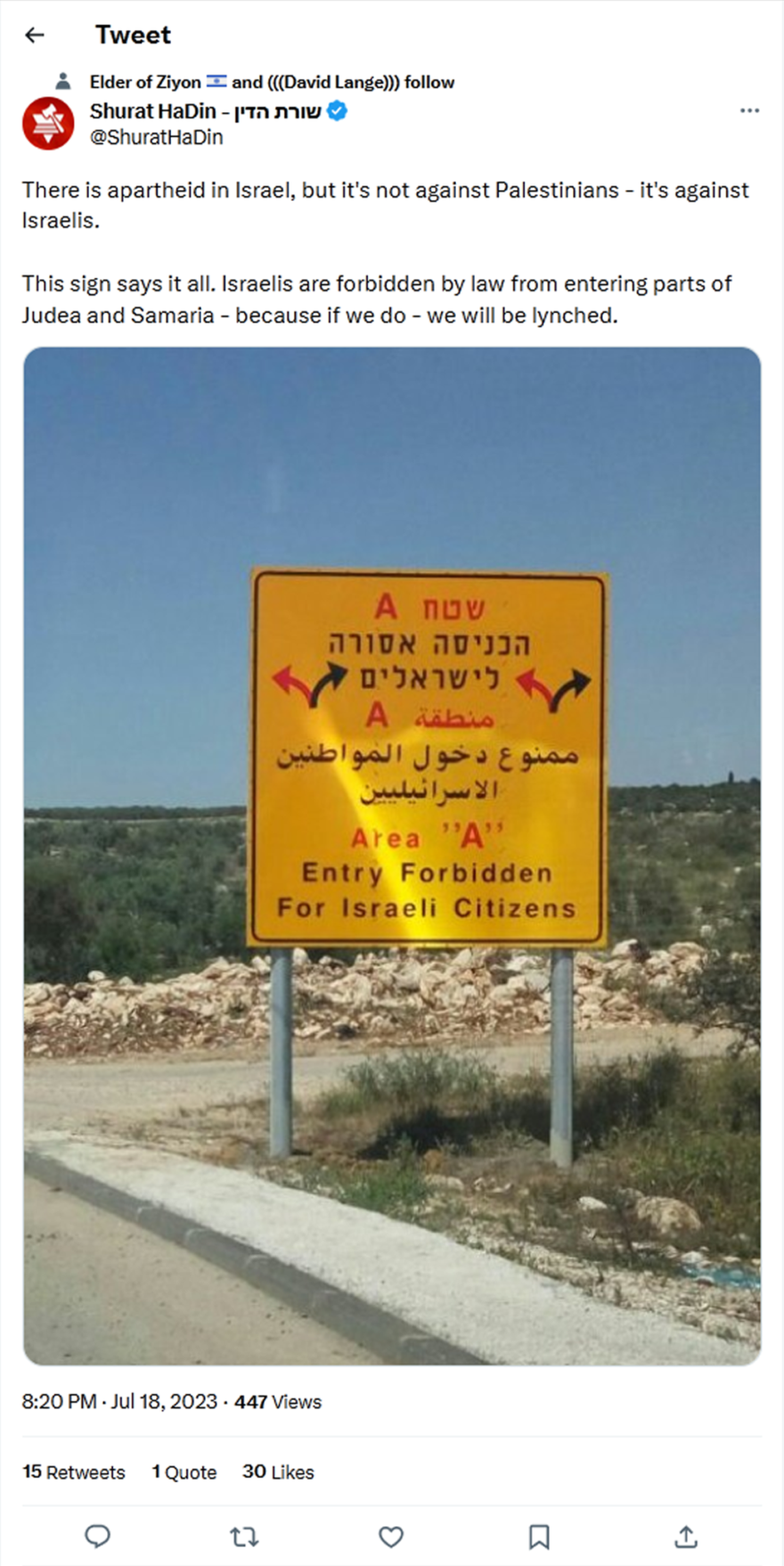 Shurat HaDin-tweet-18July2023-Israelis are forbidden by law from entering parts of Judea and Samaria
JerusalemCats Comments: THIS IS REAL! DO NOT ENTER!!! THIS IS NOT A JOKE!! |
|||||||||||||||||||||||||||||||||||||||||||||||||||||||||||||||||||||||||||||||||||||||||||||||||||||||||||||||||||||||||||||||||||||||||||||||||||||||||||||||||||||||||||||||||||||||||||||||||||||||||||||||||||||||||||||||||||||||||||||||||||||||||||||||||||||||||||||||||||||||||||||||||||||||||||||||||||||||||||||||||||||||||||||||||||||||||||||||||||||||||||||||||||||||||||||||||||||||||||||||||||||||||||||||||||||||||||||||||||||||||||||||||||||||||||||||||||||||||||||||||||||||||||||||||||||||||||||||||||||||||||||||||||||||||||||||||||||||||||||||||||||||||||||||||||||||||||||||||||||||||||||||||||||||||||||||||||||||||||||||||||||||||||||||||||||||||||||||||||||||||||||||||||||||||||||||||||||||||||||||||||||||||||||||||||||||||||||||||||||||||||||||||||||||||||||||||||||||||||||||||||||||||||||||||||||||||||

Jerusalem Light Railhttps://www.itraveljerusalem.com/ent/jerusalem-light-rail/ The Jerusalem Light Rail (Harakevet Hakala) stretches from Pisgat Ze’ev in the North (Heil Ha’avir Station) to Mount Herzl in the West, with many stops along the way. Plan your tripThe tram’s arrival time is continuously updated on the electronic boards at the stations. Know the right time for you! Use the “plan your journey” option on the rail’s official website to stay updated with the schedule. Light Rail – Important Tips
General information about tickets and pricing >> The law of ticket validation >> MapClick here to view the station map  By Maximilian Dörrbecker (Chumwa) – 2012-08-19OpenStreetMap data for the background, CC BY-SA 2.0, https://commons.wikimedia.org/w/index.php?curid=20740571 Planned New Lines: Jerusalem Light Rail MapThe Jerusalem LRT Networkhttps://jlrt.org.il/
Rav KavRav-Kav (Hebrew: רב-קו, lit. “multi-line”) is a reusable contactless stored value smart card for making electronic payments as a joint fare collection system for the different public transportation operators across Israel. Rav-Kav can be used in public transportation such as all bus companies, light rail trains including Jerusalem Light Rail, as well as the national railway in Israel. The Rav- Kav (multi-line) card is an electronic magnetic reloadable smart card that can be purchased at the Central Bus Station. Though you can still buy single tickets printed on a piece of paper, the Rav Kav card is intended to replace all public transportation tickets and cards. Discount packages, such as the monthly pass ‘hofshi hodshi’ or multiple ticket “cartisiya’ are only valid when loaded onto the card. The card can be charged with up to eight different payment packages that you can use within Jerusalem and around Israel.
There are two types of Rav Kav cards: personal, which include all passenger personal information, and anonymous. An anonymous card can be purchased from an Egged bus driver and charged with single fare tickets or regular multi-ride tickets but it will not be insured and will not allow for discounts. Passengers who apply for the personal card need to produce the application form along with a picture or ID card and in the case of students and senior citizens, need to present appropriate documents.
Upon issuing, the Rav Kav can be recharged on board from a bus driver quickly and easily. You can also recharge at ticket booths at light rail stops. Light rail passengers need to make sure that they have credit on their Rav Kav cards before embarking as they are unable to do so on the train.
ParkingFor drivers who wish to use the light rail, there are park and ride facilities near Mount Herzl, with a multi-storey car park and a first line terminal on its roof at the street level of Herzl Boulevard, and a parking lot next to the Ammunition Hill stop. History and PlansThe Light Rail began operating at the end of 2011, after ten years in the making and a great deal of disruption to business and life in the city center. The Jerusalem Chords Bridge near the Central Bus Station was built especially for the light rail, and is now a major landmark. There are plans to extend the line to Neve Yaacov in the North and to Hadassah Hospital Ein Kerem in the West. Contact DetailsPhone: *2779 Operating hours: Sunday–Thursday: 7:00–20:00 |
|||||||||||||||||||||||||||||||||||||||||||||||||||||||||||||||||||||||||||||||||||||||||||||||||||||||||||||||||||||||||||||||||||||||||||||||||||||||||||||||||||||||||||||||||||||||||||||||||||||||||||||||||||||||||||||||||||||||||||||||||||||||||||||||||||||||||||||||||||||||||||||||||||||||||||||||||||||||||||||||||||||||||||||||||||||||||||||||||||||||||||||||||||||||||||||||||||||||||||||||||||||||||||||||||||||||||||||||||||||||||||||||||||||||||||||||||||||||||||||||||||||||||||||||||||||||||||||||||||||||||||||||||||||||||||||||||||||||||||||||||||||||||||||||||||||||||||||||||||||||||||||||||||||||||||||||||||||||||||||||||||||||||||||||||||||||||||||||||||||||||||||||||||||||||||||||||||||||||||||||||||||||||||||||||||||||||||||||||||||||||||||||||||||||||||||||||||||||||||||||||||||||||||||||||||||||||||
Traveling By Train – Israel Railways — Lines and Stations, Payment Optionsרַכֶּבֶת יִשְׂרָאֵל, Rakevet Yisra’el-Israel Railwayshttps://www.rail.co.il/en/Pages/default.aspx History and Heritagehttps://www.rail.co.il/en/about/pages/history-and-heritage.aspx Israel Railways invites you to get to know the history of the Railway from the Ottoman period and British Mandate right through to the establishment of the State of Israel, and the investment in the development of the railways and trains in Israel until today.
The development of Israel Railways is inextricably linked with the story of the State of Israel, and we are proud to have taken part in the development of the State, through establishing connections between cities and settlements across the country, by connecting people, and by creating diverse social and economic opportunities. The history of Israel RailwaysThe roots of the Railway in the Land of Israel were planted within the vision of Moses Montefiore as a way of encouraging Jewish settlement in the middle of the 19th century. However, in fact, the first railway between Jaffa and Jerusalem was inaugurated only at the end of the century.
During the Ottoman Government and the British Mandate, many railway lines were established, including the line between Syria and Haifa through the Jezreel Valley. During this period, the Railway was used as the main transportation artery, which encouraged the Zionist settlement and the development of industry in the country. But at the same time, the Railway suffered from many attacks and dealt with frequent and extreme changes in the scopes of transportation, mainly due to circumstances beyond its control.
The establishment of the State of Israel saw the founding of Israel Railways, which began rehabilitation of the destroyed system and recruitment of new employees, in conjunction with the establishment of new lines and replacement of outdated equipment. This momentum ceased in the Sixties, but at the end of the Eighties government investment in passenger trains was renewed. Since then, the Railway is growing at an unprecedented rate and is again advancing settlement and the development of the country. The Railway during the Ottoman period1892 – The inauguration of the first railway line in the Land of IsraelThe first railway line is built from Jaffa to Jerusalem by a French company, initiated by Joseph Navon from Jerusalem. The line is constructed within a winding route and a narrow rail, of one meter gauge. This line was the only public line in the country ever built by private initiative and funds. 1906 – Completion of the line from Haifa to SyriaThe line from Haifa to Syria, whose rail gauge was narrow as well, is built by the Ottoman Government as an extension of the Hijaz Railway in Trans-Jordan, and from which extensions stretched to Acre and Samaria. In time, this line gains the nickname of “the Valley Train”. The Railway during the First World War1915 – The Hijaz Turkish Railway reaches Be’er ShevaThe Hijaz Railway is also connected to the Jerusalem Line, whose tracks had been slightly extended. During the war, its extensions also reach Hadera, the outskirts of the Sinai and Gaza. Although this railway line is built to a high specification, it cannot bear the advance of the Turkish Army in its battles against the British in Egypt. 1916-1919 – The establishment of the British Military rail from El Kantara to HaifaThe military railway is built upon the standard British gauge of 143.5 cm, in order to connect to the Egyptian network and enable larger scopes of transportation. The British Army is careful not to move forward faster than the pace of its establishment, aiming to ensure regular supply to his soldiers. Extensions are also built from Rafah to Be’er Sheva and from Lod to Jerusalem, along the original route, whose tracks had again been extended.
The Railway during the British Mandate period1920 – The establishment of the Mandatory Railway, “Palestine (the Land of Israel) Railways”The Mandatory Railway is responsible for two different railway networks – the narrow Hijaz Rail of the Valley, with extensions to Acre and Samaria (and Trans-Jordan as well) and the standard railway, whose main lines were the Haifa- El Kantara Line and the Jaffa – Jerusalem Line. 1936-1939 – The Arab Revolt in Palestine (the Events of 1936-39)During the period of the great Arab Revolt, the Railway experiences repeated attacks, while investing vast resources in security and repairing damage, with the support of the British Army and Jewish Guards. 1939-1945 – The Second World WarDuring the second World War, the Land of Israel is located at the core of the British activity in the Middle East, and the Railway triples in size thanks to assistance of personnel and equipment from the British Army. The main Line between Haifa and El Kantara is upgraded in order to increase its capacity. 1942 – Completion of the Military Line of Haifa-Beirut-TripoliThe military line is established upon standard gauge tracks, based on the Haifa-Acre extension of the Hijaz Railway, whose purpose is to support British military activity in Lebanon and Syria. Its establishment also includes the quarrying of the tunnels in Rosh Hanikra. At that point, it is possible to travel by train from Haifa to Cairo, to Beirut (and from there to Turkey and Iraq), to Damascus and Amman. 1946-1948 – The struggle for the establishment of the StateThe Railway absorbs attacks once again, this time including those carried out by the Jewish Underground: this results in extensive damage to equipment, buildings and infrastructure. At the time of the declaration of independence of the State of Israel, only the railway in the Haifa region remains active. Young Israel Railways1949 – Israel Railways re-inaugurates the line to JerusalemThe reactivation of the line to Jerusalem is made possible due to the exchange of territories made with Jordan, with the intention that the entire railway will remain in the territory of Israel. 1953 – The inauguration of the Coastal RailImmediately after the establishment of the State, the Railway begins the reconstruction of the rail network and the construction of the new lines. The new tracks are intertwined with the existing network at Remez Junction next to Pardes Hanna and at Olamit Junction next to Petach Tikva. In 1954, Tel Aviv Central Station is inaugurated at its southern end, and in 1956, the railway to Be’er Sheva is inaugurated as well. 1959 – The Steam Era comes to an end in Israel RailwaysDiesel locomotives and motor coaches, purchased using funds from foreign assistance and reparations, replace the last steam locomotives. The official farewell film stars Locomotive 70414, and the film’s soundtrack song becomes a hit. 1965 – The inauguration of the line to DimonaUntil the Eighties, investment in the Railway focuses on transporting heavy cargo in the Negev; as a result, transportation of passengers is neglected, leading Israel Railways to a deep low in the state of its outdated infrastructure and equipment. 1967 – the Six Day WarAfter the occupation of the Sinai Peninsula, the Railway quickly utilizes the rail at the Gaza Strip and operates the lines in Sinai, for the purpose of evacuating equipment and transporting supplies to the IDF forces. 1975 – The inauguration of Haifa Bat Galim StationHaifa Bat Galim Station is initially built as part of an integrated transportation center, together with a central bus station. This Station is one of the only two large stations built for more than 30 years. 1988 – The establishment of the Ports and Railways AuthorityThe Ports and Railways Authority is responsible for the renewal of the national investment in the development of the Railway. In 1989 passenger carriages are equipped with air conditioning for the first time and in 1992, the One Hundredth Year of the Railway in the country, the first passenger trains begin service after 20 years! 1993 – The inauguration of Ayalon LineThe Ayalon Line is built as part of the Ayalon Highway Project about 40 years following the beginning of its planning and it soon became the busiest line in the country. During the Nineties, many of the existing lines and stations are upgraded, and the Coast Line between Tel Aviv and Haifa is doubled. 2003 – The establishment of Israel Railways Ltd.The Railway becomes a government company and continues the investment momentum with direct funding from the State. New lines are built to Kfar Saba, Ben Gurion Airport and Modi’in and the line to Jerusalem, which was shut down in 1998 due to its poor condition, is been upgraded and reopened. 2013 – The inauguration of Sderot StationSderot Station is built as part of the Ashkelon-Be’er Sheva Line, with the aim of creating a second route between the Central Region and the Negev, parallel to the opening of the main line to Be’er Sheva, whose extension is completed in 2012. In 2015, the entire line is completed (upon the opening of Ofakim and Netivot Stations). 2016 – The inauguration of the renovated Valley Line65 years after its termination, the renewed Valley Line is inaugurated, connecting Haifa to Beit She’an, along most of the route of the historic Hijaz Rail. The new rail is built next to the historic railway, with particular attention to the preservation of nature and landscape. 2017 – Dedication of the Karmiel lineThe idea of building a railway to the Galilee Mountains had been around since the 1950s. The line planned to extend to Hatzor Haglilit and Kiryat Shmona. 2018 – Launch of the new line to JerusalemIt was Israel Railways’ first electrified line, quickly and directly linking Israel’s two largest cities. The new line includes Israel’s highest and longest railway bridges and longest railway tunnel.
What are we doing today?With the tremendous growth rate of the number of passengers using the train, and the understanding that the railway is the solution to the problem of traffic congestion, we are closing the gaps and working on many projects to expand and develop infrastructure and train lines From Tel Aviv to Jerusalem train cab viewLines and Stationshttps://www.rail.co.il/en/pages/stationsnlines.aspx All the information about train stations, getting there, parking and things to do around the station.Popular DestinationsTravel Payment Optionshttps://www.rail.co.il/en/taarif/pages/travel-arrangements.aspx
For more information: Rav Kav Rav Kav Service standsIf you are not yet 18 years old, you must be accompanied by a parent/guardian with an I.D. with an extract. Traveling By Trainhttps://www.rail.co.il/en/enjoy-the-ride/pages/default.aspx Israel Railways is a government-owned company responsible for transporting passengers and cargo all over the country. Israel Railways goes to great lengths to act safely, accurately, professionally and efficiently, while providing the best possible service to the millions of travelers using the train every month.
At Israel Railways, we know that your time is precious. That’s why we work around the clock expanding the rail network, increasing safety levels, and adopting the latest technologies. As a company at the forefront of the public transportation revolution, we’re working to improve the quality of your journey, so you can sit back and simply enjoy the ride!
Israel Railways from the establishment of the State of Israel until todayIsrael Railways already began operating as an auxiliary unit of the Ministry of Transportation upon the establishment of the State of Israel. In 1988, the operation of Israel Railways was transferred to the Ports and Railways Authority, and in December 1996 the Israeli Government decided to separate it from the Ports and Railways Authority and establish a governmental railway company. In 2003, Israel Railways became an independent government-owned company.
Israel Railways on the fast trackIsrael Railways is the transportation company with the highest growth rate, and the largest company of transportation infrastructure in Israel. Israel Railways has two subsidiaries: The Company for the Development of the Israel Railways Sites Ltd. whose remit includes running the business-commercial development of the land sites of the railway stations; and the Cargo Railways Company Ltd., which is responsible for transportation of cargos by the railway and executing investments and infrastructure development.
5 things you never knew about Israel Railways
The vision and objectives of Israel RailwaysIsrael Railways hires approximately 3,400 employees working nationwide 7 days a week, 365 days a year, to provide our passengers with safe, fast and efficient travel. Here are the goals we’ve set for all employees and managers of the railway:
The customer is always at the center!Israel Railways puts an emphasis on the travel experience and on continuous improvement of the service we provide our passengers. Inter alia, by increasing the frequency of trains, adding stations, expanding and upgrading parking lots and stations, providing training for service providers, making constant improvement in information channels and different projects designed to empower the travel experience and the time spent at stations, such as libraries and pianos at stations. Israel Railways in numbersIn 2015, the annual turnover of Israel Railways totaled NIS 2.3 billion from current operation, and an investment flow of about NIS 1.7 billion from development activity. In 2015 and 2016 the company issued bonds to the amount of about NIS 1 billion per issuance and became a reporting corporation subject to the Securities Regulations regarding transparency and efficiency. |
|||||||||||||||||||||||||||||||||||||||||||||||||||||||||||||||||||||||||||||||||||||||||||||||||||||||||||||||||||||||||||||||||||||||||||||||||||||||||||||||||||||||||||||||||||||||||||||||||||||||||||||||||||||||||||||||||||||||||||||||||||||||||||||||||||||||||||||||||||||||||||||||||||||||||||||||||||||||||||||||||||||||||||||||||||||||||||||||||||||||||||||||||||||||||||||||||||||||||||||||||||||||||||||||||||||||||||||||||||||||||||||||||||||||||||||||||||||||||||||||||||||||||||||||||||||||||||||||||||||||||||||||||||||||||||||||||||||||||||||||||||||||||||||||||||||||||||||||||||||||||||||||||||||||||||||||||||||||||||||||||||||||||||||||||||||||||||||||||||||||||||||||||||||||||||||||||||||||||||||||||||||||||||||||||||||||||||||||||||||||||||||||||||||||||||||||||||||||||||||||||||||||||||||||||||||||||||
The child and the bus: a tale of Israel in 15 seconds16October2022 https://elderofziyon.blogspot.com/2022/10/the-child-and-bus-tale-of-israel-in-15.html#.ZEwfRZhw4y0.twitter  The child and the bus-a tale of Israel in 15 seconds Yaakov Langer-tweet-15October2022-This kid knows how to file his own taxes too This video of a Jewish child, no more than 6, flagging down a bus in Beit Shemesh and getting on by himself is starting to go viral:
Imagine a place where children could, without fear, go out by themselves and take the bus around town.
It sounds utopian, doesn’t it?
And parents outside Israel would naturally flinch at seeing a video like this. So many dangers to worry about – kidnapping, abuse, or worse.
But this is how the world should be.
The reason Israelis can act this way in Jewish neighborhoods is because everyone is family. People aren’t competing with each other – they are all on the same team, the same tribe, and they look out for each other. They have each others’ backs.
And this is what the anti-Israel activists want to destroy.
They don’t give a damn about Palestinian rights – their silence about Palestinians languishing in Lebanon and Syria makes that clear.
The modern antisemites want to take away the Jewish right to live in safety and security. Their enemy is this little kid, his tzitzit openly visible, able to freely travel around his hometown on the local bus without his parents worrying that he’ll make it home safely.
Much of Israel, today, is the utopia that everyone else wants for themselves. And for some of them, their jealousy at Jews successfully building such a utopia is what animates them to want to tear it down.
Don’t believe the lies that they care about justice or international law or, ludicrously, Palestinian “self defense.” What they want is for Jews to return to being a frightened minority who are not safe, not secure, and not free.
They hate this child because he goes against everything they want to believe about Jews. |
|||||||||||||||||||||||||||||||||||||||||||||||||||||||||||||||||||||||||||||||||||||||||||||||||||||||||||||||||||||||||||||||||||||||||||||||||||||||||||||||||||||||||||||||||||||||||||||||||||||||||||||||||||||||||||||||||||||||||||||||||||||||||||||||||||||||||||||||||||||||||||||||||||||||||||||||||||||||||||||||||||||||||||||||||||||||||||||||||||||||||||||||||||||||||||||||||||||||||||||||||||||||||||||||||||||||||||||||||||||||||||||||||||||||||||||||||||||||||||||||||||||||||||||||||||||||||||||||||||||||||||||||||||||||||||||||||||||||||||||||||||||||||||||||||||||||||||||||||||||||||||||||||||||||||||||||||||||||||||||||||||||||||||||||||||||||||||||||||||||||||||||||||||||||||||||||||||||||||||||||||||||||||||||||||||||||||||||||||||||||||||||||||||||||||||||||||||||||||||||||||||||||||||||||||||||||||||




